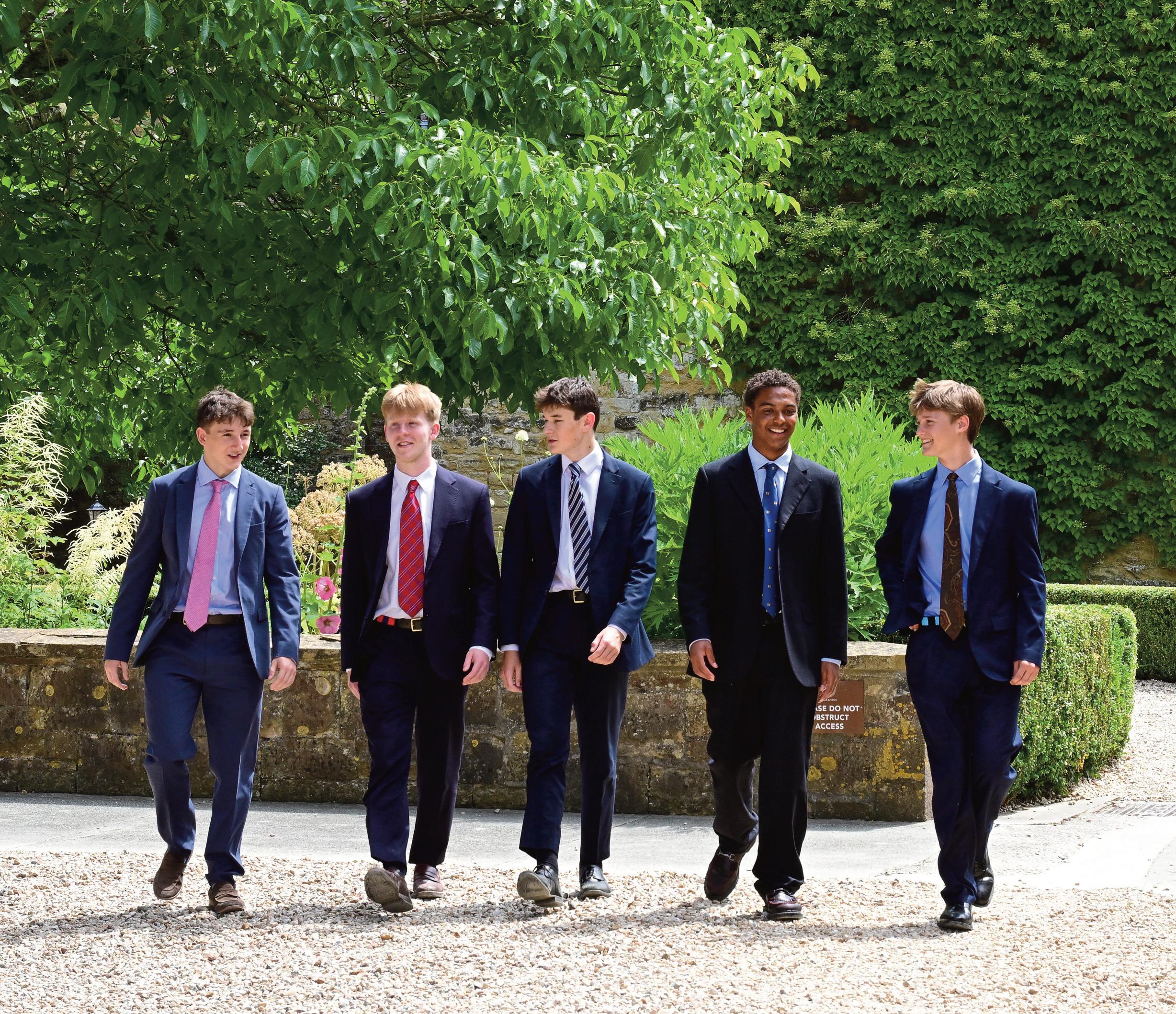

Welcome from the Headmaster
The Sixth Form is a unique and privileged experience. You have the freedom to make your own subject choices and thereby tailor an individualised programme of study that plays to your strengths and interests. In choosing your Sixth Form courses you make decisions that will have a significant bearing upon your future Higher Education and career options and thus the path you embark upon as an adult. Your Sixth Form choices are consequently of great importance and warrant very careful consideration.
Being a member of the Sixth Form at Sherborne is also a very different experience from your previous years at School. You will find that lots of things have changed. For example, although you will have lessons in a smaller number of subjects, the volume of work you will tackle in each of them is much greater, and you will go through it at a much faster pace. You will have more study periods than before, but you will be expected to complete a good deal more work in them. You will need to commit to regular independent study (i.e. work that you have chosen to complete yourself) and you will need to read and research more widely around each of your subjects. You will also have more preparatory work (more Hall). Class sizes are generally smaller, meaning your teachers will be able to give you more individual assistance and guidance. You will also find that your classes have a different dynamic and will often feel more like a university tutorial than a traditional School lesson. The key message is that, although more is expected of you academically, you will be very well supported.
One of the most important characteristics of the Sixth Form is the shift in the balance of responsibility. In the Lower School, boys tend to be given quite prescriptive guidance and their study habits are closely monitored and influenced by subject teachers and House staff. In the Sixth Form, you will have greater control over your own work and will be expected to take more responsibility
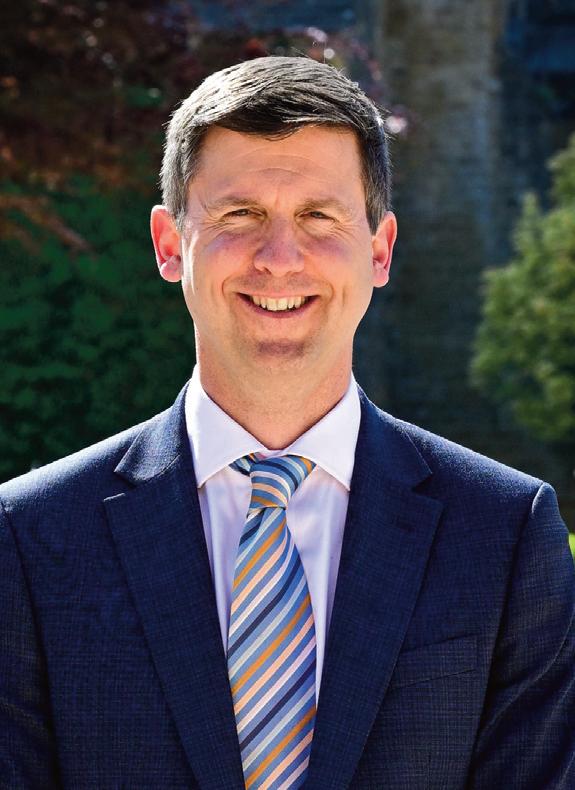
for managing your workload. As boys already in the Sixth Form will tell you, this is an exciting and motivating experience. It is also a privilege that demands responsibility, maturity and self-direction. You will find that boys in the lower years look to you for leadership, you will become a role model in your House and your Housemaster will increasingly expect and rely upon you to set the tone for other boys. With this responsibility comes greater freedom and a very different social programme, including ‘The Stick’ on Saturday nights and plenty of opportunities to mix and make friends, including with pupils from Sherborne Girls.
In essence, your Sixth Form years at Sherborne will see you work harder than ever before, whilst at the same time developing new skills, forging lifelong friendships and having a lot of fun. I know you will enjoy it and I am sure you will derive great fulfilment and success from the next two years.
Simon Heard Headmaster
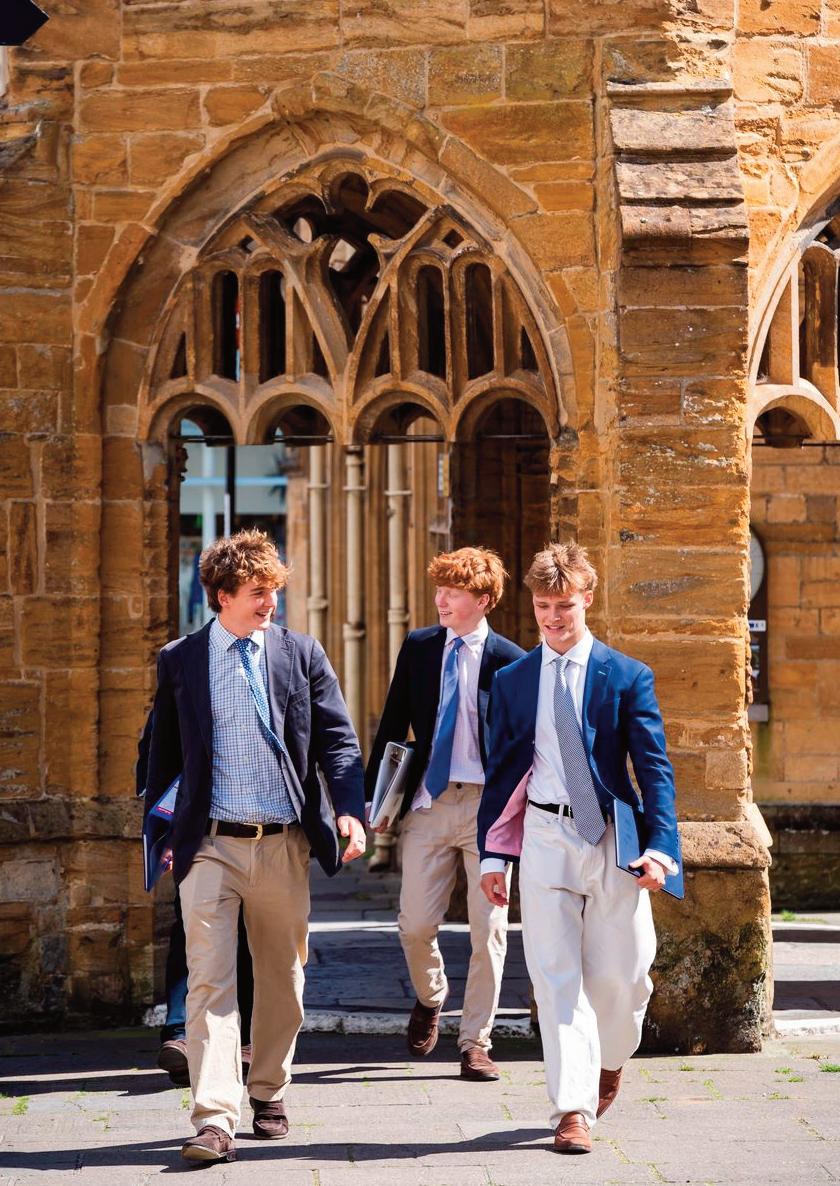
Welcome from the Deputy Head (Sixth Form)
At Sherborne Boys we talk a great deal about pathways. We want our pupils, parents and staff to be aware of the many exciting opportunities that lie ahead. On entering the Sixth Form, boys will continue the process of exploring Post-18 global pathways - supported by their peers, the Careers and Pathways Team, their Tutor and Housemaster – until they find one or two that feels right for them. Boys will then begin the process of preparing for specific pathways, which will have different academic/ practical considerations depending on specific entry requirements. Finally, boys will apply for their chosen pathway and then work towards attaining the best grades possible, whilst enjoying school to the max, before moving on to the next stage of their educational journey.
We also talk a great deal about leadership. Knowing that all our boys will go on to be leaders in one way or another, we consider it vital that leadership is placed on the curriculum so that pupils have the opportunity to consider the importance of followership and the importance of serving others and one’s own best interests. Both Lower Sixth and Upper Sixth pupils experience a wide range of talks, workshops and seminars on leadership and character development. In addition, our School Prefects undergo a robust and thorough leadership training programme which empowers their own leadership to have a positive impact upon the entire pupil body and our wider community. We want our boys to leave with a leadership toolkit so that when they are put into leadership roles and responsibilities later on, they are able to lead with confidence, kindness, authenticity and skill. Below are our core leadership values:
Serve others – we exhibit kindness, compassion, humility and moral courage.
Pursue lifelong learning – we embrace global diversity and the opportunity to learn from other cultures.
Build successful teams – we motivate, inspire and move people towards achieving positive change. Communicate with skill – we present with clarity, passion and authenticity.
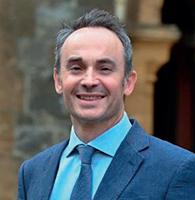
Our Leadership and Character Development Programme is run in parallel with our sister school, Sherborne Girls. There are many opportunities throughout the Sixth Form for the boys and girls get together to socialise, and learn from and with each other. Although we are a single-sex school for boys, we enjoy many wonderful co-educational moments with Sherborne Girls. This is an important and unique part of our Sixth Form offer. Every weekend in the Sixth Form, the boys and girls come together for Saturday night socials which vary from being House Dinners, Ceilidhs, Sixth Form Socials, Unplugged events, and the wonderful annual CourtsFest event. Pupils from Sherborne Boys and Sherborne Girls also interact in many sports, clubs and societies including CCF, tennis and sailing.
We offer a diverse range of Sixth Form subjects at Sherborne, which matches the diverse range of learners that we nurture and celebrate at our school. Many boys who previously found academic life and GCSEs extremely challenging can go on to absolutely thrive academically in the Sixth Form and end their time as top grade attainers. At the same time, boys who have been high achievers throughout school will enter an academic culture in which they are challenged, pushed and celebrated. The inclusive Thinkers Society, shared with Sherborne Girls and The Gryphon (a local state- maintained school), provides a weekly forum for our brightest and most curious minds to come together, learn and think hard in a welcoming and stimulating environment.
We are proud of our Sixth Form offer. We believe that everything we do is focused on providing an exciting, enjoyable, challenging and highly fulfilling programme, which enables the young men in our care to develop and access wonderful pathways, whilst making a positive difference to the wider world.
Alex Boyd-Williams Deputy Head (Sixth Form)

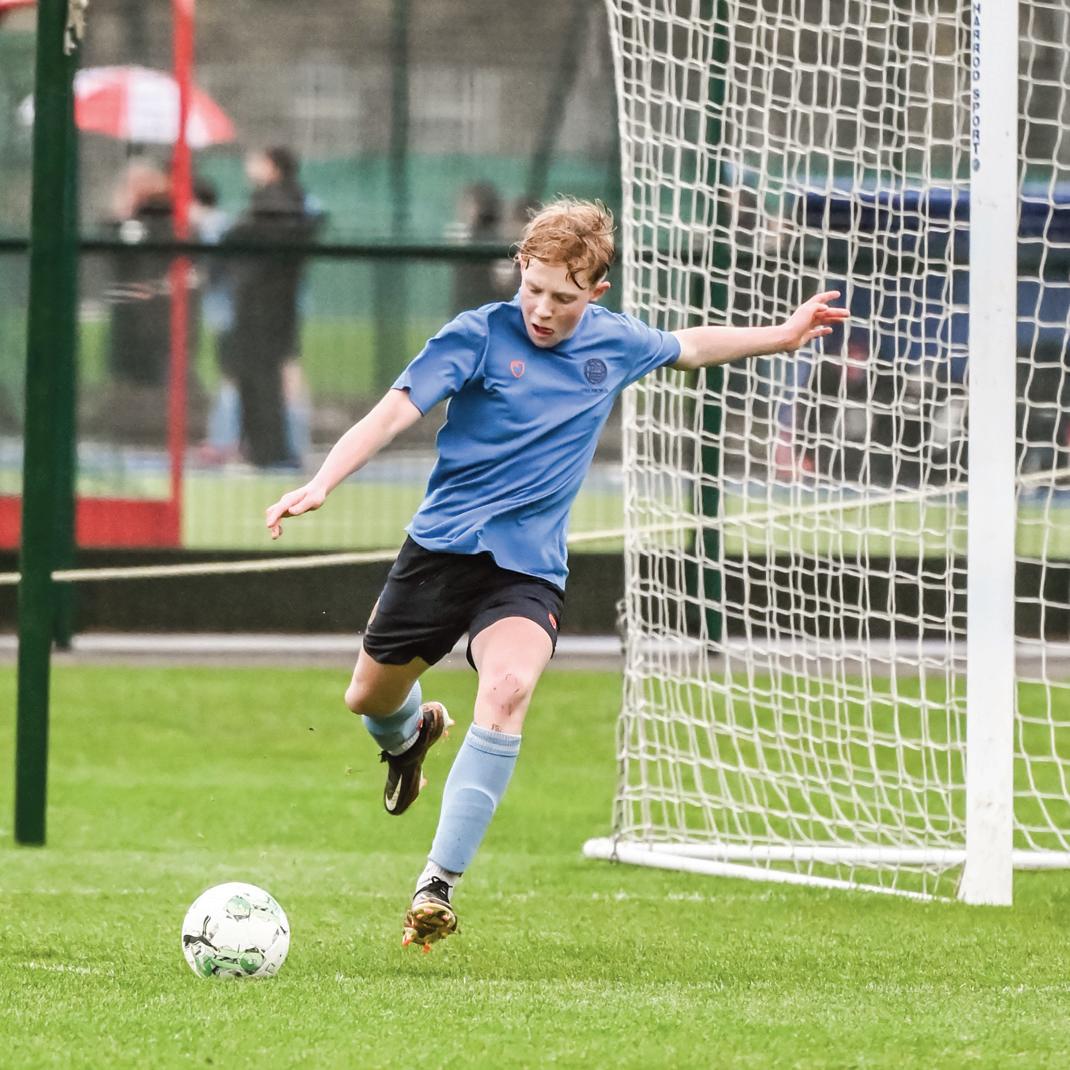


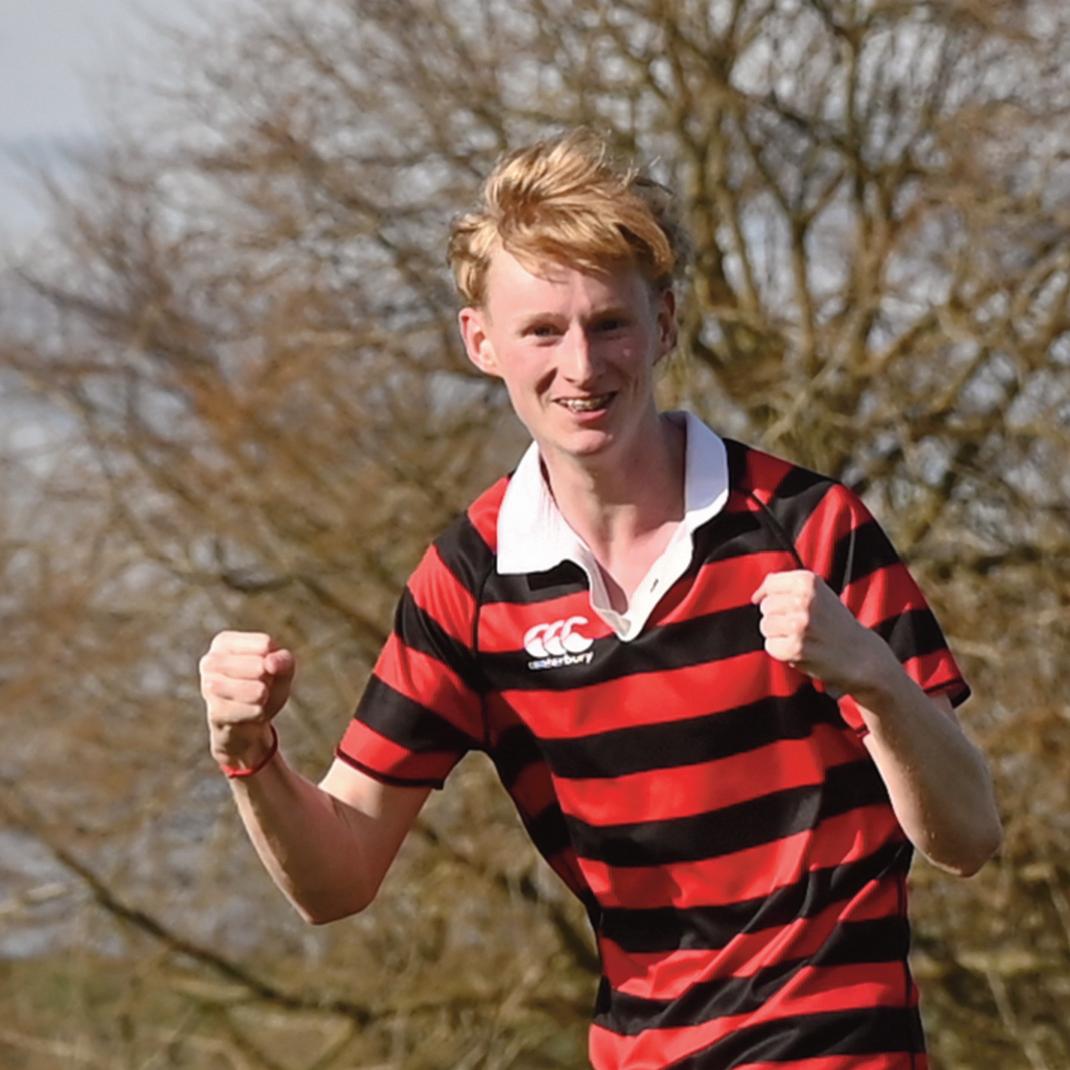
Sport at Sherborne
Sport at Sherborne
There are a huge number of sporting options for boys joining the Sixth Form whether they arrive to be part of our performance pathways or they just wish to take part in the plethora of sports that the School has to offer. While we are well equipped to bring out the very best in elite sportsmen, we are just as committed to the participation of every single boy at School.
For us, sport is a success if a boy finds an activity that he enjoys and will stick with once he leaves School. We want to form habits of healthy living; shaping a commitment to regular exercise because we recognise its importance to both physical and mental wellbeing.
Outstanding Facilities
Our state-of-the-art Sports Centre opened in September 2023 and includes a refurbished pool, a new climbing centre, two sports halls plus four squash courts, two multi-purpose studios, a golf simulator, physio facility, a fully equipped fitness suite and a dedicated performance gym. The new facilities have enhanced the sporting experience not only for boys who choose indoor games such as badminton, basketball and squash but they have bought significant benefits for boys looking to improve performance in indoor hockey, cricket and athletic development.
Performance pathways
At Sherborne Boys, we foster strong partnerships with external providers, allowing our high-performance pupils the opportunity to train and compete at a level beyond the School environment. We have built strong relationships with numerous partners including Bath and Exeter Rugby, Dorset and Somerset Cricket, Dorset Football, Bath Buccaneers Hockey Academy and Dorset Athletics.
Our High-Performance Programme is specifically designed to empower our athletes to reach their maximum potential. Through a carefully crafted and monitored combination of enrichment activities and physical development, we provide a structured platform that enables them to work efficiently and effectively towards their goals. Our aim is to cultivate an elite environment within the School, fostering a strong educational foundation necessary for success at the highest levels of sports performance.
Under the careful oversight of our team, the HighPerformance Programme ensures that pupils receive personalised strength and conditioning programmes. It will also deliver seminars, lectures and group sessions covering many crucial topics such as nutrition, sleep, psychology, culture and values, leadership, teamwork, performance lifestyle, time management, and video analysis. This comprehensive approach provides our athletes with the knowledge and skills necessary to thrive both on and off the field.
While the High-Performance Programme is compulsory for boys who have received a sport scholarship or award, it is also open to those who demonstrate exceptional talent, dedication, and aspiration to achieve the highest standards in their respective sports.
Several sports awards are available for boys demonstrating exceptional talent and potential in their chosen sport or sports. One of the Sixth Form awards is the Walford Award, named after Micky Walford, a Schoolmaster at Sherborne who represented GB in hockey at the 1948 Olympics, played cricket for Somerset and trialled for England at rugby.
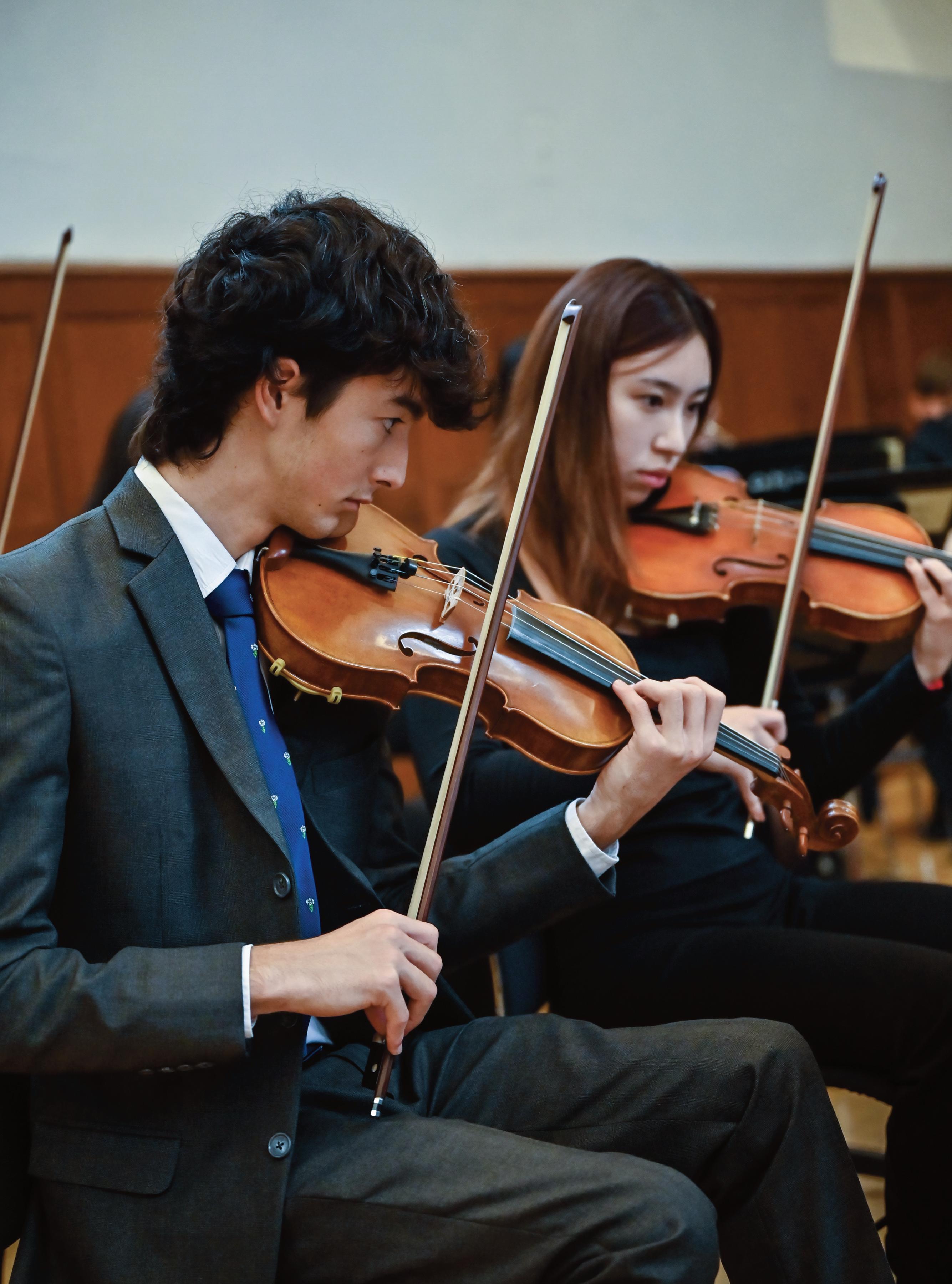
MusicMusic runs right through the heart of Sherborne. The Music School is fantastically equipped with state-ofthe-art technology, spacious practice rooms with pianos which are on a continuously rolling programme of replacement, performance studios that have tielines to the Recording Studio, and two music classrooms that contain thirty composing workstations between them. A Levels are offered in both Music and Music Technology, with numbers opting for both subjects being unusually high, and reflecting the high status of Music in the School.
Sixth Formers have instrumental and vocal music lessons scheduled for them at fixed times during the day that are identified as being free. Those learning more than one instrument may on occasion be asked to have their lessons taught quite late in the evening.
The Music School is open from 7.30am to 10.00pm Monday to Friday, and pupils may practise at any time they wish. On the rare occasion when there is a shortage of practice rooms, gap-year Music Assistants (Choral Scholars) enable a system of room rotation.
From the 109-strong Choir that sings in the Abbey during whole-school services twice a week — singing is “cool” at Sherborne — to the smallest instrumental duo, there is quite literally something for everyone.
The Wind Band is enormous and has to be capped at 65, so subsidiary groups flourish. There are also smaller groups that cater for all standards. The auditioned Swing Band is one of the finest big bands in the South of England and tours the Caribbean every other year.
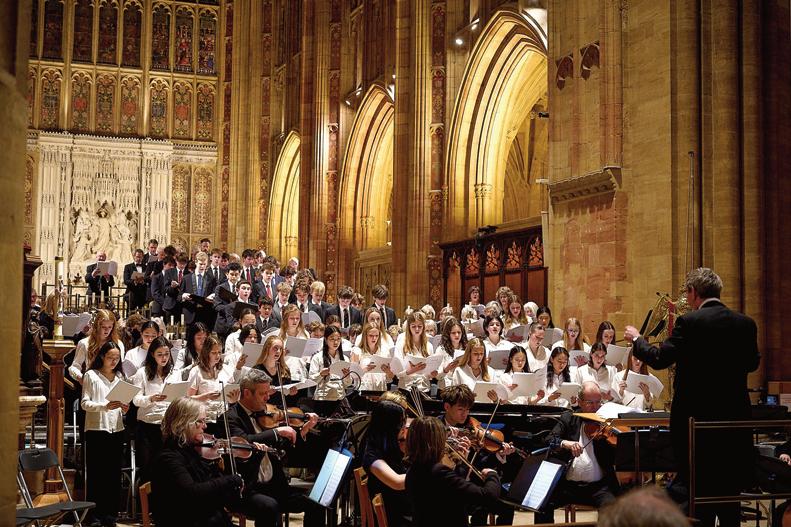
The two orchestras are joint with Sherborne Girls and The Gryphon School and achieve a high standard of music-making through auditioned entry. Chamber Music proliferates with several ensembles entering national competitions each year, with particular success in the Mid Somerset Festival in 2023. Rock and Pop groups are pupil-led and focus upon the annual CourtsFest (a large screen open-air performance each summer) whilst there is also a further performance opportunity each term and at least two “Unpluggeds” per year. For advanced instrumentalists there are performance opportunities every Friday lunchtime in public concerts held in a nearby church, and informal concerts and masterclasses, competitions, and internal workshops are open to all. Many pupils learn more than one instrument. As the School in which Chris Martin of Coldplay attended, Sherborne provides musical opportunities of which a Sixth Former would be remiss not to take advantage.
Music Scholarships are available at Sixth Form entry for those of Grade 7 standard on two instruments. The opportunities for Music Scholars are limitless and include auditioned places in the School’s many advanced instrumental ensembles, the Chamber Choir and the Close Harmony group. A member of the Music staff acts as mentor and Music Tutor to guide scholars through an individual programme involving Grade 8, ATCL and LTCL Performance Diplomas, including prestigious and unrivalled performance opportunities.

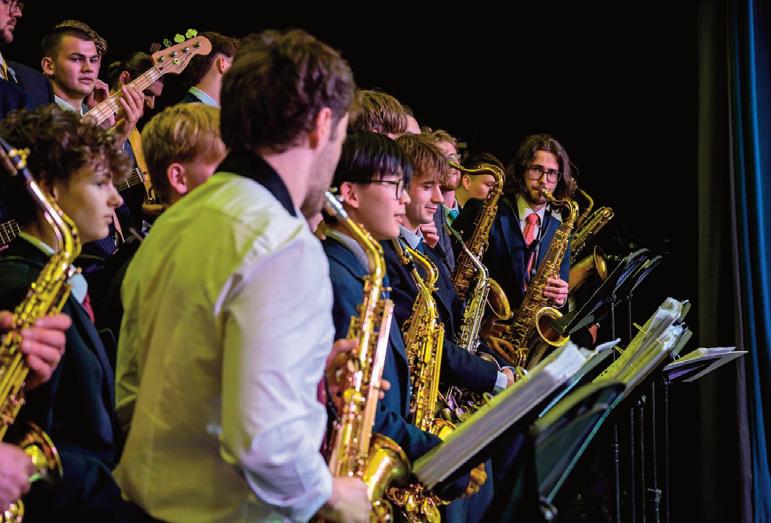
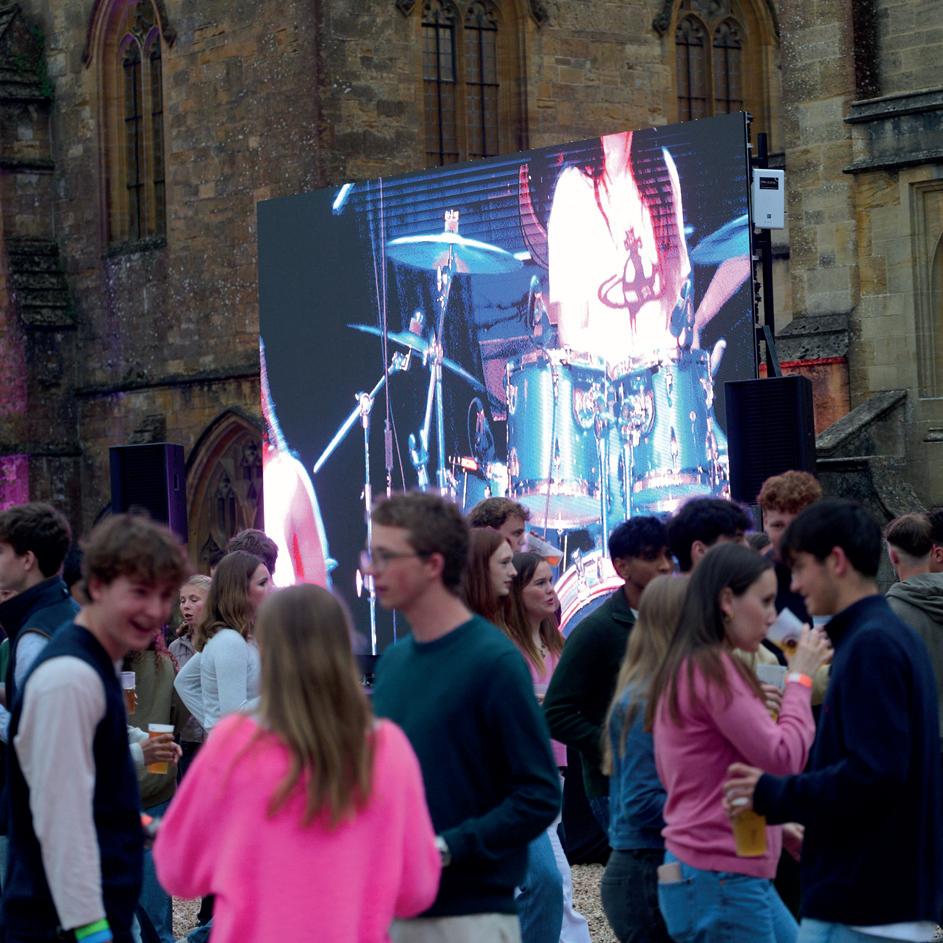


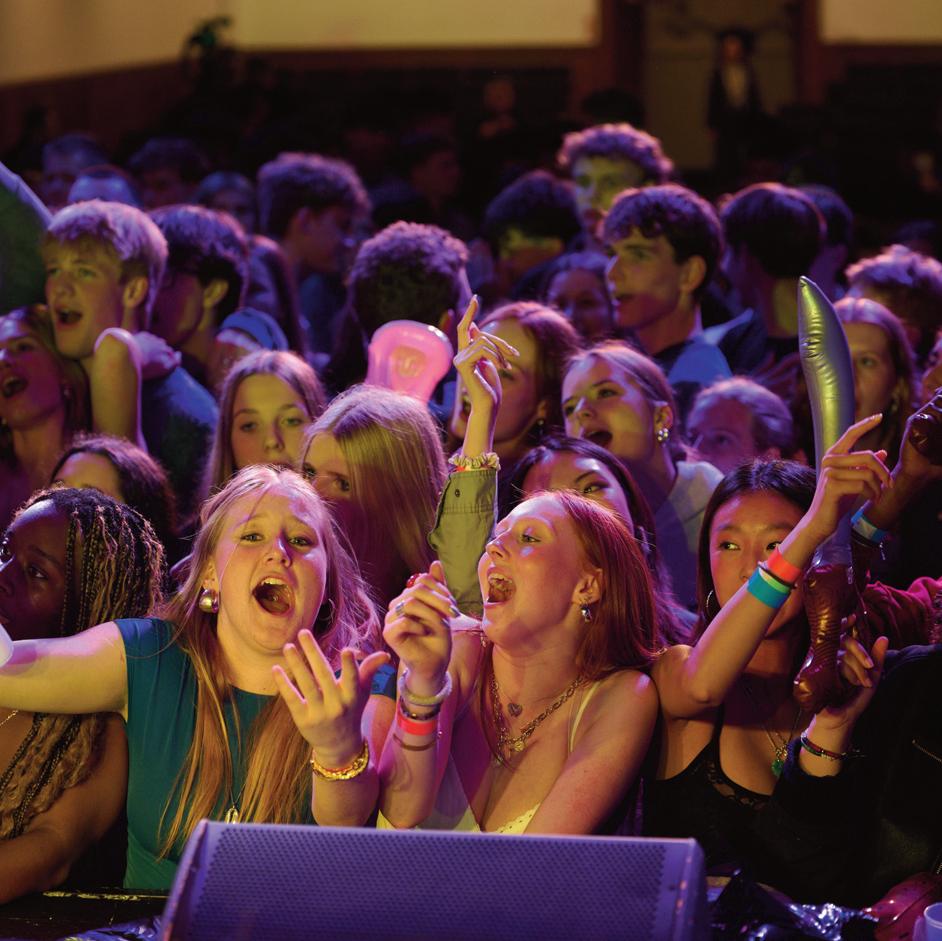
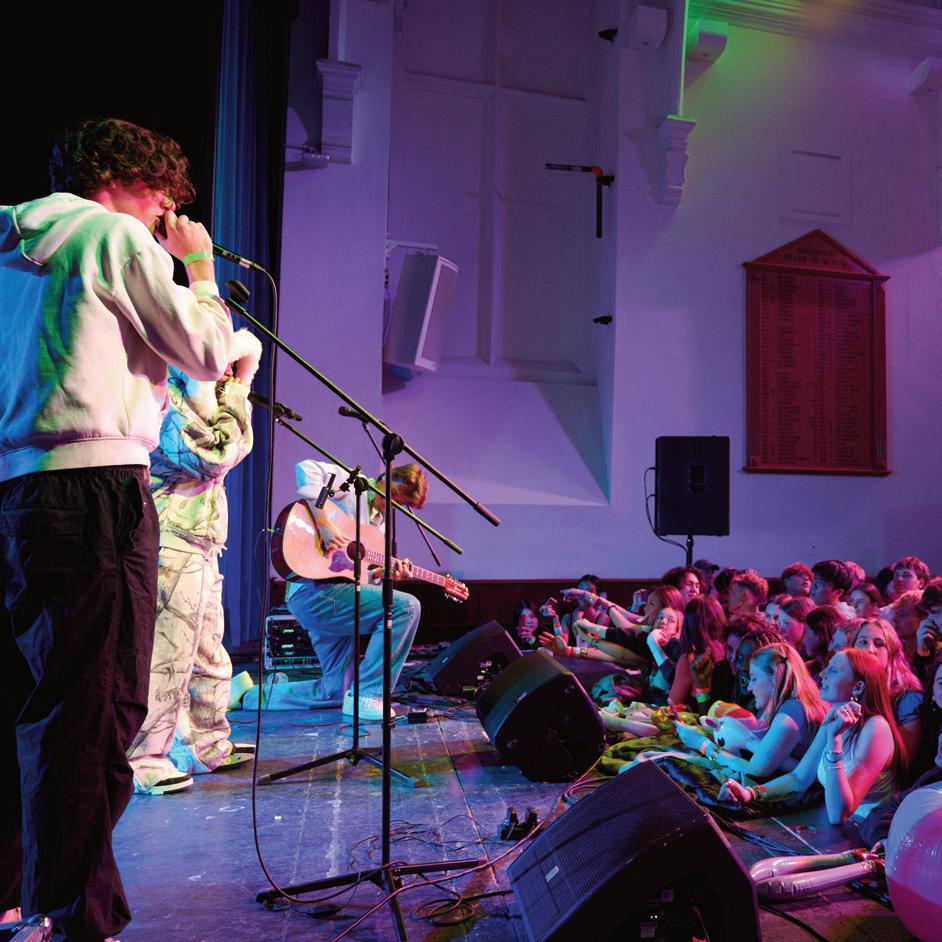

“I took advantage of a lot of the different extracurricular opportunities in sports, in drama, everything I did before, but I just notched it up a level.”
Activities
We offer boys the chance to participate in all sorts of activities, including debating, archive club, campanology, radio broadcasting, philosophical discussion, charity work and volunteering. Examples of the opportunities available include:
° Allotment Club
° Barbell Club
° Basics of Jewellery Making
° Beginners’ Arabic
° Bellringing
° Board Games
° Chess
° Classics Society
° Coding Club
° Cooking Club
° Creative Writing
° Debating Society
° DJ Practice Club
° Environmental Action Group
° Geography Society
° Grade 5 Music Theory
° High-Intensity Interval Training (HIIT)
° Medicine in the News
° Model United Nations Club
° Philosophy Club
° Psychology Club
° Radio Sherborne
° Snooker Club
° The Thinking Society
° Theory and Practice of Meditation
° Turing Virtual Reality Club
° Water Polo
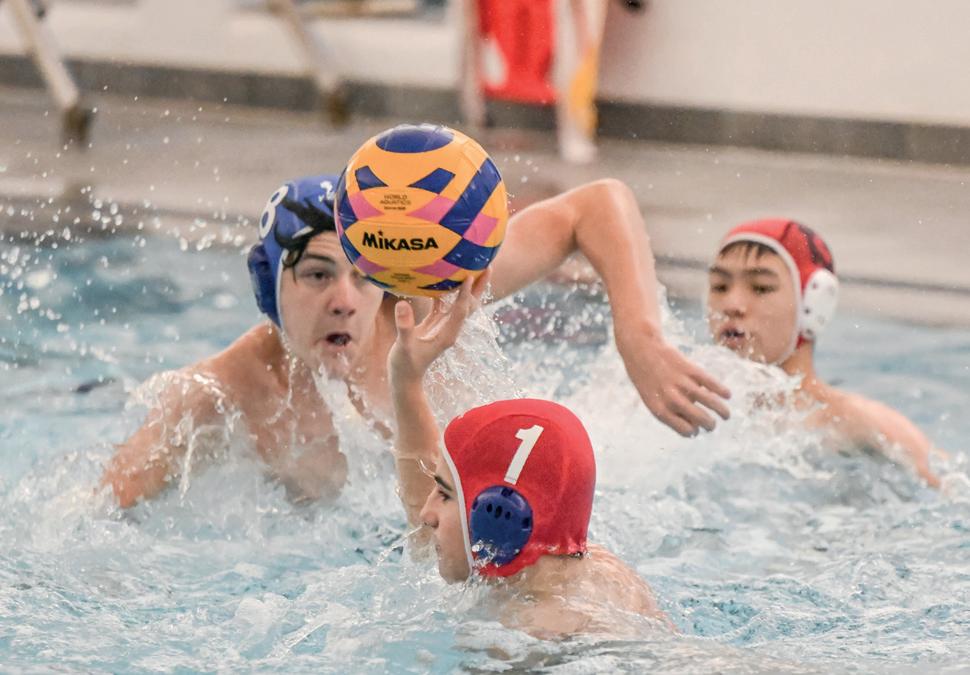
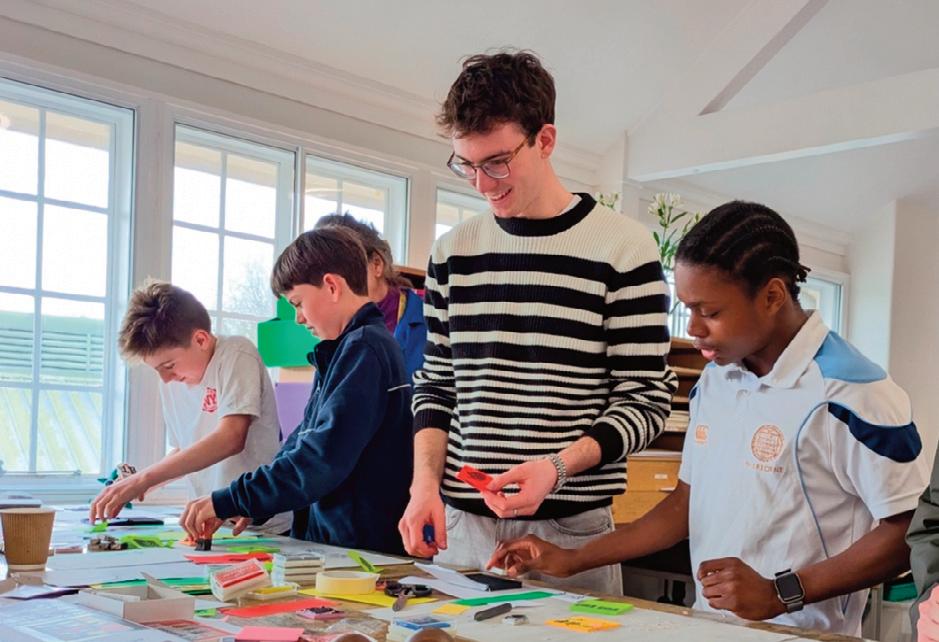
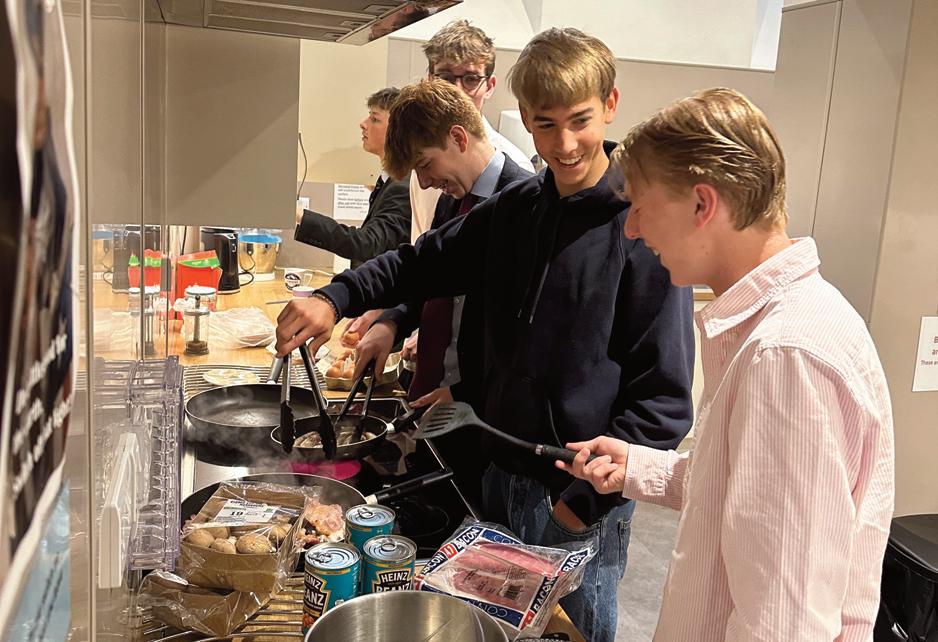
Charity and Outreach
CCF
The Charity and Community Outreach programme is a central part of the Sixth Form offer. Boys participate in numerous events including, non-uniform days, sleep outs and concerts raising money for causes such as Save the Children, the DEC Turkey Earthquake Appeal, a number of Ukraine appeals, Papyrus, a men’s mental health charity and ‘Help and Care’.
It is through time and not money that we aim to focus our attention. The boys work alongside local groups such as Yeovil Pen Mill Football Club, the Yeatman Hospital, the Fire Service and Sherborne Community Kitchen. There are many Sixth Formers involved in the Schools Community Hub. Every school in Sherborne is represented, and the boys share ideas and interact with primary school children, Sherborne Girls, and the Gryphon pupils. We look to enhance this outreach further through work with a local bike charity that sends old bicycles out to Africa, and a link with a local animal charity. We want our Sixth Form pupils to take the lead and come up with new initiatives, whilst ensuring that the initiatives already in place continue to thrive.
CCF offers pupils in the Sixth Form opportunities to develop their leadership skills. Character education is at the heart of CCF and the skills our pupils develop are of great utility, no matter what direction life takes them. Sixth Form pupils deliver large chunks of the CCF training and are supported by a Senior Cadet and experienced staff members. Sherborne CCF is a joint endeavour with Sherborne Girls and our Sixth Form cadets really thrive as part of the leadership group.
We have three sections in the CCF: Royal Navy, Royal Marines and Army. Each section does something different whether sailing, field craft and tactics, military knowledge, or handling a weapon safely. Our Sixth Form cadets receive leadership training and on a weekly basis Sixth Form cadets instruct and support our younger cadets. Arguably, CCF provides leadership opportunities that are not on offer in other areas of school life. The training leads towards termly Field Trips which are considered by many cadets to be the highlight of the CCF year. These trips involve visits to military training areas such as Salisbury Plain, HMS Raleigh and Scraesdon Fort where cadets run through tunnels and fire blank ammunition!
We enter national competitions such as the Rifles Cadet Cup, the Pringle Trophy and the CCF Sailing Regatta. Sixth Form cadets also experience an annual Black Tie military dinner, as well as parading for Remembrance Sunday and the Biennial Inspection, where a high-ranking officer watches a parade of the cadets. We offer lots of camps and courses in the holidays and we have been adventure training in Norway and Transylvania in recent years. We also have an annual parachuting trip for the more intrepid cadets!
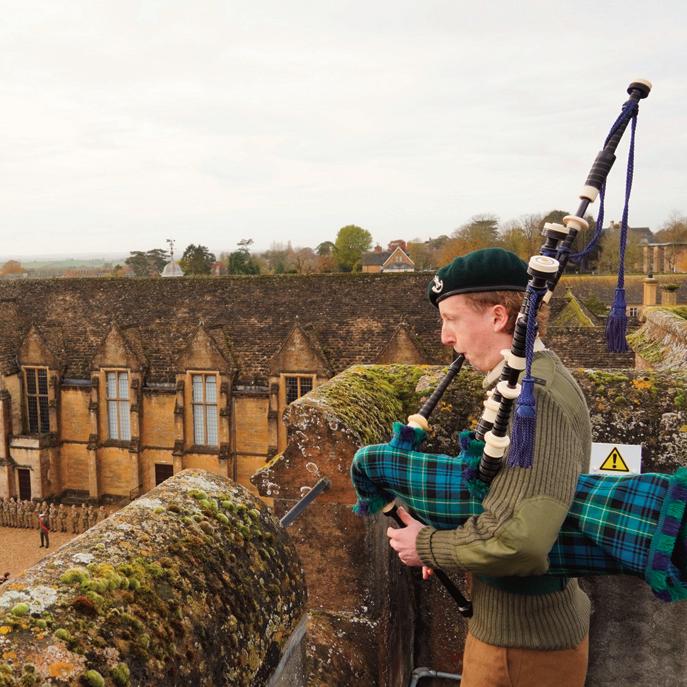
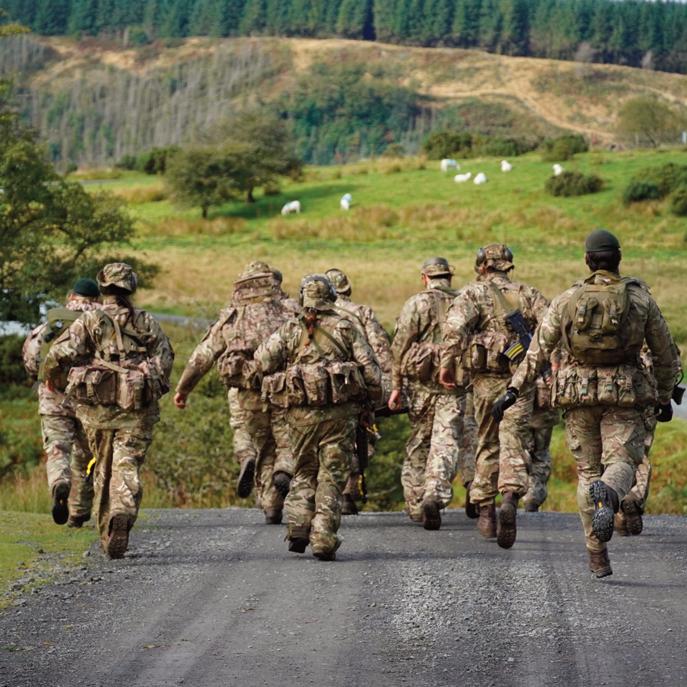
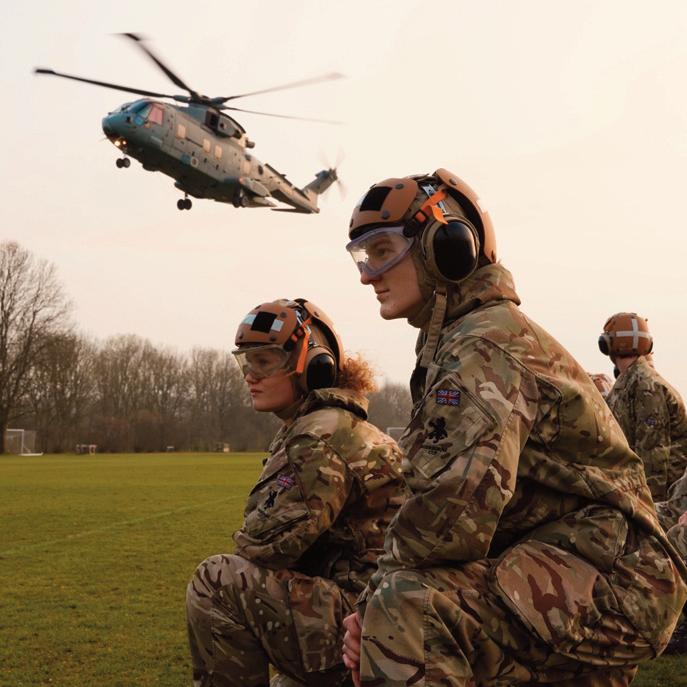
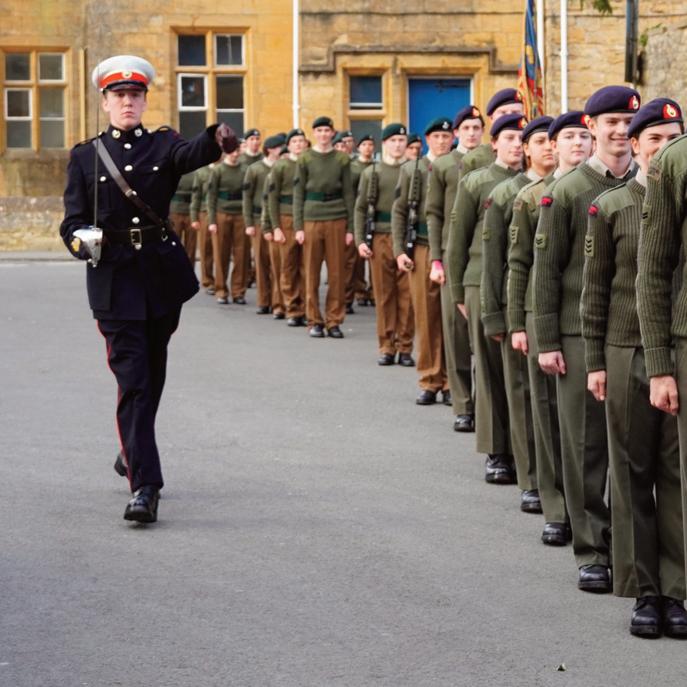
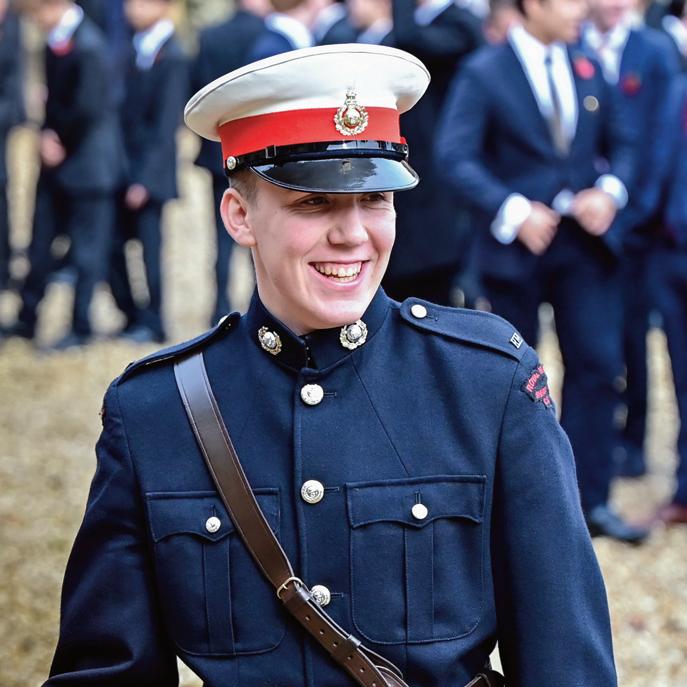
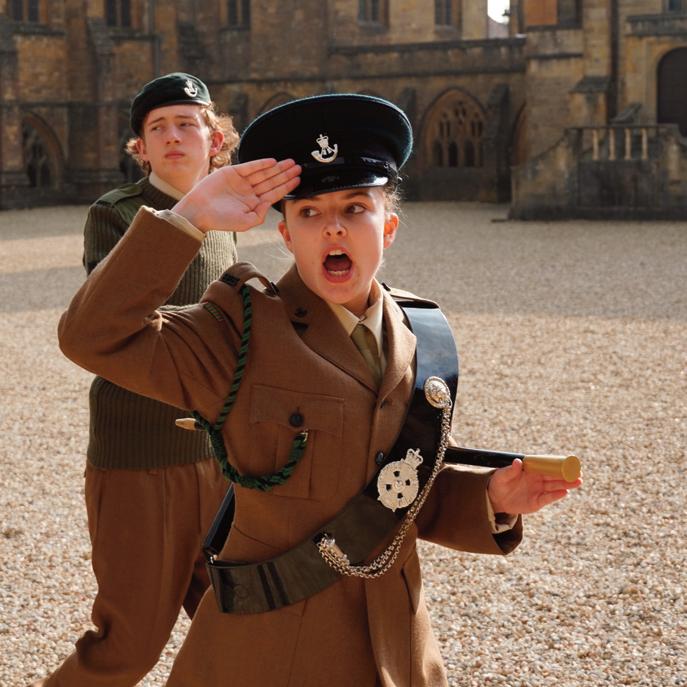
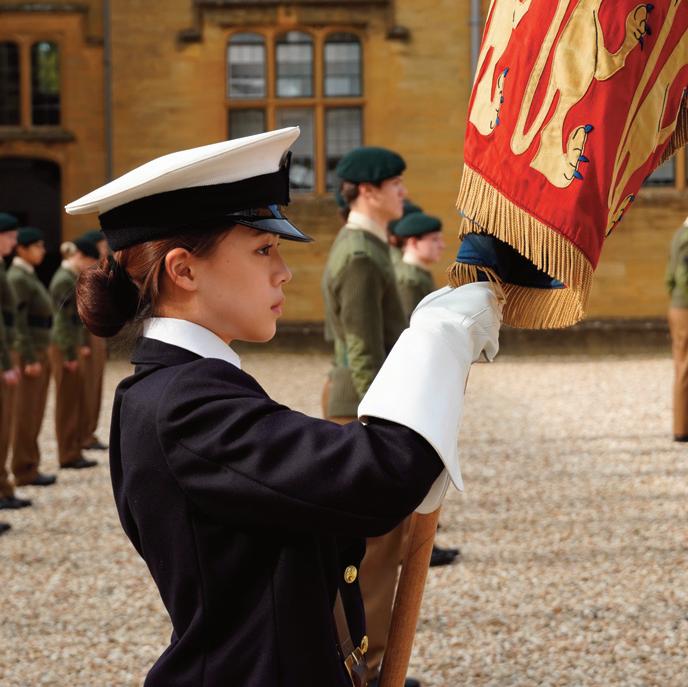
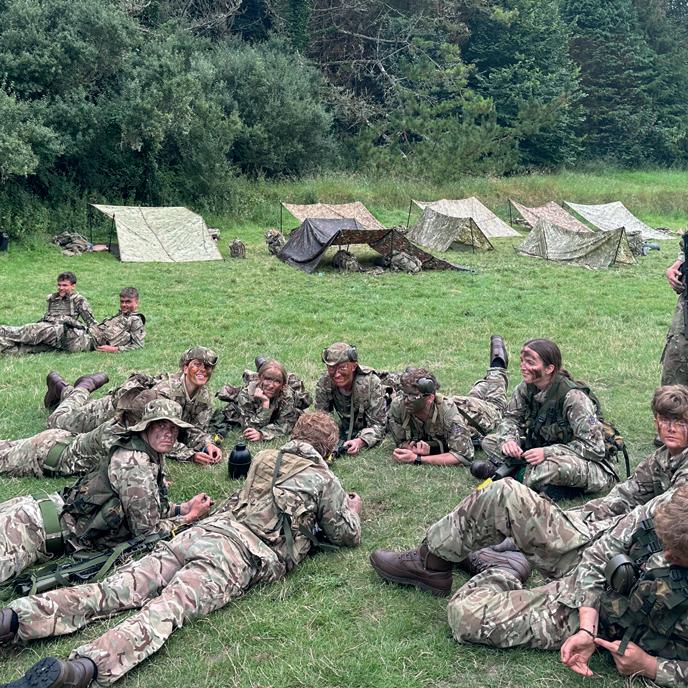
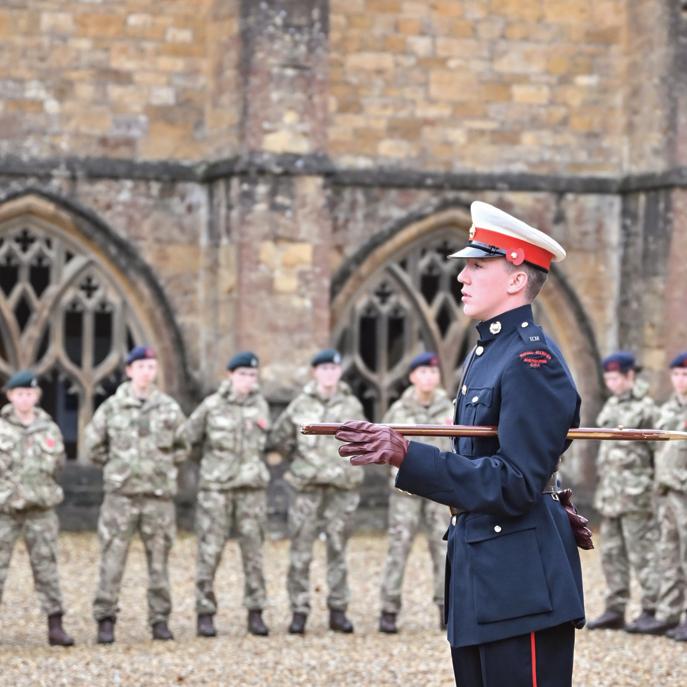
“Sixth
Form was by far the favourite part of my time at Sherborne, it allowed me the freedom to grow and pursue the things I most cared about alongside my academic and other commitments.”
Outdoor Education
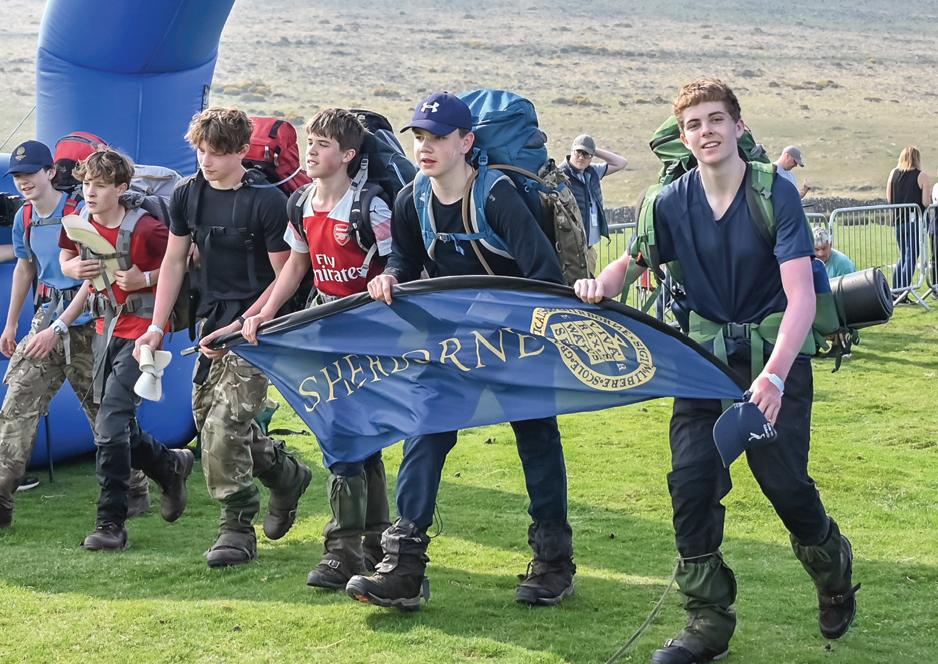
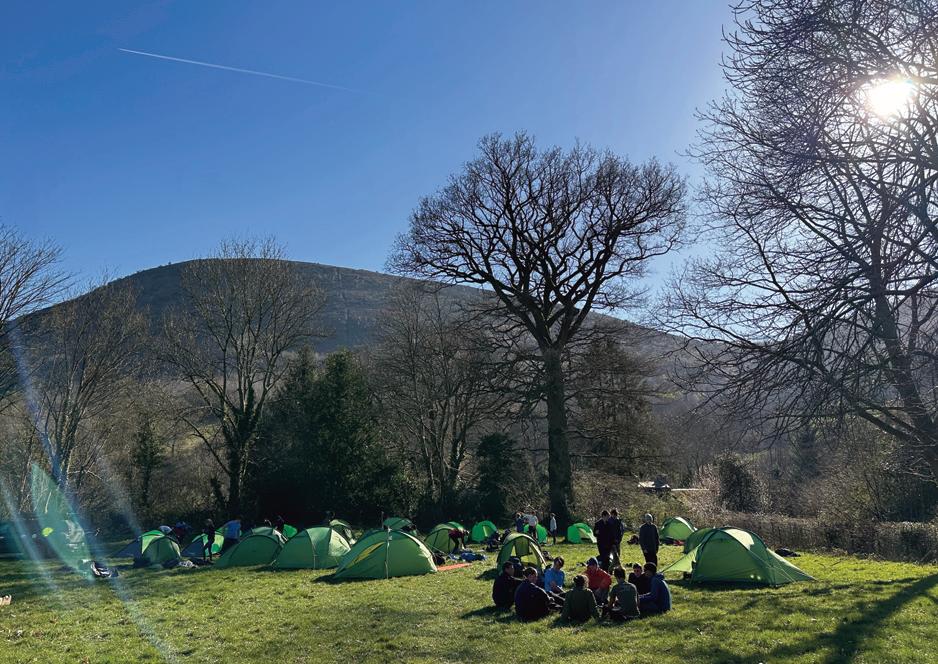
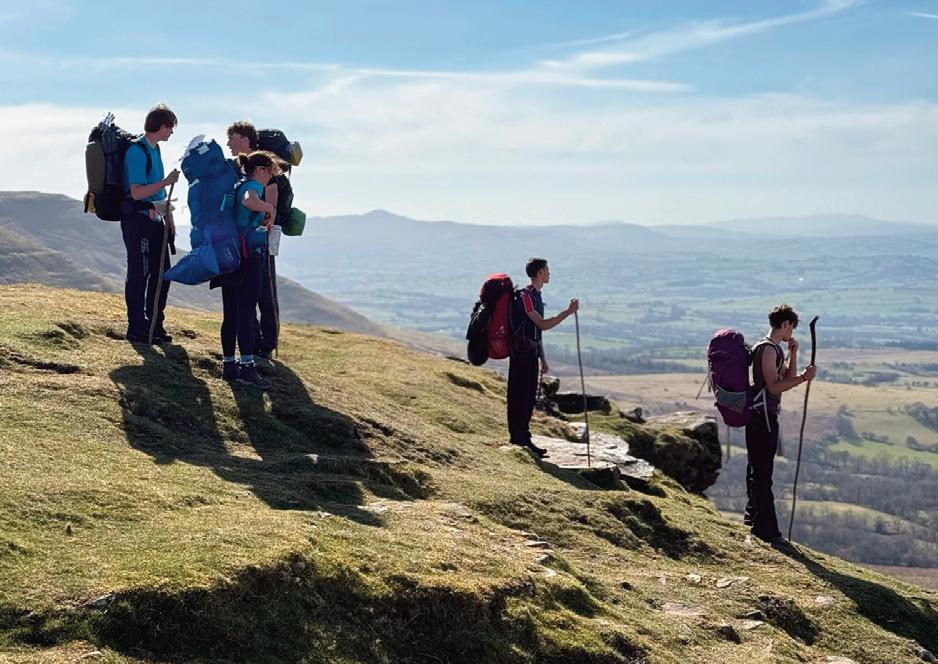
Outdoor Education gives boys the opportunity to extend their experiences beyond their comfort zone. We aim to provide opportunities to learn skills such as navigation, campcraft and rope work through activities such as sport or challenges. The main opportunities available include Ten Tors, the Duke of Edinburgh’s Award (DofE) and Climbing.
The Ten Tors challenge is tackled as a mixed team of six, jointly with Sherborne Girls, over 45 miles across Dartmoor. The Ten Tors is a challenge of perseverance and determination to navigate and cross some of the most demanding terrain in the UK. Run by the Army, it is a self-sufficiency exercise over two days and requires the team to wild camp on the moor. Training occurs throughout the Lent Term and the event is usually held in May.
DofE Gold is also available to those who wish to sign up after their 16th birthday. Activities must be completed across the standard four sections (Volunteering, Physical, Skills, Expedition) in addition to a fifth element; organising a residential experience. The DofE website has many examples and opportunities to explore for ideas to complete each section and how to organise an approved residential. The School arranges some expeditions including walking or canoeing and these are also conducted jointly with Sherborne Girls.
Climbing is a sport option all year round and held in our state-of-the-art climbing centre. The bouldering wall can be used to develop strength and technique whilst the almost ten metre roped wall pushes stamina and rope control. There are competitions both locally and nationally such as the annual Independent Schools’ Climbing Competition. In the summer we often use the cliffs of Portland to test the skills learnt indoors on real rock. All safety equipment is provided, and instruction given by qualified staff.
“I’m amazed by everything the school provides to me, and to all the boys.”
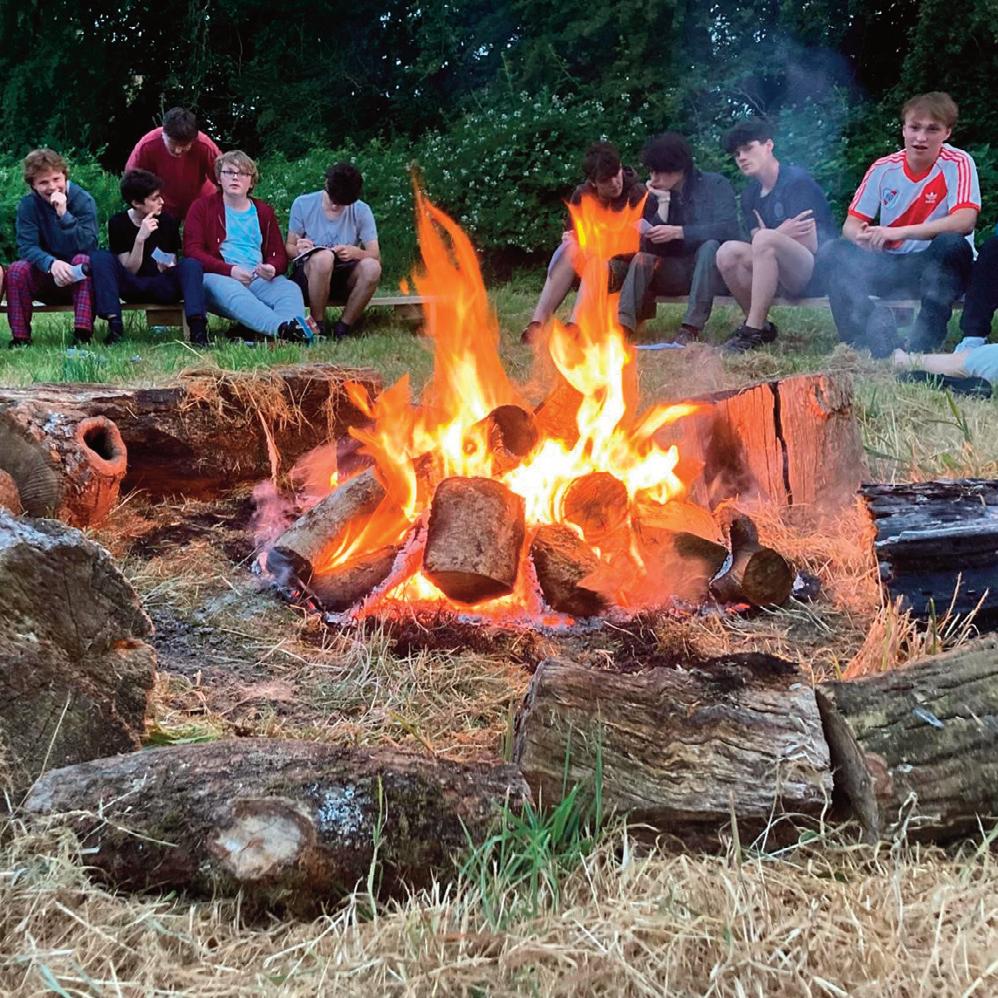

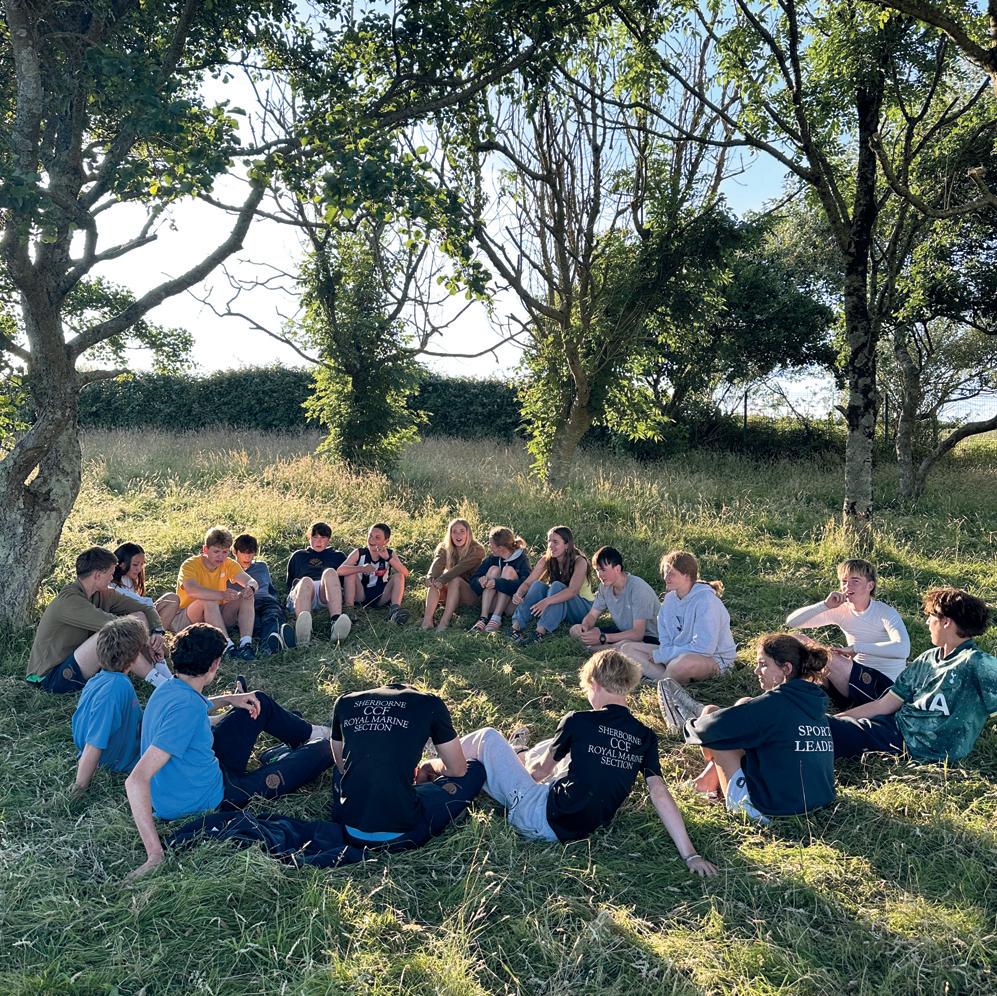
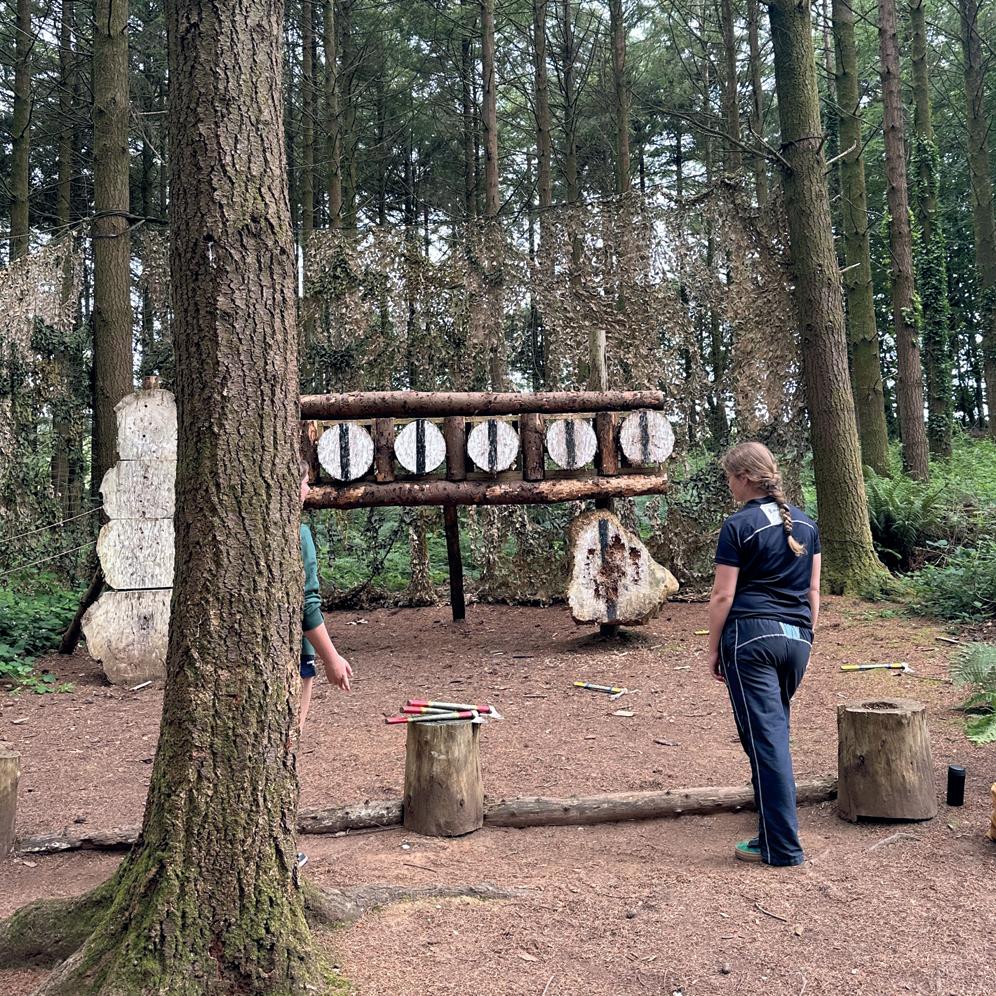
Boarding Life at Sherborne
Boarding at Sherborne enables our boys to live within a close, supportive community and make the most of the opportunities on offer in our full boarding environment.
By living alongside our boys and watching them grow together, we are able to provide unrivalled pastoral care. We work closely with parents to give every boy the best possible chance to thrive. Boys understand that they represent Sherborne in the local community, that membership of the School confers certain privileges and certain responsibilities. Each individual knows that they play a role in helping the whole community to thrive, and acquire habits of kindness, compassion and thoughtfulness that set them up for life.
Boys form strong bonds across year groups, underpinned by mentoring between the junior and senior boys. With the Boarding House at the heart of their experience, it quickly becomes a place to call home - somewhere they are encouraged to be themselves and relish the fellowship of their friends.
As a Sixth Form pupil there is an expectation of positive leadership, whether you are in the Upper or Lower Sixth. You are role-models to the junior years, which comes with a good deal of responsibility. We ask all boys to take initiative, contribute ideas and lead by example, through purposeful action to create a supportive and welcoming atmosphere within Houses and across the whole School community.
Many Sixth Form entrants become House and School Prefects and a number have been Head of School in
recent years as we recognise the talents and contribution of all individuals, regardless of how long they have been in the School.
The Boarding Houses are busy places both during the week and at weekends. A typical weekend will start with Saturday morning lessons, usually followed by a whole School Lecture often delivered by someone outside the School – we’ve had explorers, mountaineers, athletes, academics and businesspeople in recent years. Saturday afternoons are given over to the School’s extensive sports programme, in which every boy has a chance to participate, before they gather in Houses for Assembly in the evening. Supper is followed by a programme of social activities, together with Sherborne Girls.
On Sunday mornings, breakfast is followed by quiet time in Houses, during which boys catch up with work and prepare for the week ahead. Various trips take place on Sundays, including outdoor activities for example, paintballing, go-karting, zorbing or visits to watch professional sports matches or perhaps the cinema. Inter-House competitions are regularly scheduled for Sunday afternoons as well as during the week, in activities as diverse as Debating, Football and Water Polo. Most weeks, the whole School comes together on Sunday evening for a service in the Abbey.
Above all, as a result of the encompassing nature of boarding life, Shirburnians know that they are cared for and that the whole community is looking out for them; celebrating their highs and supporting them during the challenges of teenage years.
“The boys in my house immediately accepted me as if I was one of their own since day one, as if I’d been here since Third Form, and I've made amazing connections with a lot of them.”
“I went to a local co-ed school and then for Sixth Form, I thought now is the perfect time to join - I'm ready. So, I took a leap of faith, joined Sherborne and it was one of the best decisions I've ever made. I was a bit apprehensive about boarding at first, but all the boys in my house have really made me feel part of the team and the tribe.”
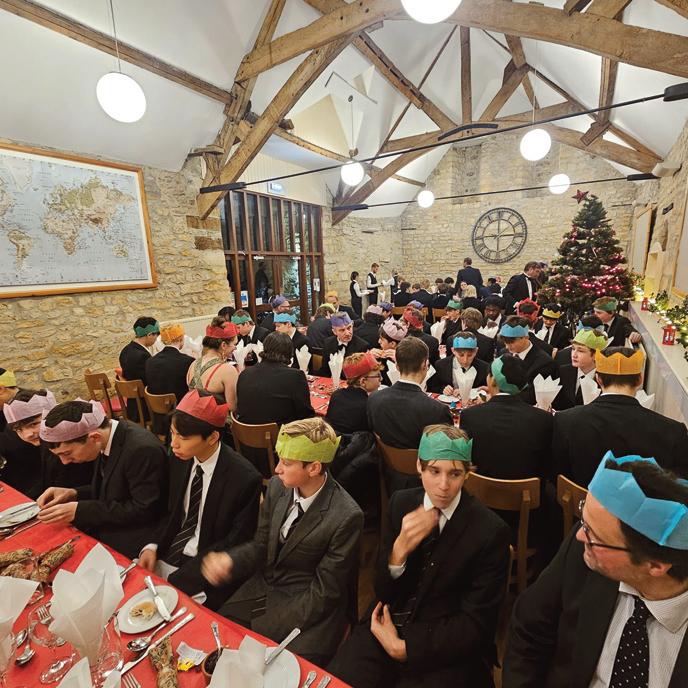
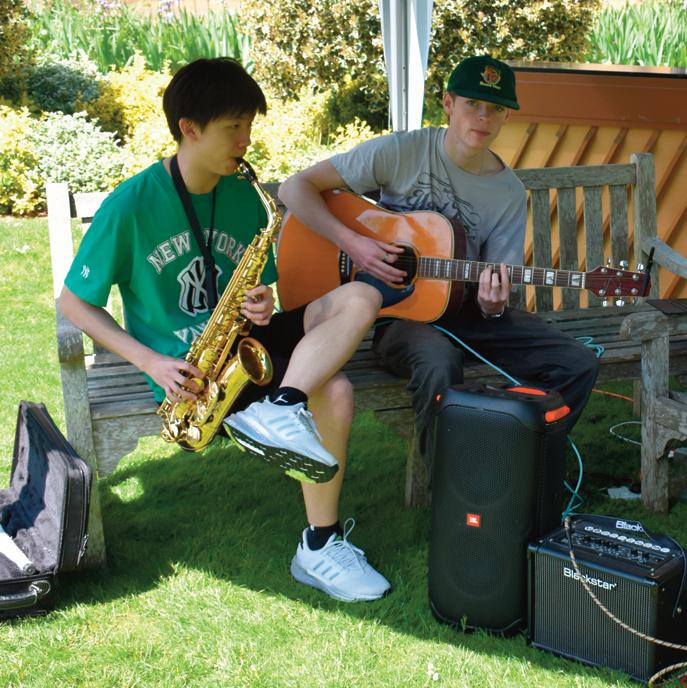
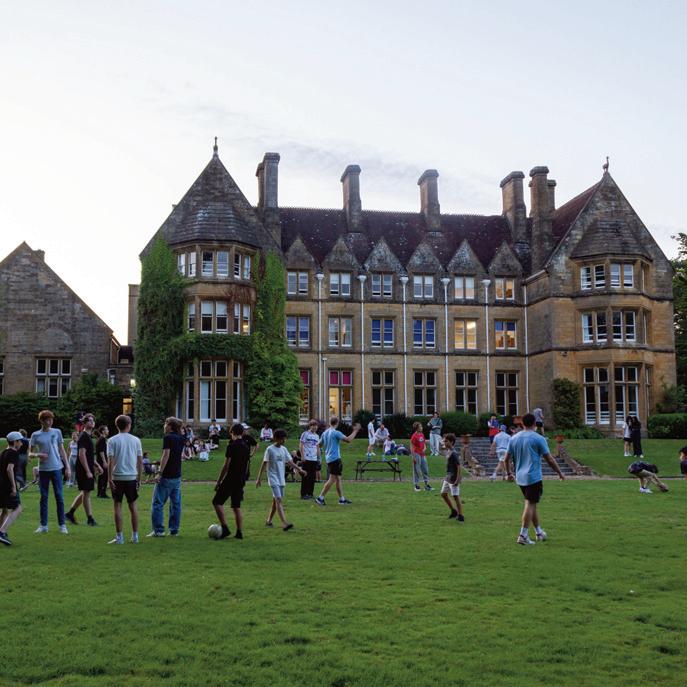
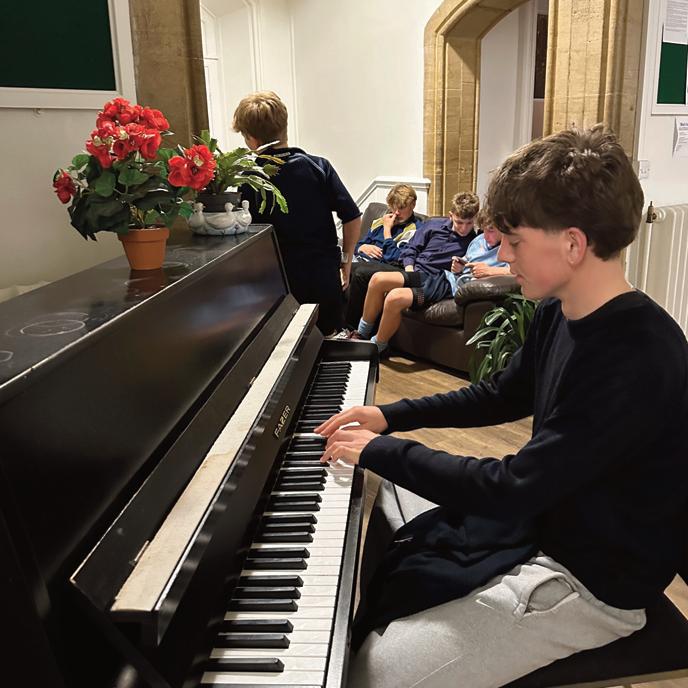
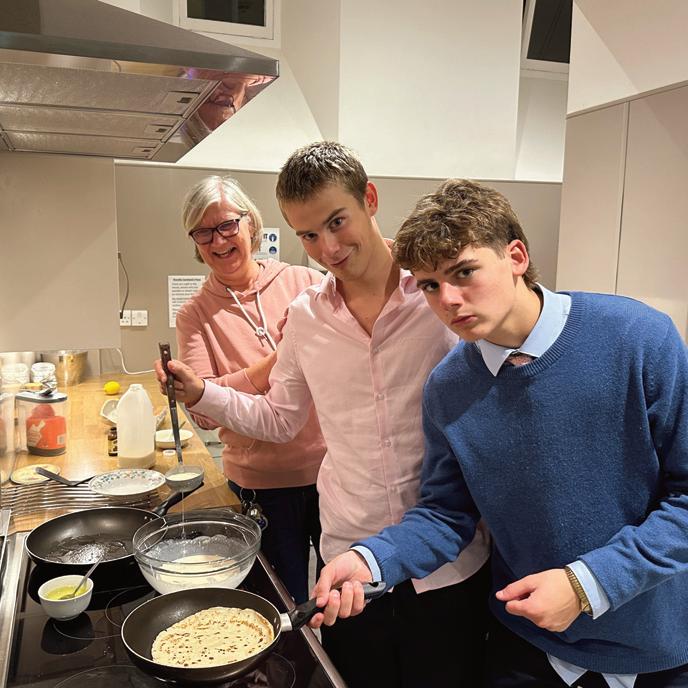
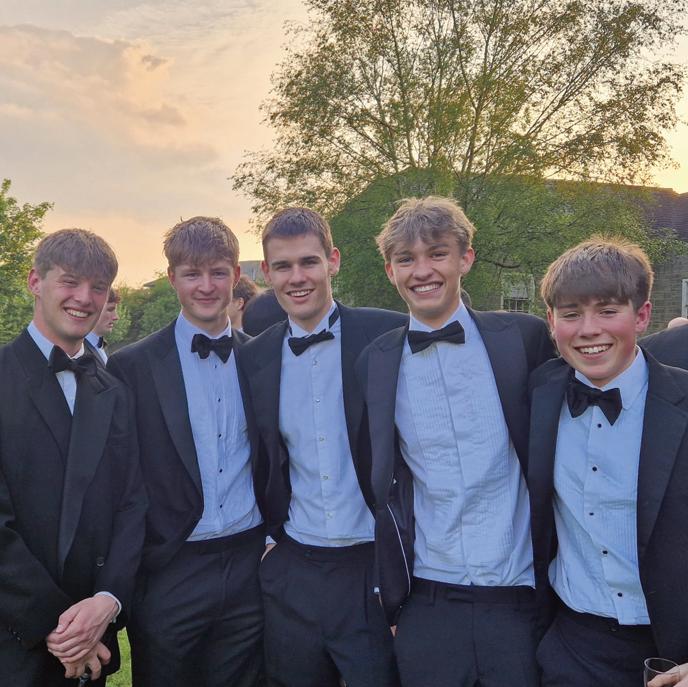
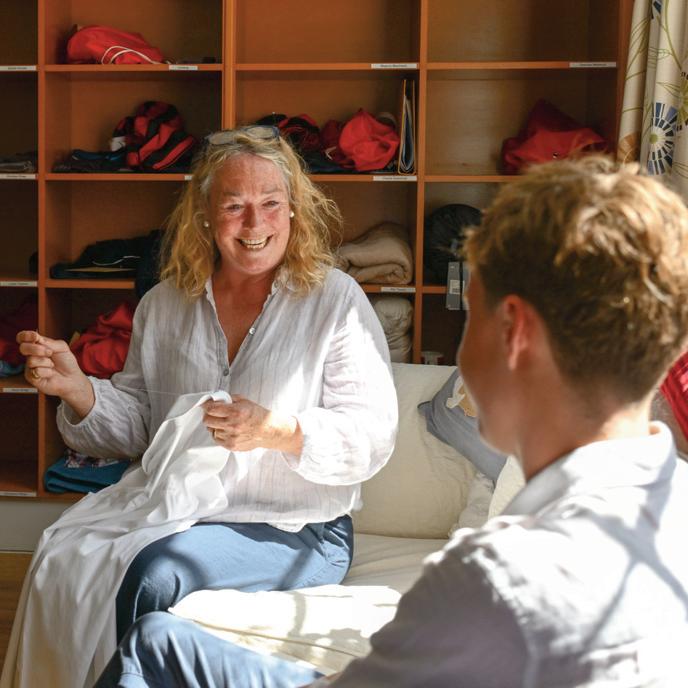
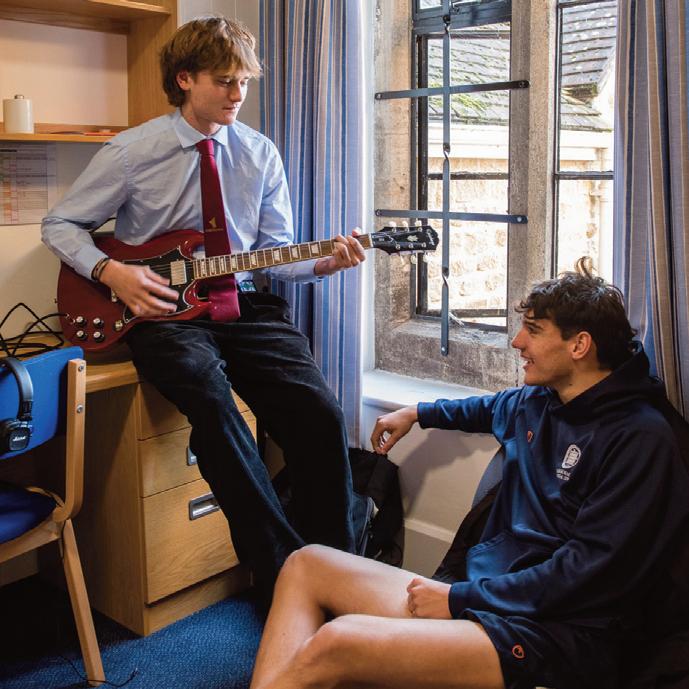
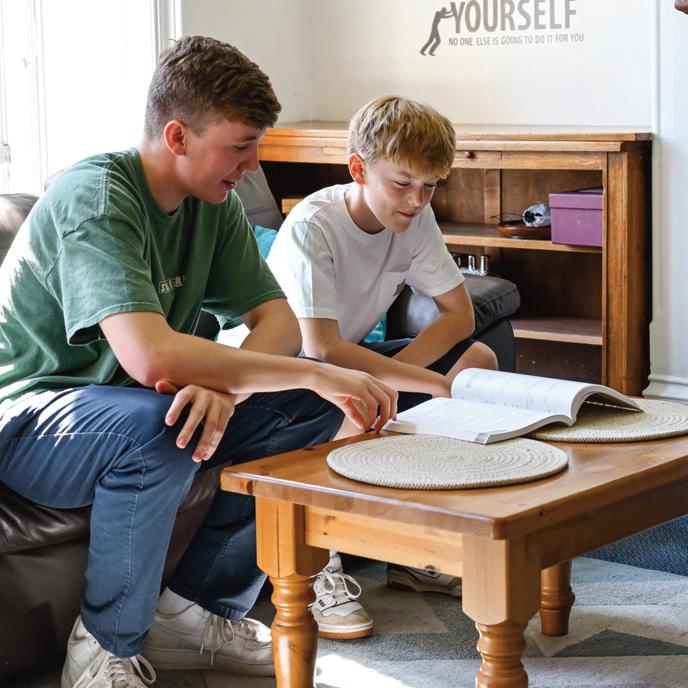

Entry into the Sixth Form
It is important that you choose Sixth Form options that you find interesting and inspiring, because this will help you to learn. However, it is also crucial that you choose subjects that match your strengths, talents and unique set of skills. You also need to base your options choices on a strong foundation of knowledge and understanding to perform well in the Sixth Form and beyond.
Entry Criteria:
In order to be eligible to study in the Sixth Form you need to:
° Achieve an average of a 4 (a C grade) across all of your (I)GCSEs
° In order to transfer automatically to a subject at A Level you need to achieve at least a grade 7 (an A grade) in the subject at (I)GCSE
° No additional criteria are required to gain a place on a BTEC course.
In the case of subjects which have not been taken at (I)GCSE, we will take into consideration your performance in other relevant supporting subjects. For example, if you wish to study Business at A Level and have 7s or above in supporting subjects like English or Maths, that would certainly serve as a ‘green light’ for you to take Business at A Level.
Grades 1-4 (C grades or lower) are not a viable basis from which to start an A Level course. If you have a 4 or anything less you will need to reconsider your options and choose a different course.
If you have a 5 or 6 at (I)GCSE (a B grade) and wish to study that subject at A Level, we will discuss this possibility with the relevant Head of Department to determine whether or not you have a strong enough foundation to be successful on that A Level course. In many cases (but not all) this will be deemed to be the
case. However, for heavily factual subjects like the Sciences it is unlikely that you will be allowed to continue with the subject at A Level unless you have a solid A grade in either the supporting (I)GCSE or in that specific subject component if you have completed the Dual Award Science (I)GCSE.
A further exception is Mathematics, for which you must have an A* or A, or a 7, 8 or 9, in Mathematics (I)GCSE to progress onto the A Level course. Indeed, because you can achieve an A grade in Maths (I)GCSE with as little as 60%, boys who have a relatively weak A grade in (I)GCSE Maths are advised to seek specific advice about whether continuing onto A Level is a sensible option for them.
How to apply (for external candidates only)
Registrations to join the Sixth Form in September 2026 should be received by Monday 20 October 2025. Candidates will then be invited to join us for assessment at Sherborne on Tuesday 18 November 2025. Although we recommend attending in person, online assessment and interview can be arranged for candidates applying from abroad.
Place decisions are announced on 1 December 2025, with place offers to be accepted by Monday 8 December 2025 by payment of a nonrefundable deposit and a signed parent contract. After this date, unaccepted offers will be released to those on the waiting list.
Late applications are always welcome but will be subject to places being available. Early registration is recommended. For further information about the admissions process, please contact admissions@sherborneboys.group or call the Admissions Team on 01935 810403.
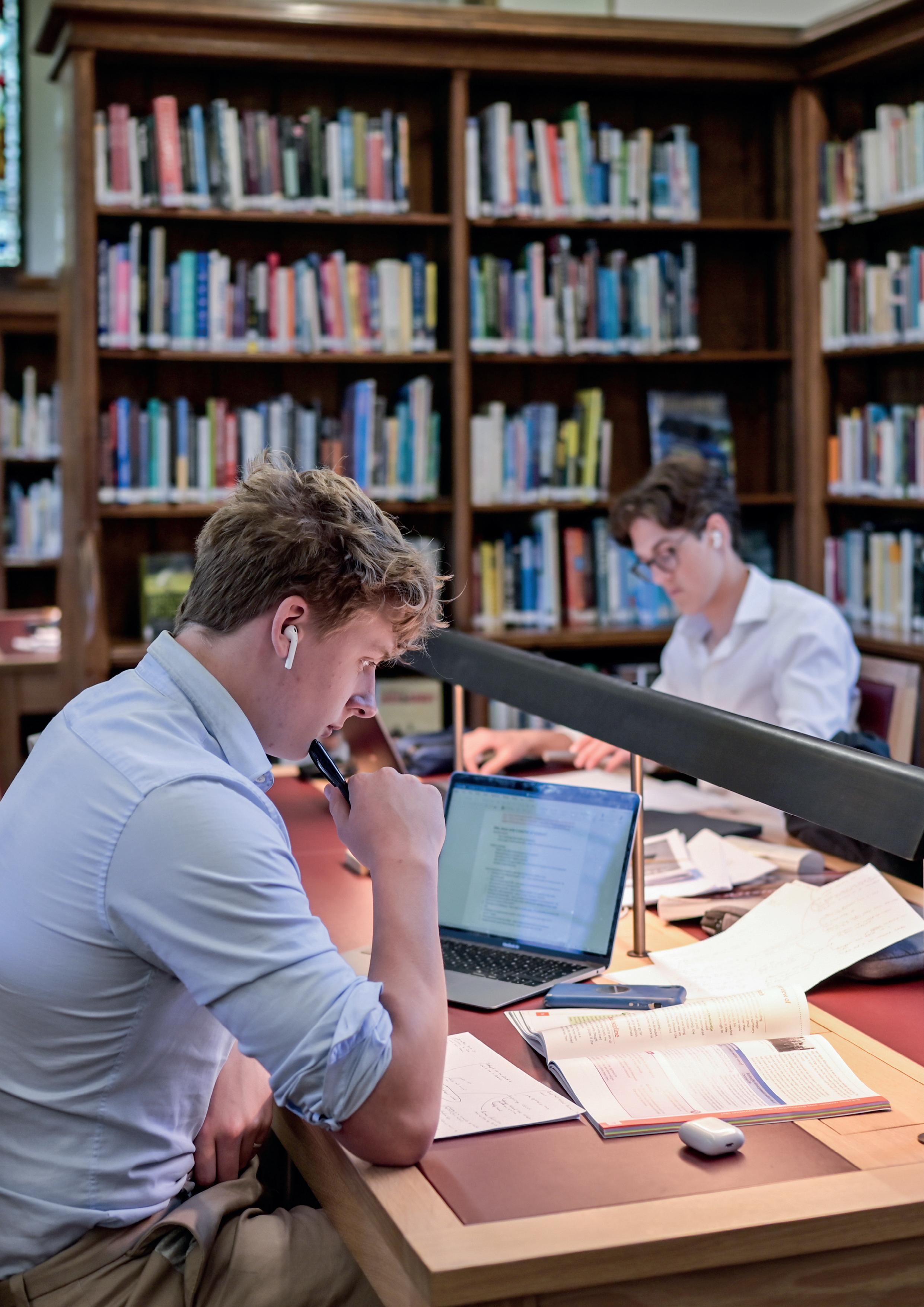
“The one big piece of advice I would give to anyone joining in the Sixth Form is to throw yourself into everything and take advantage of every opportunity. These next two years for you will go so quickly - it feels like yesterday since I joined. So really maximize the time that you spend here.”
The Sixth Form Curriculum
The Sixth Form programme centres around three main subject choices. Occasionally, and by individual agreement, we are able to arrange for a boy to take a fourth subject off-timetable (e.g. if a boy is fluent in a second language), or for a pupil to take fewer than three subjects, but the overall curriculum is built around three choices. In this regard, BTECs and A Levels are completely interchangeable – i.e. you can take up to three of either course. Supplementing your three options, everyone also studies PSHEE (Personal, Social, Health and Economic Education) and one or more enrichment subject.
The overall structure is as follows:
° 1st choice A Level*
° 2nd choice A Level*
° 3rd choice A Level*
° Wellbeing (PSHEE)
° Enrichment option(s)
° Study Periods
* One or more of these A Level options may be replaced with a BTEC alternative.
There is one exception to this pattern which applies only if you want to take Further Mathematics A Level. Further Mathematicians may take FM as a fourth A Level on two conditions:
a) That you pick Mathematics as one of your three main A Level choices;
b) That you accept that you will be able to choose from a more limited range of enrichment options. This is because FM sits within the enrichment structure and not in the main curriculum blocks.
A block system operates at A Level. When you make your choices you will be asked to rank them in order of preference (1 to 3). You will also be asked to select a reserve choice too. After you have made your choices all subjects will be allocated to one or more of the timetable blocks. Although we try to offer you as much choice as possible and will make every effort to accommodate your choices, timetabling constraints mean that it might not be possible to offer every combination of subjects. In a given year, if we cannot offer the three A Level subjects you have chosen, we will try to give you your reserve choice. If we have to do this, you will have an interview with the Deputy Head (Academic) beforehand, who will explain what option combinations are available to choose from.
Once your initial choices have been made, the timetable blocks will be fixed. Should you wish to change your choices after this point, it is still possible but you will only be able to do so within the blocking system that has been devised, and subject to there being space available in that subject. Therefore, your initial choices need to be as accurate as possible.
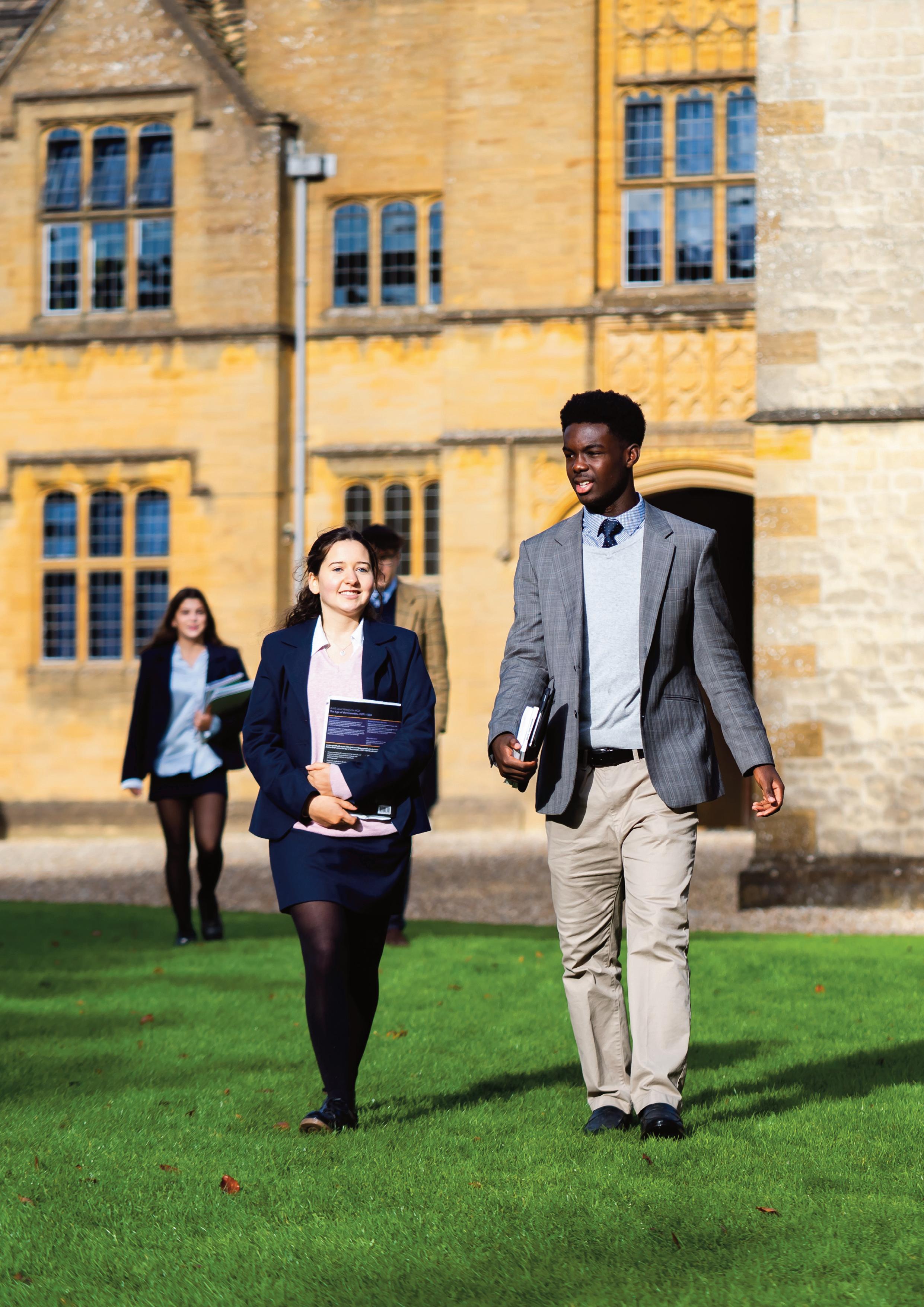
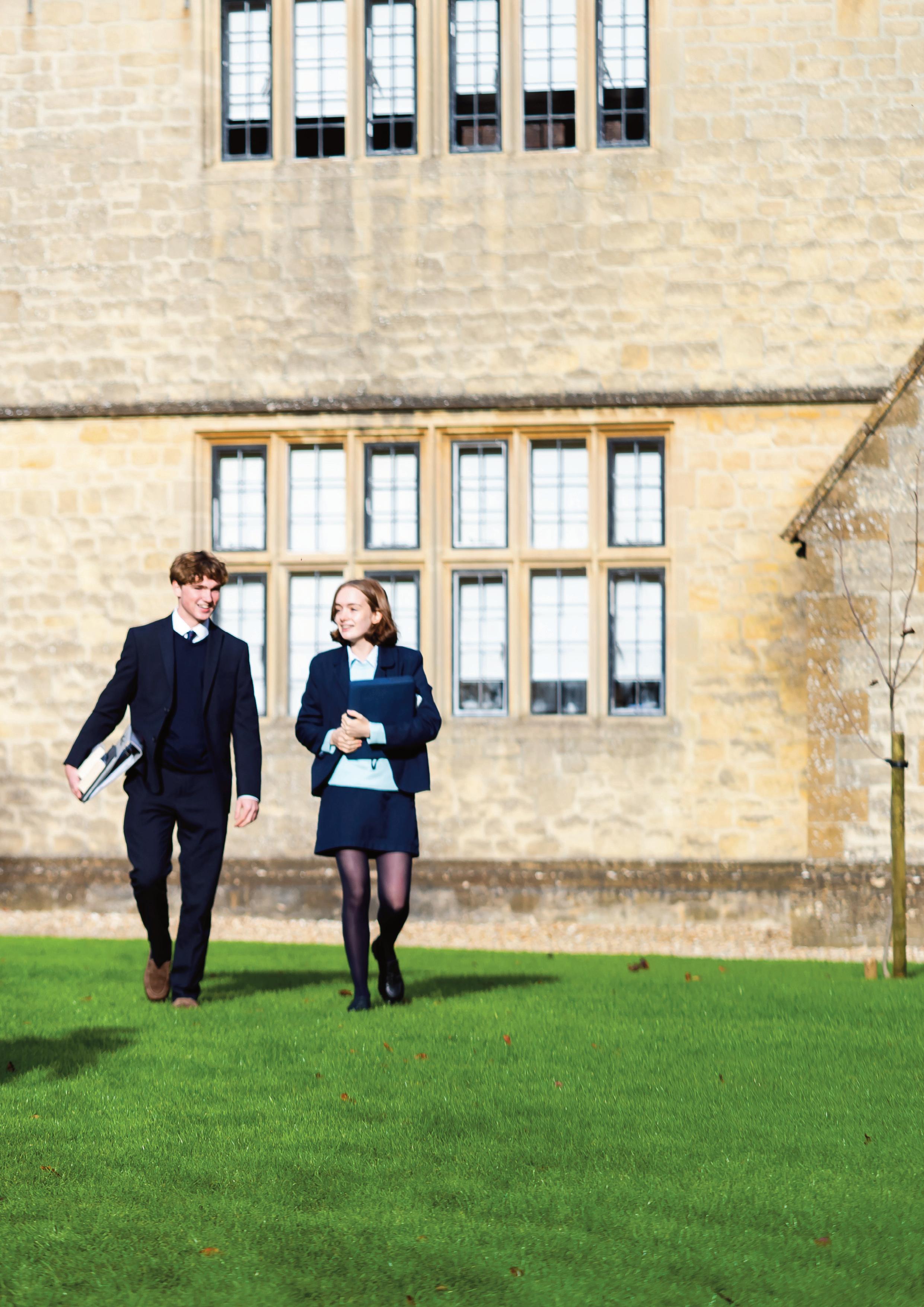
Notes:
• Whilst correct at the time of print (July 2025), the School reserves the right not to offer a particular course if there is insufficient demand to justify a viable set.
• A review of all Sixth Form courses is scheduled for late 2025. At the time this booklet was printed (July 2025) details of the nature and duration of the review were pending. The School is committed to continuing with the listed courses, but would ask for your understanding if the review affects the nature of subjects offered.
• Drama is taught at Sherborne Girls and space on this course is limited. Because timetabling of Drama is overseen by Sherborne Girls, it may not be possible to timetable Drama with everything else you wish to do. Therefore, if you are interested in taking Drama you must contact our Deputy Head (Academic), Dr Filtness, before selecting it to enable him to explore availability and to resolve any potential timetabling issues.
• If you are considering picking two or three BTEC courses, please read the next page very carefully.
• Boys fluent in a second language may explore the possibility of taking an A Level in this language in addition to their three subject choices. If this is relevant to you, please discuss this possibility with Dr Filtness and Mrs Thurman, Director of Teaching and Learning, before making your options choices.
• It is perfectly fine to study Business and Economics together. Similarly, Business and E&E BTEC or Economics and E&E BTEC work well in combination.
Courses on offer: A Level or BTEC
You can study two different types of qualification in the Sixth Form: BTECs and A Levels. All Shirburnians choose three options for their Sixth Form studies and you can pick either a programme that contains only A Levels, one that just incorporates BTECs, or a combination of both types of course. A Levels offer the ‘traditional’ route into university and, from that respect, are tried and tested. However, as with A Levels, BTECs have been extensively reformed over recent years and are now a very popular and wellrespected alternative to A Level study. Where A Levels tend to focus on the academic subject itself, BTECs are much more applied, focusing more on actually doing that subject in a work environment. As such, they emphasise skills, especially those needed for work, or to progress to university: indeed, UCAS highlights that over a third of pupils enrolling on undergraduate courses in September 2021 had studied either BTECs only, or a mixture of BTECs and A Levels in the Sixth Form. Because of this focus on applied knowledge, a number of employers have begun to express keen support for BTECs (e.g. the Army) and their popularity has grown rapidly: there was a 300% increase in the number of pupils studying BTECs last year and a number of high profile independent schools already offer BTECs alongside A Levels.
Similar to the EPQ, BTECs can be studied at different ‘levels’. However, we are only offering BTECs at level 3 national extended certificate level because this is exactly equivalent to A Level, both in terms of the time required to complete the course and the ‘value’ of the grade achieved at the end.
Key elements of the A Level and BTEC courses are listed below:
A Level
° Terminally examined – i.e. all of your exams happen at the end of your Upper Sixth
° Graded A* - U
° No re-takes available
° Large syllabus content
° Emphasis on comprehension, and theoretical application of concepts
° Assessment is predominantly through written examination/s, although practical subjects have some internally assessed components
° Accepted by all universities
° 360hrs of teaching per year
BTEC
° Exams available in Lower and Upper Sixth and some units are available both in winter and summer exam seasons
° Graded Pass, Merit or Distinction
° Re-takes available
° Smaller syllabus content
° Emphasis on skills and practical applications of concepts
° Assessment is a mixture of written examination/s, and internally assessed components, including coursework, presentations etc
° Accepted by the majority of universities
° 360hrs of teaching per year.
Examined Enrichment
Though enrichment is not mandatory, all pupils are strongly encouraged to consider taking either an EPQ or one of the examined courses below. The option you pick is up to you. Most boys choose to pick one enrichment course though, where the timetable allows it, you may be able to pick two. You’ll be asked to choose your enrichment option/s alongside your subject choices in February. However, you can change your mind at the start of September.
Examined Enrichment Options
Art
Explore your creativity through a visually challenging and diverse course that will tease the very best out of you creatively, critically and contextually. You will be taught by teachers from a variety of specialisms and have access to facilities that will stretch your abilities in the more traditional skills of drawing, painting and printmaking, whilst also enabling you to expand your knowledge in digital manipulation and darkroom experiences. Depending on your preferences and willingness to give up your free time, this course leads either to the full Art A Level or provides an opportunity to take your art further without the need to complete an exam – it’s up to you!
Core Maths AS
In this option boys study the analytic, logic and problem-solving disciplines developed in AQA Level 3 Certificate in Mathematical Studies (Core Mathematics) course. It’s usually completed in a year and complements the essay-writing and generic research skills developed in other subjects. In the world today, it is a great advantage to be able to communicate mathematically and foster a strong understanding of statistics in the everyday world.
The Core Maths course will be taught within four lessons per week, with two examinations at the end
of the Lower Sixth. Paper 1 covers three main topic areas: analysis of data, personal finance and estimation.
Most of the mathematical content will be a review of the GCSE course with one or two new styles of data representation and a much more in depth look at financial mathematics than pupils will have come across in any previous studies.
Paper 2 is predominantly statistics, including the normal distribution, correlation and regression. Additionally, the depth of understanding of this mathematics and a focus on analytic skills ensures a stronger support for other A Level choices, in particular Geography, Biology and Psychology
English
Language AS / A Level
In this course we ask such questions as, Why do we talk the way we do? Are we selling something? Gaining status? Exercising power?
How do we go about persuading people? Do men and women speak differently? Should we even be asking that question in the 21st century? You’ll learn how linguistic theorists, sociologists and psychologists approach these issues, and how to write about them for a more general audience. For AS, you will have a chance to analyse an extraordinary range of texts, from nit-comb ads to TV reviews, and even a letter of apology from the Government. There are units on Language and Power, and Language and Gender. For those who take the subject to A Level, there’s an opportunity to learn about how children learn language, how language has changed over the centuries, and to study a dimension of language that’s entirely up to you – the choice of coursework options is amazingly free, and the board approves almost all projects, from the representation of women in hip hop to how tabloids present Brexit.
Greek AS / A Level
An A Level in Classical Greek will reveal to you, if it has not done so already, the advanced foresight of the Greeks, who, by the end of the 5th century BC, were questioning the power of the gods in the realisation that mankind was now ‘the boss’, an insight not too distant from our own view that mankind is the most dangerous thing on the planet and that the fate of mankind lies in our own hands. It provides you with the opportunity to read and explore some of the greatest playwrights, philosophers and historians. As with Latin, you will also develop your understanding of language structures, you will write compositions in Greek and you will begin to appreciate the beauty of this ancient language. Classical Greek is not for the faint-hearted: it possesses a rigour beyond that of most other subjects, but the sense of satisfaction of unravelling a passage of complex Greek is immense.
A Level Greek comprises four examined papers: two language and two literature. Your studies will include practice in unseen translation and comprehension, as well as composition, and most importantly and enjoyably the study of a number of classical authors. You will read a selection from Homer’s Odyssey, an epic poem of ‘extraordinary pleasures: it is a saltcaked, storm-tossed, wine-dark treasury of tales of terrifying monsters and inscrutable queens, a poem that takes you down to the coldly echoing chambers of the dead and back up to the coves and cliffs and winding paths of Ithaca. A poem of many twists and turns, like life itself.’ (Charlotte Higgins). As mentioned above, Classical Greek is not for the faint-hearted. Or, depending on your teacher, a selection from Sophocles’ Ajax, a psychological play of the trauma of war, in which the warrior Ajax is driven mad when the armour of Achilles is given to Odysseus, and not to him.
Modern Foreign Languages
Continuing with a language in the Sixth Form adds an extra dimension to a Sixth Former’s academic portfolio. Universities value language studies and taking language modules in degree courses is becoming more popular, so this option will suit all Sixth Form pupils no matter the academic course being followed. British businesses want linguists and prize cultural awareness.
French, German and Spanish are all available as examined enrichment courses. If you opt for this, you will study the subject for one year and then take the internationally-recognised European languages B1 test at the end of the Lower Sixth year: DELF (French), DELE (Spanish) Goethe Zertifikat (German).
The one-year DELE/DELF/ Goethe Zertifikat course develops your spoken and written fluency in the language. The courses are predominantly skills-based, with an emphasis on language useful for work, study or travel. Small classes with an emphasis on communication, interaction, exploration and enjoyment make an enrichment in MFL an attractive offer open to all Sixth Form pupils. This has been particularly popular with future medics, vets and engineers.
For those with a Mandarin GCSE or prior knowledge, the HSK Mandarin course is available. It is taught jointly with Sherborne Girls and, depending on popularity, may be taught either at Sherborne Boys, Sherborne Girls or jointly by both schools. It is available at different levels according to ability and linguistic knowledge. Pupils take a certificated exam at the end of the course.
There are also opportunities to study Italian B1 (PLIDA) and beginner-level Japanese at Sherborne Girls. These options require private tuition and, therefore, a charge is levied per lesson. Pupils interested in studying Russian should speak to Mrs Thurman, Director of Teaching and Learning.
Extended Project Qualification (EPQ)
It is possible to take an EPQ and an examined course, so please don’t worry if you would like to do both. The Extended Project Qualification (EPQ) project is a fantastic opportunity to research something you are interested in: your EPQ can literally be about anything you like. Doing the EPQ also helps you to develop project management, communication, and analytical and evaluative research skills that are essential for success at university and in most forms of employment.
The EPQ is a stand-alone qualification completed during the Lower Sixth. It is worth more than half an A Level and you’ll finish up with a grade somewhere between A*-E (hopefully the former). The EPQ project itself usually takes the form of a 5000-word essay exploring a question of your choosing, but could also be an experiment, writing a piece of music, or producing some other artefact. That’s exciting because it means you can base your EPQ on any topic you like (as long as it is suitably different from something you’ve been taught in lessons).
Whilst your product (essay or artefact) might seem the most important aspect, actually the bulk of the EPQ –and most of the marks – go for the processes involved with planning, researching, evaluating and developing your EPQ. This is also why universities like the EPQ: it
teaches you to be resourceful, to synthesise and evaluate information from multiple sources, to manage deadlines and to work independently – all essential skills for success at university. Many universities recognise the value of the EPQ by building it into their offers, for example, for many courses, Southampton, Manchester, and Bath will make a reduced offer of one grade if you achieve an A on the EPQ, so an offer of AAB would be ABB. Other universities, for example Durham, will take the EPQ into account when they have to decide between applicants with similar profiles. Another benefit of doing the EPQ is that you’re likely to end up with a better result at university. Even if you did the EPQ and got the same A Level grades as someone else who didn’t do the EPQ, you’re more likely to achieve a top degree result. More recent research shows that there is even a positive impact on how you would do on your A Levels.
Although your EPQ is the result of your independent work, you won’t be left completely on your own. You’ll have lessons on the skills you need and you’ll have a supervisor who will guide you through the process. At the end you will present your work to the School community and family and friends.
Wellbeing
Wellbeing lessons allow pupils to explore core themes as part of the PSHEE (Personal, Social, Health and Economic Education) curriculum in more detail. There is also a focus on later life and opportunities to develop core life skills and support with beginning their Post-18 pathway applications. The units that are covered include:
Lower Sixth Topics
° Pathways
° Living in the Wider World
° Relationships
° Exploring Right and Wrong
° Wellbeing and Personal Safety
° Finance
These units will address important key skills and knowledge to help them progress to the next stage of their education and in later life.
Lessons in the Lower Sixth are supplemented by a cohesive lecture programme that covers practical first aid, relationships, wellbeing and support with the Post-18 pathway process.
“I think the good thing about the Careers Department is that no matter what your goal is, they'll support you in that. So be proactive and try to seek that help because all the opportunities and support are here for you.”
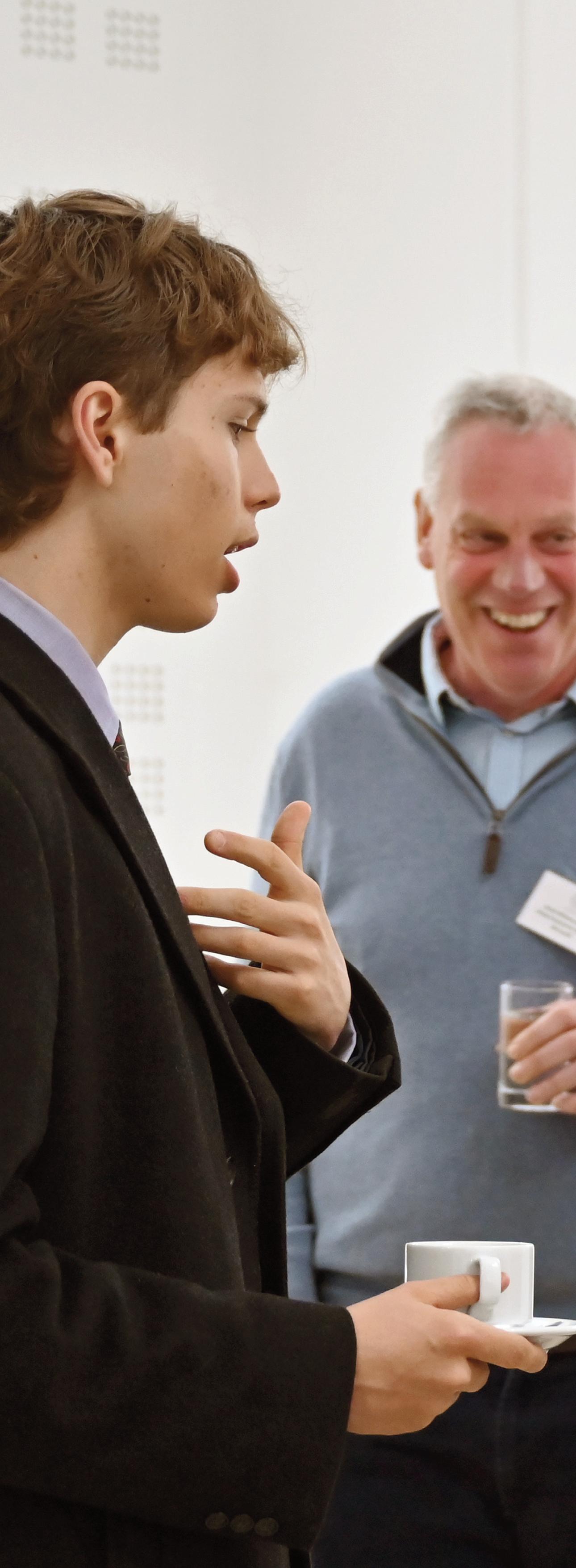
The Upper Sixth
In the Upper Sixth, pupils continue to receive lectures covering a range of topics, with a primary focus on preparing pupils for the next stage of their lives. We recognise that the academic demands will intensify significantly, whether pupils are studying A Levels, BTEC qualifications, or a hybrid of both courses.
Post-18 Applications and Support
Pupils will be completing their Post-18 applications during this crucial year and will receive comprehensive support from multiple sources:
° Their Housemaster
° Their Matron
° Their Tutor
° The Careers and Pathways team
° All subject teachers
We are committed to ensuring that students have absolute clarity about the entry requirements for their chosen Post-18 pathway, and that they receive the appropriate level of support to achieve these requirements.
Pupils Leadership and Self-Direction
At this level and age range, it is essential that pupils take ownership of their learning journey. While comprehensive support surrounds them, the work must ultimately be completed by the pupils themselves. They need to be leading themselves towards meeting their entry requirements.
Pastoral Care and Support
Pastoral support continues to be a cornerstone of the Upper Sixth experience, with Housemasters and Matrons playing a key role in the boys' lives, providing guidance and care as they navigate this important transition year.
Embracing School Life and Independence
We want our pupils to fully enjoy their final year at school - participating in clubs, societies, music, and sport, while maintaining an active social life. This includes interactions with pupils from Sherborne Girls, going to the gym, trips into town, and enjoying coffees with friends. We recognise that Upper Sixth pupils are making the crucial bridge between school and university life.
Our Commitment as a School
What we will do exceptionally well is provide our Upper Sixth pupils with:
1. Accountability - Ensuring students remain on track through regular monitoring and check-ins
2. Self-Regulation Skills - Developing the ability to manage their own learning and progress independently
3. Self-Belief - Fostering confidence in their abilities and potential
4. Peer Support - Encouraging pupils to support one another, creating a collaborative environment where they help their friends and peers make good choices and hold themselves accountable to deliver on those choices
5. Independence and Future-Facing Skills - Helping students develop the independence and skills they need to thrive in the world beyond, preparing them for the demands and opportunities of the mid-21st century
This holistic approach ensures that our Upper Sixth pupils are not only academically prepared but also equipped with the personal skills, independence, and well-rounded experiences necessary for success in their chosen Post-18 pathways and beyond.
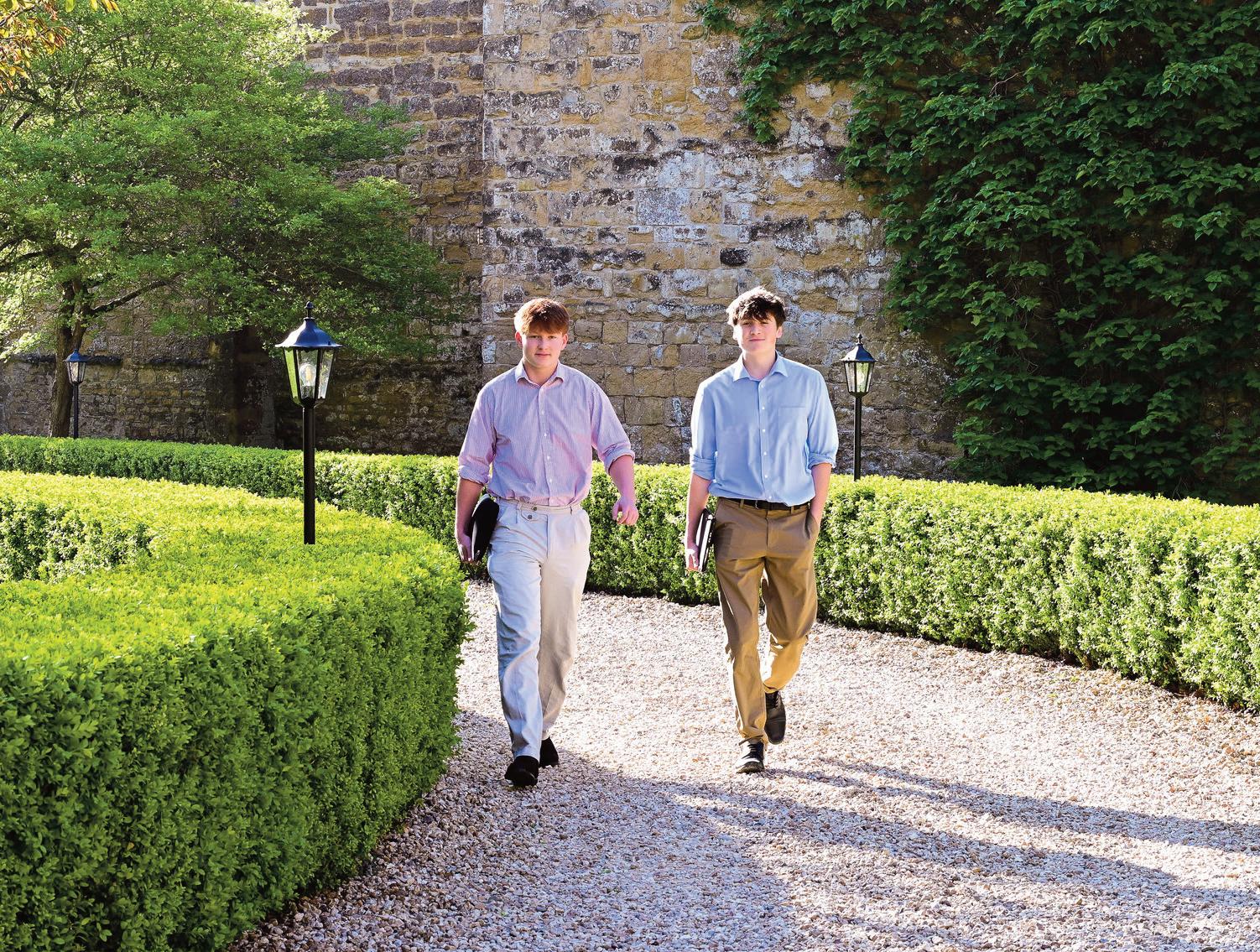
Guide to Making Good Choices
For lots of reasons it is really important that you pick three subjects that are appropriate, sensible and realistic. Broadly, there are three main topics you should explore when you start to consider which A Levels and BTECs are right for you. These are:
1. The Future - This relates to transition to university Post-18 pathways and the world of employment beyond that. In particular, an awareness of informed choices, a guide to A Level subjects considered essential, or important for certain university courses, is crucial.
2. The Package - You should view your A Level/BTEC choices as parts of a meal. Individually, they’re OK, but when combined sensibly you produce something special. Additionally, not everything goes well with everything else! It is also important to realise that, by following the A Level/BTEC route into Higher Education, you are opting to become a specialist. Therefore, you should pick subjects that support each other. Don’t pick subjects that are varied simply to ‘keep your options open’ or to provide ‘balance’- much better to pick three things that are right for you, will reinforce each other and add weight to your UCAS application.
3. Yourself - It’s a cliché, but everyone is unique. This means that there will be subjects that you are better at, subjects that you truly enjoy, and subjects that you would do well to leave behind at (I)GCSE. In order to pick subjects that fit well with your aptitude and character you need to reflect on your own strengths and limitations (be honest!) and also to know what the A Level/BTEC courses involve.
Other questions to ask include:
° How comfortable are you with Maths? There’s quite a lot of it in some subjects…
° What is your (I)GCSE target in that subject?
° Does coursework play to your strengths?
° Are you organised? Are you the kind of person who likes working in Art/DT/Music at weekends?
° Do you read? Some subjects have a lot of reading associated with them; not just English!
° How much work is expected outside of the lessons?
° What kinds of skills are assessed? Do you need to analyse, evaluate, explain, argue etc?
° Are there any marks for contemporary knowledge or things that have happened recently in the news? If yes, this means you’ll need to be regularly watching the news or reading a periodical like The Economist.
° How much practical work is there?
° How much theory do you need to learn? How difficult is this?
° What do people say is the hardest part of this subject?
When picking options, do:
° Think about your strengths and aptitudes
° Pick subjects that go together
° Look at your Centigrade feedback
° Find out what each subject involves
° Find out what employers look for
° Pick things in-line with your (I)GCSE Target Grades
° Choose subjects that are assessed in a way you’re comfortable with and that play to your strengths
° Check that your A Level/BTEC choices meet university course requirements
A LEVEL AND BTEC COURSES



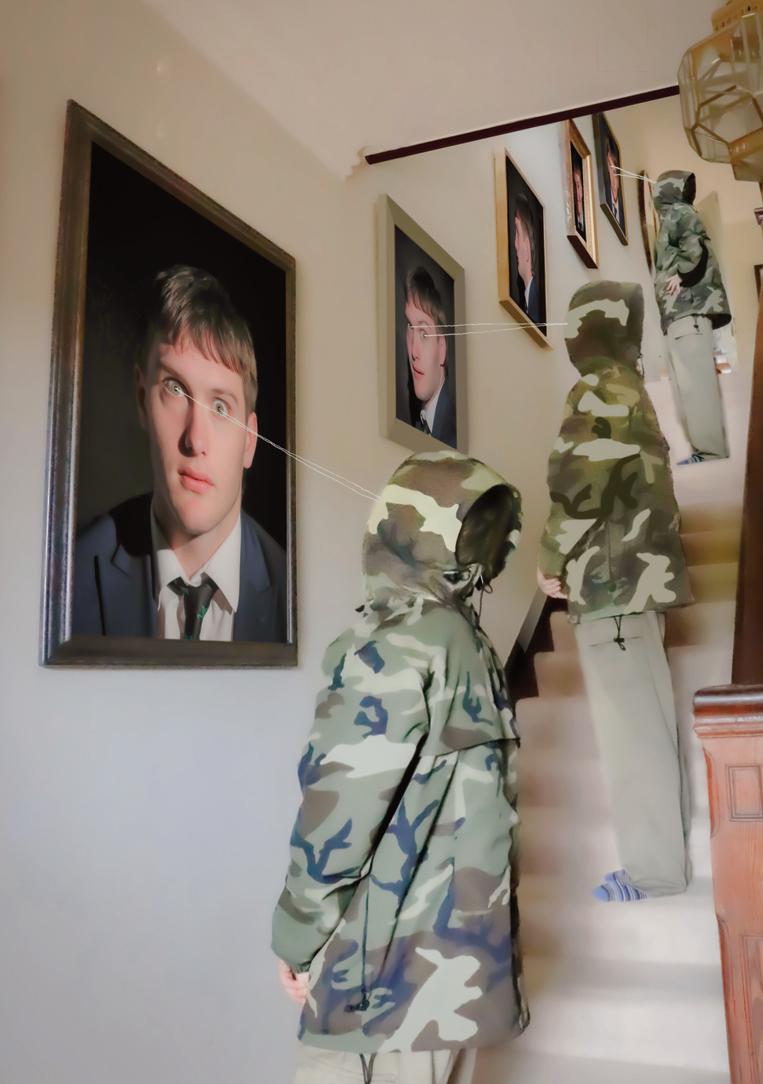
ART & DESIGN
Are you creative and imaginative? Do you enjoy exploring ideas and looking at things in different ways? If so, you should consider A Level Art & Design. Art & Design is about looking, learning, thinking and communicating. You will enjoy developing your understanding of the visual world, learning practical skills and responding to ideas and issues in ways that are personal to you.
What is the course content?
Art & Design offers opportunities to use your creativity to express yourself. You will develop your understanding of creative processes, your ability to observe and to think, to solve problems and to communicate in a visual way. It will enable you to work independently and to make your own discoveries by exploring ideas, other artists’ work and different materials and techniques. Art & Design gives you the skills and knowledge to create personal and imaginative work. If you have an adventurous, creative and enquiring mind and are excited by shaping and determining the visual world around us, there is a career opportunity waiting for you.
Pupils are required to work in one or more area(s) of Art & Design, such as those listed below. They may explore overlapping areas and combinations of areas:
° Drawing and painting
° Mixed-media, including collage and assemblage
° Sculpture
° Ceramics
° Installation
° Printmaking (relief, intaglio, screen processes and lithography)
° Moving image and photography
How is the course assessed?
AQA A Level Art & Design: Fine Art
At A Level for component 1 you will develop work for a personal investigation into an idea, issue, concept or theme supported by written material. This will count for 60% of your total A Level marks.
In component 2 you will produce personal work in response to one of eight exciting starting points which will count for 40% of your total A Level marks.
What else should I consider?
A Level Art & Design is a practical course in which you learn by doing, so you will be able to create imaginative personal work. You will find out about a whole range of media, techniques and processes. You will develop your creativity and independent thought, learn to express yourself visually and let your imagination flourish. Art & Design is a great companion to all other subjects as creativity, imagination and problem-solving skills can give you great ideas for your other subjects.
Pre-course material
To help you decide whether you should choose A Level Art & Design perhaps consider working on observational sketching skills to develop and refine techniques, with a view to communicating using visual language. If you initially struggle with this, perhaps consider other avenues to record the world around you such as photography, or filmmaking.
In addition, every opportunity to visit a museum or gallery should be relished to acquire a broader understanding of the world of art and its significance to us culturally.
BIOLOGY
Cambridge International Biology A Level offers a captivating and comprehensive study of the living world, making it an enticing subject. It delves into the intricate workings of organisms, exploring topics such as genetics, evolution, ecology, and human physiology.
What is the course content?
Year 1 – AS Level
° Cell structure
° Biological molecules
° Enzymes
° Cell membranes and transport
° The mitotic cell cycle
° Nucleic acids and protein synthesis
° Transport in plants
° Transport in mammals
° Gas exchange
° Infectious diseases
° Immunity
Year 2 – A Level
° Energy and respiration
° Photosynthesis
° Homeostasis
° Coordination and control
° Inheritance
° Selection and Evolution
° Biodiversity, Classification and Conservation
° Genetic technology
How is the course assessed?
CAIE Biology A Level
Exams in Lower Sixth
° Paper 1 Multiple Choice (15.5% of A Level)
° Paper 2 Structured Questions (23% of A Level)
° Paper 3 Practical Skills Assessment (11.5% of A Level)
Exams in Upper Sixth
° Paper 4 Structured Questions (38.5% of A Level)
° Paper 5 Planning, Analysis and Evaluation (11.5% of A Level)
What else should I consider?
Entry Requirements
The specific entry requirements for A Level Biology is generally a grade 7 or above in Biology GCSE, or Grades 7-7 in Double Award GCSE Science.
It’s obviously useful to have a strong curiosity about the natural world, an interest in biological processes, and an enthusiasm for scientific inquiry.
Subject combinations
There are several complementary subjects that can work well with A Level Biology. Chemistry is often considered a natural pairing as it provides a deeper understanding of biological processes at a molecular level. Additionally, subjects like Mathematics can be advantageous for dealing with statistical analysis and calculations involved in biological research. Other subjects such as Psychology, Physical Education and Geography (Environmental Science) can also offer valuable interdisciplinary perspectives.
Pre-course material
Platforms like Khan Academy and Seneca Learning offer online courses that cover Biology topics at the A Level. Websites like PhysicsAndMathsTutor, SaveMyExams, S-cool, and Biology Online provide concise explanations, diagrams, and interactive resources covering various Biology topics.
The A Level Business course introduces you to the theories of business management and factors that influence business operations and strategy. It does not teach you how to run a successful business but provides a framework to understand why some firms succeed and others fail.
It is a topical course - looking at how Businesses adapt to change: e-commerce, pandemics, inflation, Brexit, and a dynamic political landscape. The first year considers how the different functions of a business interact with each other - the second year focuses on business strategy and Globalisation. Inevitably, numerical skills form a significant part of the assessment, though the skills taught are practicalanalysing financial data to assess business performance. Essay writing is another skill you will need to develop - accounting for a third of the final assessment.
What is the course content?
The course is split into four themes:
Theme 1 - Marketing and people
1.1 Meeting customer needs
1.2 The market
1.3 Marketing Mix and Strategy
1.4 Managing people
1.5 Entrepreneurs and leaders
Theme 2 - Managing business activities
2.1 Raising finance
2.2 Financial planning
2.3 Managing finance
2.4 Resource management
2.5 External influences
Theme 3 - Business Decisions and Strategy
3.1 Business Objectives and Strategy
3.2 Business Growth
3.3 Decision-making techniques
3.4 Influences on business decisions
BUSINESS ¥ £ $ €
3.5 Assessing Competitiveness
3.6 Managing change
Theme 4 - Global business
4.1 Globalisation
4.2 Global Markets and Business expansion
4.3 Global Marketing
4.4 Global Industries and Companies (multinational corporations)
How is the course assessed?
The Business A Level is a linear course - an assessment that includes three exams taken at the end of two years of study. There is no requirement to complete coursework. The exams feature a range of question styles: short answer questions, essay questions, data response questions and case studies.
What else should I consider?
A Level Business provides an excellent foundation for those interested in studying Business, Finance, or Management at university. The skills are transferable across a broad range of subjects and careers.
Pre-course material
There is a wide range of Business literature available; ‘Shoe Dog’ by Phil Knight and ‘Bezonmoics’ by Brian Dumaine provide accessible texts based on Nike and Amazon.
CHEMISTRY
Chemistry sits at the crossroads of many disciplines and is often called the Central Science. It is a stimulating subject in its own right, its aim being to explain, manipulate and mimic the material world around us. You will find the chemist peering into the nanoscopic world of individual atoms and predicting their behaviour using powerful computers; or developing new, non-polluting power sources; perhaps inventing novel polymers to be used in technology and medicine; and even synthesizing new and complex molecules that imitate the natural substances found in biological systems. The A Level course will allow you to understand the world at a more fundamental level, giving you an insight into the practical applications of the subject, valuable training in the scientific method, and developing transferrable skills that are prized by universities and employers alike.
Your suite of A Levels goes a long way to deciding your university and career pathways; Chemistry is welcomed by all subjects and employers. The chemist is trained to problem-solve and to analyse data, looking for patterns: these skills are often considered invaluable, and many Chemistry graduates end up working in law, the financial services and management as a result.
What is the course content?
The course builds on material studied at (I)GCSE, with the Upper Sixth, in turn, building on AS material. You will initially be familiar with the concepts being studied, but we will quickly expand on these as the course progresses.
Lower Sixth Form topics include atomic structure and the periodic table, bonding and structure, redox chemistry, groups 1 and 7, moles, alkanes, alkenes, alcohols and halogenoalkanes, analytical techniques, energetics, kinetics and equilibria.
Upper Sixth Form topics include equilibria II, kinetics II and energetics II, acids and bases, redox II, transition metals, further organic chemistry, analytical techniques II and synthetic pathways.



How is the course assessed?
We follow the Pearson Edexcel Level 3 Advanced GCE in Chemistry specification (9CH0). All candidates must pass a practical competency component (this runs over the two years and involves carrying out 16 practical assignments – this is a pass/fail component, no one has ever failed!) and a series of terminal exams in June of the Upper Sixth comprising:
° Paper 1 – 1½ hrs – physical and inorganic Chemistry – 30% of final score.
° Paper 2 – 1½ hrs – physical and organic Chemistry –30% of final score.
° Paper 3 – 2½ hrs – general and practical principles of Chemistry – 40% of final score.
What else should I consider?
The single most important Chemical proficiency is a capacity for hard work, by reviewing material you find difficult and being proactive when you need help. Hot on the heels of these, and shown to be very helpful, is a good (level 7) Chemistry (I)GCSE as well as a good (level 8) GCSE Maths qualification.
Co-curricular opportunities include weekly academic support sessions, Oxbridge preparation groups and Chemistry symposiums.
Pre-course material Chemguide offers an excellent idea of the level required: https://www.chemguide.co.uk/
As does Seneca; perhaps try some of the earlier questions on atomic structure: https://app.senecalearning.com/classroom/course/52 85ba4d-414f-49ab-9b1e-69f3336d5002
CLASSICAL CIVILISATION
Focusing on the civilisations of Greece and Rome, this wide-ranging subject involves discussions that are directly relevant to today’s world and covers the study of literature, art and ancient thoughts and ideas.
As well as classical knowledge, you will acquire transferable skills such as analysing sources and developing independent, critical and evaluative approaches. You will learn to formulate and support an argument and develop a valuable understanding of unfamiliar cultures.
Pupils enjoy discussing of classical life and thought, and the impact of the Greeks and Romans upon society. Questions discussed in lessons also arise in other subjects: What is heroism? What role does fate play in our lives? How should a man treat a woman (or vice versa)? How do we perceive beauty? What is art?
All of this makes Classical Civilisation an excellent way to develop a range of skills for further study of Classics, Drama, English, History, History of Art, Philosophy and Ethics and to support other academic interests. Since Classical Civilisation is so broad in its reach, it sits very comfortably alongside many other subjects including History of Art, Drama & Theatre, English and Religious Studies.
What is the course content?
The World of the Hero - explores both the Greek and Roman epic, with the study of Homer’s Odyssey and Virgil’s Aeneid.
Culture and the Arts; Greek Art - involves the study of visual sources – freestanding sculpture, architectural sculpture and vases. The 6th-4th centuries BC were a time of great change in the Greek world and this is reflected in the art that was produced.
Beliefs and Ideas; Love and Relationships - inspires thought-provoking and important discussions encouraging you to draw comparisons and make judgements about ideals and reality, and the nature of ‘right’ and ‘wrong’ ways to love or be loved.
How is the course assessed?
The exam board is OCR and assessment comprises of three written papers covering the below topics:
1. The World of the Hero - 100 marks / 40% of the total A Level
2. Culture and the Arts; Greek Art - 75 marks / 30% of the total A Level
3. Beliefs and Ideas; Love and Relationships - 75 marks / 30% of the total A Level
What else should I consider?
There is no requirement to have studied GCSE Classical Civilisation to take it for A Level and you do not need any prior knowledge of the Greeks or Romans (as all texts are studied in translation).
Pre-course material
We recommend that you start to engage with primary texts such as Homer’s “Iliad” and “Odyssey” and Virgil’s “Aeneid.” Complementing these with secondary sources like “The Cambridge Companion to Homer” will help offer critical insights.
Accessing academic journals through databases such as JSTOR and consulting structured study guides from Oxford University Press can also significantly enhance comprehension and retention.


COMPUTER SCIENCE
In the modern world, solutions that require inputs from Computer Science are increasingly ubiquitous. It is now a fundamental input into the success of most industries, from medicine, the entertainment industry and security finance. The recent advances in AI have the most profound change in the world that we’ve seen in our lifetimes, and it is the job of Computer Scientists to ensure that we have ethical, computational and mathematical frameworks in place that facilitate these technologies. In the A Level course, you will learn the fundamentals of all of these.
What is the course content?
The course comprises of the following key areas, designed to give a broad and academically challenging set of topics:
1 Fundamentals of programming
2 Fundamentals of data structures
3 Fundamentals of algorithms
4 Theory of computation
5 Fundamentals of data representation
6 Fundamentals of computer systems
7 Fundamentals of computer organisation and architecture
8 Consequences of uses of computing
9 Fundamentals of communication and networking
10 Fundamentals of databases
11 Big data
12 Fundamentals of functional programming
13 Systematic approach to problem solving
14 Non-exam assessment - the computing practical project
How is the course assessed?
° Paper 1 - 40% of the total mark for the courseThis paper tests a pupil’s ability to program, as well as their theoretical knowledge of computer science from subject content 1- 4. It is assessed by an onscreen exam lasting three hours. Pupils answer a series of short questions and write/adapt/extend programs in an Electronic Answer Document. One larger program is given to the boys to study as preliminary material.
° Paper 2 - 40% of the total mark for the courseThis paper tests a pupil’s ability to answer questions from subject content 5-12. It is assessed by a written exam lasting three hours. Pupils answer a series of short and extended answer questions.
° Non-exam Assessment (Project) - 20% of the total mark for the course - Additionally, there is a nonexam assessment which assesses a pupil’s ability to use the knowledge and skills gained through the course to solve a practical problem. Pupils will be expected to follow a systematic approach to problem solving, as shown in section 13.
What else should I consider?
Although we can accept exceptional pupils who have not studied the subject at GCSE, it is a huge advantage to have studied it. Those that have not will need to invest considerable time in developing core GCSE programming skills over the summer. There is a large proportion of the course that is highly mathematical and would favour pupils who think mathematically and enjoy solving puzzles and write code as a hobby.
Pre-course material
Understanding the Python content on https://www.w3schools.com/python/ would be highly advantageous.

BTEC
CREATIVE MEDIA TV AND FILM
Ever watched a film or television show and thought, I wonder how they do that, or I could make something better than this! If that’s the case, the Television and Film course at Sherborne offers you the opportunity to explore your creativity through the medium of digital film making.
Creative Media (TV and Film) is offered at National Subsidiary Diploma Level 3, which is equivalent to an A Level course, both in terms of the time required to study for it (720+ hours of lessons over two years) and the weighting it receives by universities. As with the other BTECs on offer, Creative Media is a modular course, offering a range of different options in Digital Film and Video Production, and Digital Content Production. The whole class will follow a programme of options within that discipline and will finish with a specialist BTEC qualification in this field. The optional modules consist of a variety of coursework projects, each of which explores a diverse range of TV and Film production and digital production techniques.
What is the course content?
Depending on your creative interests, you have the option of completing units in Film and Video Editing, Music Video Production, Single Camera Production (narrative film making), Factual Film making (documentaries), Advertising Production or Social Action and Community Media Production (Campaign Film Making).
The course covers a range of units adding up to 60 credits over the two years. Three mandatory units cover 20 credits, with the remaining 40 covered by the optional units.
How is the course assessed?
This course is 100% coursework, with all the work internally assessed before being externally verified by the exam board in year 2. A Creative Media BTEC offers a different style of approach to your Sixth Form: the flexible, unit-based structure provides you with much greater control and choice over what you learn.
What else should I consider?
The BTEC course offers clear higher education pathways and employment opportunities. Pupils who complete the course can go on to specialist courses at Ravensbourne University London, Bournemouth University, Falmouth University, Loughborough University and Oxford Brookes, amongst many others, and study: script writing, filmmaking, media production, digital film production, journalism, television, animation, games design, creative writing, editing and post-production and other specialist courses.
Pre-course material
The best thing anyone can do when embarking on a Creative Media course is to create original content from the off. If you are considering a career as a film maker, you need to make your own content. Everyone has a video camera to hand these days, so shooting interesting and original footage is no longer just in the hands of those with specialist equipment.
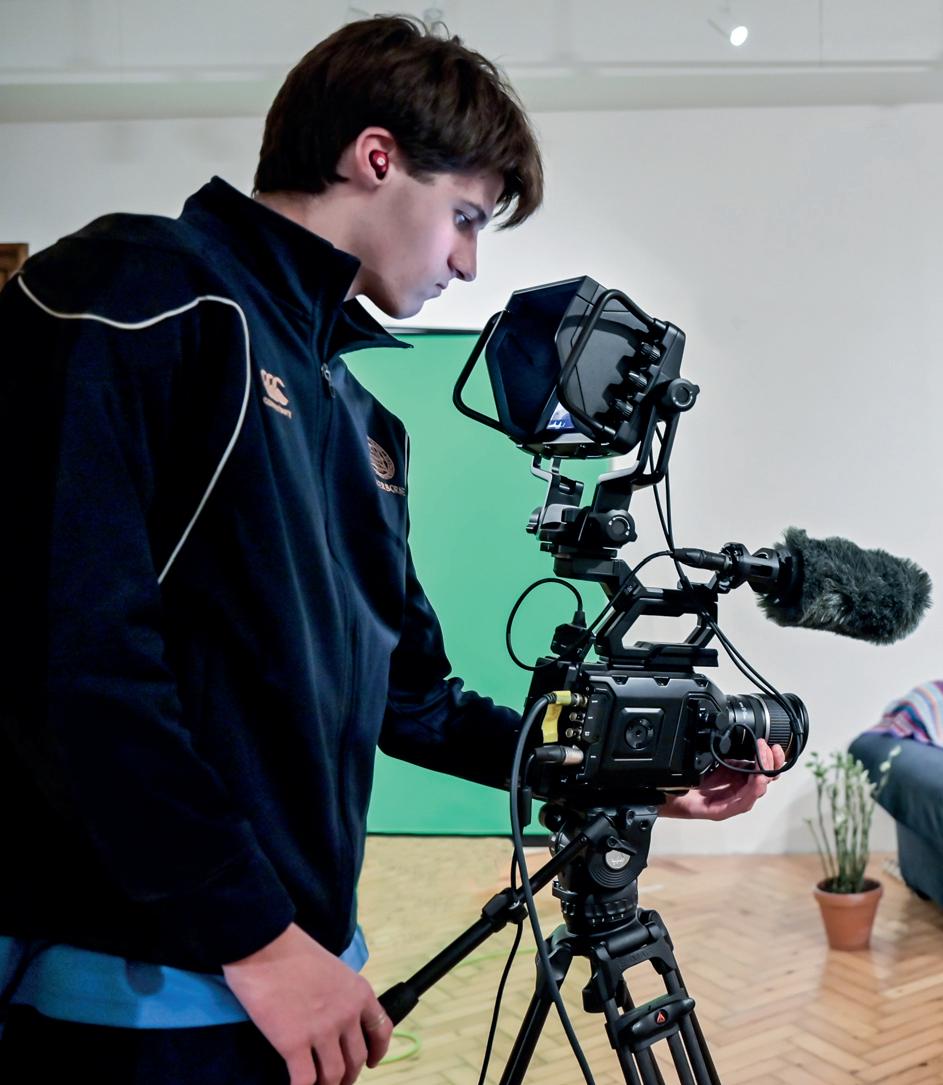
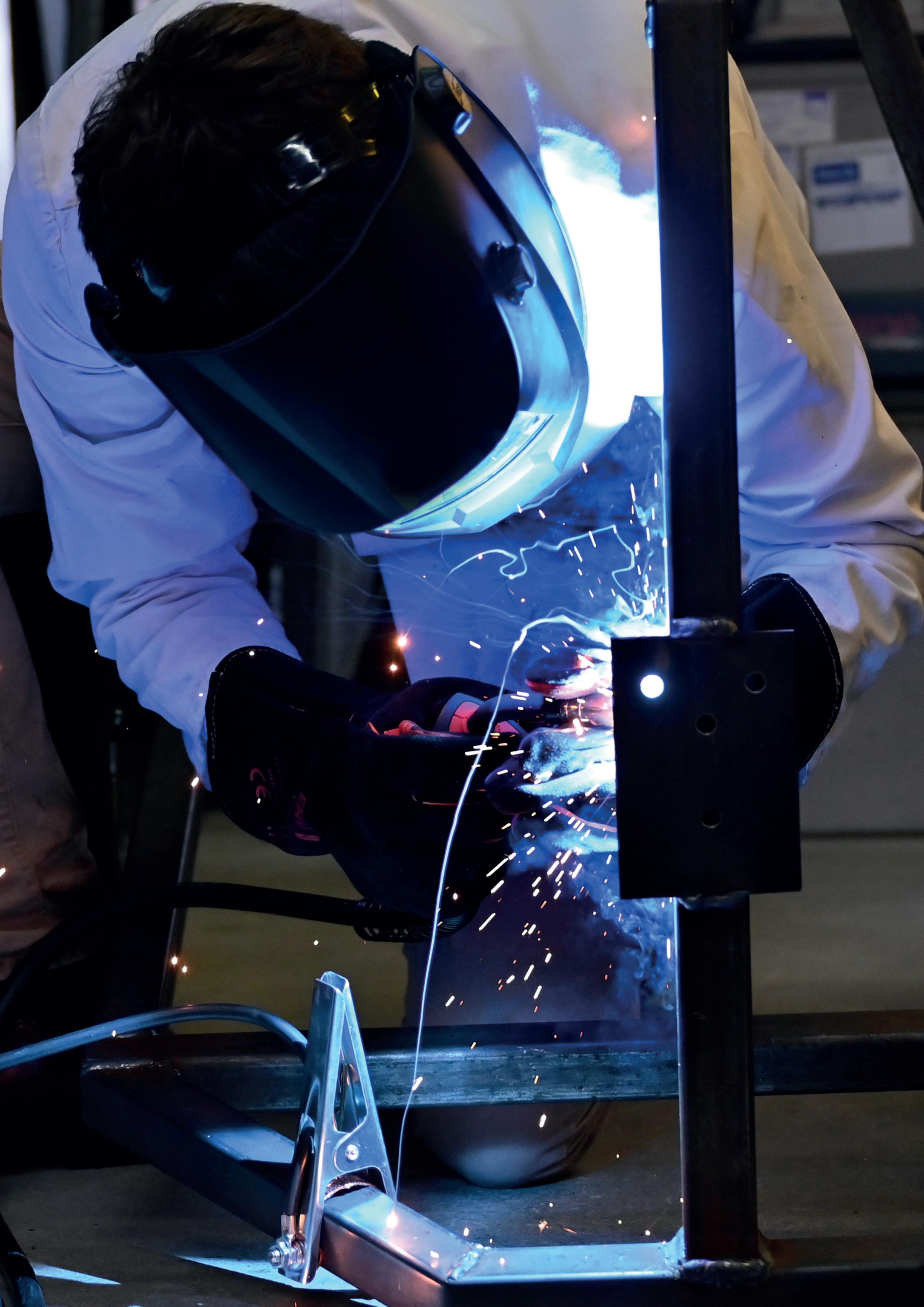
DESIGN & TECHNOLOGY: PRODUCT DESIGN
A Level Design & Technology: Product Design is a broad and engaging subject established to provide a vehicle to develop your creativity and innovation and to build an understanding of the built world around us. It is centred around identifying problems and creating solutions. It will help you develop confidence in analysing situations, thinking critically, and finding creative solutions to challenges. These problemsolving skills are highly transferable and applicable to a wide range of fields and industries. The subject involves practical, hands-on learning experiences that go beyond traditional classroom activities. You will get to work with various materials, tools, and technologies, enabling you to develop practical skills and gain a deeper understanding of the design and manufacturing processes. Product Design integrates elements of Science, Technology, Engineering, and Mathematics (STEM). It provides you with the opportunity to apply scientific and mathematical principles in practical contexts, fostering interdisciplinary learning. This can be particularly appealing to you if you are interested in STEM subjects and looking for a hands-on and creative approach.
What is the course content?
° An understanding of materials and manufacturing technology – what makes carbon fibre composite suitable for the hull and the foils of yachts such as the AC40 and how is it formed?
° An appreciation of how technology is applied to enhance design – You will learn to use ComputerAided Design to enhance your design development and consider the benefits and concerns relating to the application of robotics and AI in the workplace.
° An appreciation of the foundations of design and where technology is going – You will look back at the 20th-century design movements to appreciate their influence and then consider the materials that NASA is developing to be delivered to the Martian surface where they could transform into structures in response to its surface environment.
The NEA – an extended, assessed project
Over the two years, you will work with a client to develop a product to meet their needs, developing strong design communication skills in the process. You will take the design right through to production, developing a fully functional prototype to test with them. The staff in the Department will support you in doing so, and the NEA is a vehicle to practically reinforce the theory you have studied.
How is the course assessed?
The Department delivers the Edexcel Advanced GCE D&T – Product Design course [9DT0]. The theory represents 50% of the course, and this is assessed in a single, 2 ½ hr terminal exam [9DT0/01]. The remaining 50% of the marks come from an assessment and moderation of the NEA [9DT0/02].
What else should I consider?
There is a significant benefit to having studied D&T GCSE prior to taking on this A Level, as the GCSE introduces excellent foundation skills and knowledge, but it is not a requirement. Naturally, a pupil choosing to take on the A Level without the GCSE foundation would benefit from additional studies across the summer and in the Lower Sixth Form year to catch up.
Pre-course material
Our pupils develop a deep interest in technology. The Internet is awash with creative blogs and online magazines that bring the latest thinking, innovation, and design right into your email inbox. You should subscribe online to the architecture, interiors, and design magazine: https://www.dezeen.com/

DRAMA AND THEATRE
Drama and Theatre is a highly respectable A Level and is highly valued by many university admission tutors and employers. The balance of practical skills and academic knowledge, as well as a growing understanding of, and empathy for, the world around us, allows pupils to develop a wide range of skills and disciplines. It is one of the few subjects that is not based 100% on a written paper at the end of the Upper Sixth. This gives pupils the chance to work practically and attain 60% of their marks before the examination season. It provides an opportunity to spend lessons doing something creative.
Drama and Theatre is ideal for those who like to create work that questions assumptions, enjoy finding innovative ways of communicating with an audience, and, most importantly, enjoy performing. It is taught jointly with Sherborne Girls.
What is the course content?
Pupils study five different plays from different eras; learn to evaluate live theatre as a critical audience member and use this to inform their own practical and written work; study different theatre practitioners and styles; and create their own work based on topics which interest them. They can be assessed as a performer or designer. Assessment is of written essay skills and practical acting/directing or design skills in equal measure.
How is the course assessed?
The exam board is Eduqas. There are three components:
1 Pupils reinterpret a classic play in a contemporary way using the techniques of a theatre practitioner. Pupils create a performance or design and a creative log. (20% of the qualification)
2 Pupils create and perform or design two pieces of theatre based on a stimulus supplied by the exam board, one devised and an extract from a script. They then produce a written evaluation of the process within one week of the practical exam. (40% of the qualification)
3 A written exam based on three set texts from different eras. (40% of the qualification)
What else should I consider?
You ideally should have completed Drama GCSE, or completed substantial extra-curricular Drama throughout the Fourth and Fifth years. A minimum of a six in English GCSE ensures you will be able to succeed in the essay-based exam. Drama and Theatre
A Level does not only lead to degrees in the performing arts, though it is an obvious choice for those with an interest in acting, directing, technical theatre or anything based in TV, film or theatre. The collaborative and presentation skills acquired are highly valued by courses such as Business, Law and Medicine. Subjects that complement Drama include English, Classics, History and Art. Extra-curricular opportunities include joint school productions, House Drama, playwriting, technical theatre workshops and performance based competitions such as the Ancient Drama Prize run by Oxford University.
Pre-course material
The best way of preparing for Drama and Theatre
A Level is to watch as much theatre as possible. As well as watching live performances in London or your local theatre, there is a wealth of online theatre on both the Online Drama Library or Digital Theatre+.
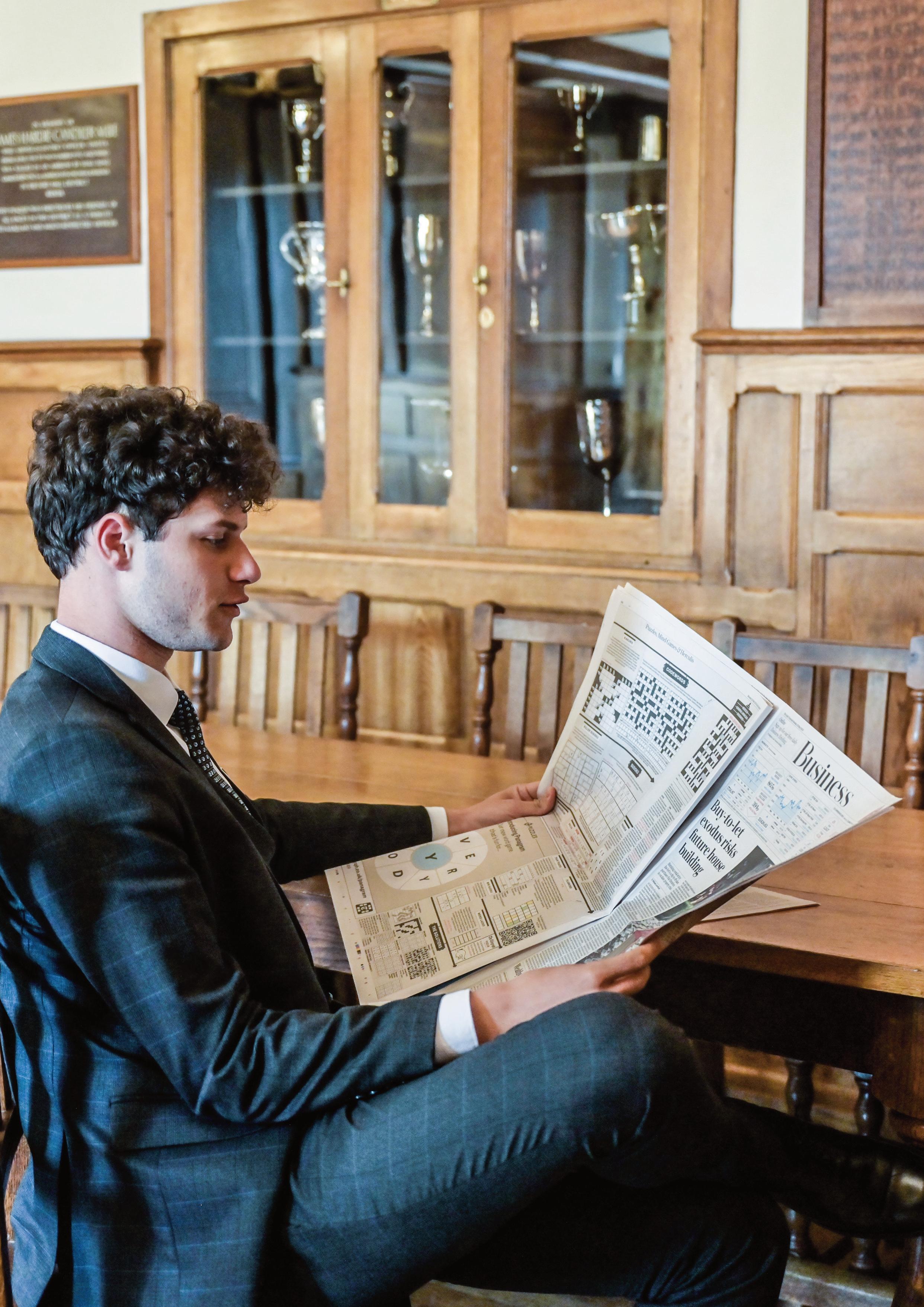
ECONOMICS
Economics can be defined as the science of scarcity - a study of how we allocate scarce resources in a world of infinite wants. Put simply, it aims to answer Who gets what, and why? The Economics A Level provides a framework to analyse the problem of scarcity in our society. The UK is currently experiencing record inflation, rising interest rates, labour shortages, and a cost-of-living crisis. In Economics we ask questions, we look at opposing arguments and, through informed discussion, we learn to agree and disagree.
What is the course content?
The subject is split into two branches and asks some of the following questions:
Microeconomics – concerned with individual markets and small aspects of the economy.
° What determines the price of education in a boarding school?
° What strategies can be put in place to combat climate change?
° What happens when natural minerals and ores such as oil, zinc, copper, and aluminium start to run out?
° Why do famous footballers earn more money than doctors?
Macroeconomics – concerned with the whole aggregate economy. Issues such as inflation, economic growth, and trade.
° What will be the consequences of high inflation?
° What will be the consequences of higher interest rates?
° Will the benefits of Brexit outweigh the costs?
° Should the government focus on economic growth or protecting the poorest?
How is the course assessed?
The Economics A Level is a linear course - assessment includes three exams taken at the end of two years of study. There is no requirement to complete coursework. It is a topical subject - the questions asked in the final year of your course are likely to be based on the economic events that occur in the first year of your course - having an interest in current affairs is vital.
What else should I consider?
Economics A Level provides an excellent foundation for those interested in studying Economics, Finance or Management at university. The skills are transferable across a broad range of subjects and careers.
Pre-course material
There is a wide range of Economics Literature available: ‘Economics the User Guide’ by Ha JoonChang and ‘How Markets Work’ are both accessible texts.

“I would say you need to give everything to every sort of aspect of your life. I think the one thing I love about the Sixth Form at Sherborne is that you’re not limited to one area. I can explore different sports and academics-wise all my teachers encourage me, but I also like that I'm not being pushed in one certain direction.”
ENGLISH LITERATURE
The English Literature A Level leads to you becoming a more effective reader and a better writer. It challenges you to look at the world around you in new ways and from new perspectives. Aside from being a fantastic course that will open your eyes to the wider world, English Literature works well in a combination with other humanities and languages, or as something different with which to balance your study of Maths or Science. It is a facilitator subject that can help you in your analytical writing, particularly if you are looking at a humanities-related degree.
The Old Shirburnians who studied English Literature at A Level have gone on to pursue a range of careers, including Law, Journalism, Finance, Advertising, TV Production, Acting and Documentary Filmmaking.
Studying literature also shows future employers that you can:
° Express yourself clearly and fluently both orally and in writing
° Put forward ideas and arguments in a concise manner
° Think independently
° Gather, investigate and assess material
° Analyse and problem solve
° Show empathy and insight
What is the course content?
For the pre-1900 units, pupils will study Hamlet by William Shakespeare and one of the following text combinations:
° Edward II by Christopher Marlowe and Paradise Lost Books IX and X by John Milton
° A Doll’s House by Henrik Ibsen and The Merchant’s Prologue and Tale by Geoffrey Chaucer
For the Comparative and Contextual study unit, you will study one of the following options:
° The Gothic
° The Immigrant Experience
° American Literature
How is the course assessed?
Exam Board: OCR
Pupils take two examinations:
° Paper 1: Drama and Poetry pre-1900 (40%);
° Paper 2: Comparative and Contextual Study (40%)
The third component is made up of the coursework portfolio (20%). In this component you produce two pieces of assessed work. The first piece can either be an essay or a piece of creative writing, mimicking the style of a text/writer. The second task is a comparative essay which allows you the opportunity to explore your individual literary interests in a highly personal task.
What else should I consider?
The Department runs a range of Co-curricular activities that we would encourage you to attend:
° Debating
° Creative Writing
It is strongly advised that you have a grade seven or above in English Literature at GCSE.
Pre-course material
As a department, we encourage you to read widely and to pursue your own literary interests. However, if you are considering studying English Literature at A Level, it may help to read the following texts: The Art of Fiction by David Lodge; Shakespeare’s Restless World by Dr Neil MacGregor.
BTEC
ENTERPRISE AND ENTREPRENEURSHIP
Entrepreneurs are essential to our society because they build the economic engines that help our economy grow. The qualification is equivalent to one A Level and carries the same UCAS points for university entry. The BTEC National Extended Certificate is an academic, practical, and vocational course where you will learn by completing projects and assignments based on realistic workplace situations and activities in addition to several externally set tasks and exams.
What is the course content?
Unit One: Enterprise and Entrepreneurship
Gain an overview of the importance of both Enterprises and Entrepreneurs to the local and national economy. You will also look at the risks, opportunities, and constraints in setting up a venture, assess the feasibility of a range of potential enterprise opportunities and develop and present one idea for a local enterprise.
Unit Two: Developing a Marketing Campaign
Marketing is a dynamic field central to the success of any business. You will gain an understanding of market research, explore different stages of developing a campaign and design one for a given product/service.
Unit Three: Business and Personal Finance
Personal finance involves understanding why money is important. The Business Finance introduces you to accounting terminology, the purpose and importance of business accounts, and the different sources of finance available to businesses.
Unit Four: Social Enterprise
Social enterprises are becoming increasingly significant in the business world. Learners will have the opportunity to produce a plan to run a social enterprise.
How is the course assessed?
The course comprises four units (or subjects) that cover the broad range of the enterprise sector. Two Units are assessed internally through a portfolio of evidence: written assignments, presentations, or practical demonstrations. The third unit is project-based - pupils have three hours to design a marketing campaign in controlled conditions. The final unit is assessed externally via a traditional two-hour exam.
What else should I consider?
A difference between A Level and BTEC is the timing of assessment. Traditional A Levels have the bulk of their assessment at the end of a two-year course, while BTECs have assessments throughout. It is not uncommon for BTEC pupils to have completed the course by April of their second year - leaving them time to focus on A Level preparation. Some pupils enjoy a format in which their understanding is assessed at the end of the course - some do not. When choosing your Sixth Form options, it is important to consider your preference for assessment.
Pre-course material
We recommend reading a range of Enterprise literature, including autobiographies and books focused on the rise of different companies: Amazon, Nike, and Tesco. There are also a range of business podcasts you can listen to over the holiday. We recommend listening to ‘How I Built This’ - available on all streaming platforms, in which, the world’s bestknown entrepreneurs discuss how they built their iconic brands.

FRENCH
Communicating in a foreign language is an essential skill for the 21st century. Over 80% of the world does not speak English as a first language. Whether for work or travel, languages are important for interacting. Linguists are increasingly attractive on the job market, where their knowledge and transferrable skills make them amongst the most sought-after graduates in the UK. Speaking more than one language improves skills such as multitasking, decision-making and communication.
French is the second most sought-after language by employers in job postings in the UK. According to the Office for National Statistics, France is the UK’s third most important non English-speaking export market. French is extremely important for both inward and outward tourism. France is the second most popular destination for people from the UK travelling abroad.
What is the course content?
Four key skills are taught and assessed: Speaking; Listening; Reading and Writing. Topic-based content includes aspects of contemporary French society. A book and a film are studied. Weekly conversation classes with native speaking assistants support pupils with their speaking skills. In the Upper Sixth pupils do an independent research project, where they choose a topic of personal interest connected to the Frenchspeaking world and present their findings in the speaking exam.
Examples of topic areas:
° Gender equality in the French-speaking world
° Racism in the French-speaking world
° Politics in the French-speaking world
° Popular culture in the French-speaking world
° Film: La Haine
° Literary Text: No et Moi by Delphine de Vigan

How is the course assessed?
AQA A Level French is examined in three exams at the end of course. The core skills of listening, reading, writing and speaking are almost evenly balanced.
° Paper 1 assesses skills in listening, reading and translation.
° Paper 2 assesses written skills through two essays on a film and a book studied during the course.
° Paper 3 is a speaking exam with two sections: spoken response to a stimulus card on one of the topics from the study of the target language society followed by a discussion of the candidate’s Independent Research Project.
What else should I consider?
Good A Level linguists are interested in developing communication skills and have an open mind towards learning about new cultures. Languages combine with any subject combination. Common subject combinations recently have been languages with economics/business, history or geography. Some scientists thinking of medicine or engineering also take a language as their third A Level. It is easy to add a new language to a lot of degree courses and many universities offer the opportunity to take a sandwich year abroad.
Pre-course material
To gain a good understanding of both the culture of the French-speaking world and the French language, pupils are recommended to: 1) Read France: An Adventure History by Graham Robb, a non-fiction exploration of the history of France; 2) Watch films and series in French on a streaming service; 3) Keep up with the news in French using Euronews at https://fr.euronews.com; 4) Practise French through listening to songs and working with the lyrics on www.lyricstraining.com
GEOGRAPHY

Put simply, Geography is the study of the world around us. It is for those with an inquisitive mind that want to know more about what shapes the places we live in, how they have changed over time, how they will change in the future and, dare I say it, what we can do about it. We are global citizens not only occupying an increasingly interconnected world but also shaping it. Geography provides the toolkit to understand this world and to make sense of the changing landscapes –be they natural, cultural, geopolitical, or otherwise. It is a subject that is unique in bridging the gap between natural and social sciences. It encourages one to look out at the world with an inquisitive, analytical, evidence based and critical mind. In the words of Michael Palin (President of the Royal Geographical Society), “Geography is not only up-to-date and relevant, it is one of the most exciting, adventurous and valuable subjects to study today”.
What is the course content?
The course content at Sixth Form, comprise ‘core’ Physical and Human Geography for the AS, which is studied in Year 12 and ‘advanced’ Geography for the A2, which is studied in Year 13. The AS content includes more topics covered in less breadth whilst the A2 content has less topics with scope for more detailed analysis and evaluation of contemporary geographical issues. A summary of the topics studied is included in the following section.
How is the course assessed?
The syllabus studied at Sherborne is the Cambridge International A Level. We adopt a ‘modular’ approach, whereby the AS exam (comprising 50% of the overall A Level) is completed at the end of Year 12 and the A2 exam (comprising the remaining 50% of the overall A Level) is completed at the end of Year 13. There is no coursework element in the course. Each exam has a
Physical and Human element which are completed as separate papers. A summary of the papers and the topics studied is shown below:
° Paper 1 – Core Physical Geography (AS level)
Topics: Hydrology and Fluvial Geomorphology, Atmosphere and Weather, Rocks and Weathering
° Paper 2 – Core Human Geography (AS level)
Topics: Population, Migration, Settlement Dynamics
° Paper 3 – Advanced Physical Geography Options (A2 level)
Topics: Coastal Environments and Hazardous Environments
° Paper 4 – Advanced Human Geography Options (A2 level)
Topics: Environmental management and Economic transition
What else should I consider?
Geography is a subject for those that have an interest in the world around them; the reason for studying it need be no more complex than that. Good writing and reading skills are certainly beneficial. A willingness and interest in reading beyond the course will set pupils apart from their peers. There is a vibrant Geography Society which offers opportunities to engage with debate, external and internal competitions and upskilling on key geographical software such as Arcgis.
Pre-course material
Books such as Prisoners of Geography by Tim Marshall and Factfulness by Hans Rosling are wonderful texts and offer a good insight into studying Geography at Sherborne’s Sixth Form. The RGS also provide a wealth of resources specifically targeted at those considering studying Geography at A Level.
GERMAN
German is the most frequently requested language in UK job advertisements. According to the Office for National Statistics, Germany is the UK’s most important trading partner for imports, ahead of China and the USA. Germany is also the UK’s second most important trading partner for exports of goods after the United States. It is the world’s third largest contributor to research and development.
What is the course content?
Four key skills are taught and assessed: speaking; listening; reading and writing. Topic-based content includes aspects of contemporary society in the German-speaking world. One book and one film are also studied. Weekly individual conversation classes with native speaking assistants support pupils with their speaking skills. In the Upper Sixth pupils do an independent research project, where they choose a topic of personal interest connected to the Germanspeaking world and present their findings in the speaking exam.
Examples of topics areas:
° German festivals and traditions
° Berlin – history and culture
° Art and architecture in the German-speaking world
° Immigration issues in the German-speaking world
° German reunification
° Book study: Andorra by Max Frisch
° Film study: Das Leben der Anderen
How is the course assessed?
AQA A Level German is examined in three exams at the end of course. The core skills of listening, reading, writing and speaking are evenly balanced.
° Paper 1 assesses skills in listening, reading and translation.
° Paper 2 assesses written skills through two essays on a film and a book studied during the course.
° Paper 3 is a speaking exam with two sections: spoken response to a stimulus card on one of the topics from the study of the target language society followed by a discussion of the candidate’s Independent Research Project.
What else should I consider?
Good A Level linguists are interested in developing communication skills and have an open mind towards learning about new cultures. Languages combines with any subject combination. Common subject combinations recently have been languages with economics/business, history or geography. Some scientists thinking of medicine or engineering also take a language as their third A Level. It is easy to add a new language to a lot of degree courses and many universities offer the opportunity to take a sandwich year abroad.
Pre-course material
To gain a good understanding of both the culture of the German-speaking world and its language, pupils are recommended the following:
° Use the Deutsche Welle website to learn about contemporary events
° Langsam gesprochene Nachrichten | DW Deutsch Lernen: slowly spoken German news with accompanying transcript
° Top-Thema | DW Deutsch Lernen: short texts on contemporary issues with accompanying audio and transcript
° Learn Languages with Music Videos, Lyrics and Karaoke! (lyricstraining.com): Learn German through listening to songs and learning the lyrics

HISTORY
At Sherborne we are passionate about the past: the contrast of a modern, outward looking department surrounded by ancient buildings is reflected in our curriculum. History is a perfect facilitator for most future pathways and compliments any set of A Levels. Boys have taken History as part of a traditional arts, humanities or social science package but also studied it alongside mathematics and science, enhancing their analytical and writing skills. A large proportion of History pupils read History or a related subject such as International Relations, Law or Politics at Russell Group universities, but have also pursued options as diverse as medicine, a PWC degree apprenticeship and Sandhurst. The Department has traditionally had a strong Oxbridge performance and in recent years our best historians have had success at competitive universities.
What is the course content?
We follow the AQA A Level syllabus
Component 1A (40%): The Age of the Crusades 1071-1204
The course considers the medieval phenomenon of the Crusading movement, and the consequent response of the Islamic world. We also explore the ways in which the Crusaders changed not only the history of the Holy Land, but their impact on the Byzantine Empire and on European politics.
Assessment: One 2½ hr paper.
Component 2M (40%): Britain in transition: Wars and Welfare 1906-1957
Why is Britain the way it is today? This course provides the answers! It covers the political, economic and social developments - as well as the threats and challenges - that underpin modern Britain, and parallels to current affairs are explicitly drawn. A major part of this course is learning through the examination of primary sources.
Assessment: One 2½ hr paper.
Component 3 (20%): NEA Coursework
Largely completed in the Lower Sixth this unit is based on the ‘Changing nature of warfare’ independent study, covering 150 years of conflict through the themes of Generalship, Military Strategy/Tactics, Weapons and Technology, Command and Control and Alliances.
Assessment: One 4,500 essay. 20% of the overall grade.
What else should I consider?
There are no specific entry requirements to study A Level History, but the course is more accessible to pupils who have achieved a Grade 7 or above in GCSE History. More important is an enthusiasm for the subject, a willingness to engage with the course and a love of debate.
The Lower Sixth take a trip to London to enrich their understanding of the components and are encouraged to attend lectures by the Sherborne Historical Society and local Historical Association as well as invited speakers, internal debates and historical film nights. For the most able there is a weekly History Extension Group providing a more challenging and esoteric look at historical concepts.
Pre-course material
° Component 1: Thomas Asbridge ‘Crusades: Holy War’ (‘Dailymotion’)
° Component 2: Andrew Marr ‘The Making of Modern Britain’ (YouTube)
° Component 3: Hew Strachan ‘The Changing Nature of War’ (YouTube) Also ‘The History of Warfare’ (YouTube) Episodes ‘The American Civil War’ and ‘How the seeds of Blitzkrieg were sown in WW1’
HISTORY OF ART
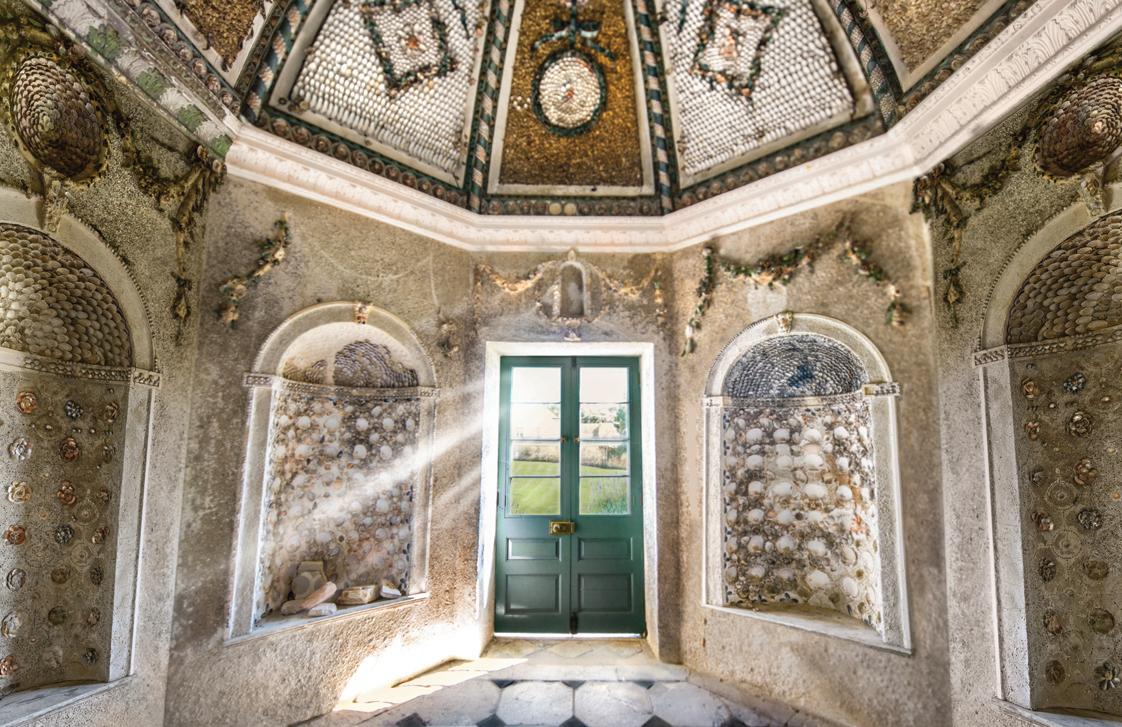
History of Art is an exciting, fascinating A Level that is unlike any other on offer. Uniquely, it combines looking at physical objects of art, and studying how they are made, and relating them to the widest kinds of ideas: from personal motives, to power, ideas about the afterlife, or philosophical and political context. Although writing is involved in this A Level, the visual quality and richness of the subject makes it easy to remember artworks and really allows pupils to make connections between them.
History of Art is an ideal subject to develop crucial skills of forming arguments, critical thinking, logical reasoning, and persuasion. These are all key skills in job interviews and any potential career. It also fosters a really broad and detailed knowledge and appreciation of world culture, which is fundamental in being successful in a global market. Future pathways include museum work, art dealing, law, finance, civil service and diplomacy, marketing, PR, sports and theatre management, journalism and the armed forces.
What is the course content?
1 Visual Analysis: a short crash course in teaching you to be able to effectively analyse and interpret an image of any painting, sculpture or building you might come across, without having to know anything about it beforehand.
2 War Theme: explores art across time and space that has been made as the result of human conflict. This of course includes propaganda and art made to glorify war, but also to memorialise the dead, or even criticise wars in a variety of ways. We look at a diverse range of artifacts, from Japanese medieval fortresses, depictions of WW1, marble memorials to Venetian admirals, or vast canvases depicting English and French battles.
3 Nature Theme: as an antidote to the human chaos and suffering of War, this theme looks at how nature is portrayed in paintings, sculptures as well as buildings. The stars of the show for many here are Gaudi’s extraordinary creations, but Monet’s and Constable’s landscapes, Baroque giants made by Giambologna, and Chinese ink paintings are just as intriguing.
4 Renaissance in Italy Period: unlike the themes above, this module takes a deep and detailed look at the magnificent creations of the Italian Renaissance. For many the cradle of Western ‘high art’, the famous artists Raphael, Donatello, Michelangelo and Leonardo are all studied. But so is the splendid, violent, and exciting society and culture itself, from the merchant princes of Venice to the angry Popes of Rome.
5 Baroque Period: this is a continuation of the Renaissance, taking us into the 17th century; a time of magnificent and extravagant palaces, vast dynamic altarpieces, and miraculously carved sculpture groups. It is the time of powerful and flamboyant kings such as Louis XIV of France, Versailles, the Spanish Empire, and more on the grandiose ambition of the Roman Popes.
How is the course assessed?
This is a linear A Level with no coursework. It is assessed at the end of the two-year course with two written exams.
What else should I consider?
You will need to gain a minimum of Grade 4 for GCSE English, in order to have the sufficient confidence for the written aspects of the course. There is no practical knowledge of art needed, e.g., drawing or painting.
Pre-course material
Watch this series to get an idea of how art history provides the backdrop to human experience: BBC iPlayer - Civilisations

LATIN
Latin A Level gives you the opportunity to study in depth the language and literature of one of the greatest cities of the ancient world, exploring, in the original Latin, a culture radically different from our own at significant periods in its history, a culture that has shaped the institutions, languages and ways of thought of Europe and the West. The annual Classics trip abroad also offers excellent travel opportunities.
Classicists are highly valued by employers, who recognise, alongside your mastery of the intricacies of Latin grammar and the complexities of the decline of the Roman Republic, many readily transferable skills, such as your ability to think logically, to compile and evaluate evidence and to express yourself clearly and succinctly both orally and in writing. Professor Santiago Iniguez at IE University in Madrid, one of Europe’s leading Business Schools, recently promoted the virtue of a classical education as an important key to success in business, reflecting that anyone can learn to read a balance sheet, but reading classical authors allows you to see the world through the eyes of others, to understand what motivates them and inspires them. The aptitude of classicists for careers in computing is well-known, but graduates find their way into careers as diverse as the civil service, gold dealing, insurance, journalism, law, accountancy, public relations, the wine trade, code-breaking and the foreign office.
What is the course content?
Alongside grammar consolidation and practice of unseen translation and comprehension, you will read Cicero’s pro Caelio, a masterpiece of Roman oratory delivered in defence of a political rival, who was also one of his ex-pupils, and a selection from the fourteenth book of Tacitus’ Annals, a memorable vignette of Nero’s decadence and cruelty in the failed and then successful murder of his own mother. In verse, after an introduction to the poetry of Lucretius, Horace and Martial, you will read some of Juvenal’s sixth satire, a masterpiece of comic hyperbole and the second book of Virgil’s Aeneid, which focuses on the fall of Troy, the Wooden Horse and the ensuing chaos of battle, including the dramatic murder of King Priam
How is the course assessed?
We follow the OCR A Level Latin specification A Level Latin, as with Greek, comprises four examined papers: two language (Unseen Translation, 33%, and Prose Comprehension and Comprehension, 17%) and two literature (Prose, 25% and Verse, 25%). There is no coursework.
What else should I consider?
What exactly can a pupil NOT do with Latin? A study of Latin is often combined with Greek, but complements many other popular A Levels, in particular Modern Languages, as it aids your understanding of grammatical structure, but also History, English and Religious Studies.
Pre-course material
Tom Holland’s Rubicon and Robert Harris’ Cicero trilogy will offer you an outline knowledge of the 1st century BC in Rome, but an alternative would be translations of Homer’s Odyssey and Iliad and Virgil’s Aeneid.
MATHEMATICS
Mathematics is an interesting and highly relevant subject in the modern world; it is about pattern and structure, and the logical analysis, deduction and calculation within these patterns and structures. More importantly, its application enables us to give a simple, yet accurate and elegant representation of the complex world around us.
A Level Mathematics builds on topics you will have met before, but incorporates new ideas, concepts and techniques. It supports many other subjects and is a highly sought-after qualification both in the workplace and at university.
What is the course content?
A Level Mathematics is a two-year linear course incorporating both Pure and Applied components (Mechanics and Statistics). In brief the Pure course covers the following topics: proof, algebra and functions, co-ordinate geometry, sequences and series, trigonometry, exponentials and logarithms, differentiation, Integration, numerical methods and vectors. The Statistics course includes statistical sampling, data presentation and interpretation, probability, statistical distributions and hypothesis testing and the Mechanics course covers quantities in mechanics, forces and Newton’s laws, kinematics and moments.
How is the course assessed?
The course you will study is the Pearson Edexcel
A Level in Mathematics. At the end of the Upper Sixth, you will sit three (2-hour) examination papers; two are Pure (two-thirds of your overall mark/grade) and one Applied (Statistics and Mechanics – one third of your overall mark/grade).
What else should I consider?
If you are thinking about taking Mathematics then you should be aiming to achieve at least a grade 8 at GCSE/IGCSE, if you are unsure whether you will achieve this, talk it through with your present teacher who will be best placed to guide you.
Many pupils find the step from GCSE to A Level quite difficult, but it is perfectly manageable if you are prepared to work hard, willing to take responsibility for your own progress and confident in asking for help as and when you need it. That being said a strong foundation in numbers and algebra is essential; you need to feel comfortable manipulating algebraic expressions. You will also need to have reasonable spatial awareness so that you can relate graphs and diagrams to abstract ideas and, you must be prepared to communicate your thoughts and mathematical working in a clear and structured way.
Throughout the Upper Sixth Form we seek out extracurricular opportunities to reinforce, stretch and challenge those that have opted for Mathematics and provide support for those whose preferred University and course require them to complete admissions tests (STEP and MAT).
Pre-course material
GCSE Mathematics should provide you with the foundation knowledge required to complete an A Level in Mathematics. However, there are a number of resources online which are designed to make the transition from GCSE to A Level as smooth as possible. The AMSP have produced a really good, free downloadable resource called “Transition to A Level Mathematics: Essential Skills” which you may find useful.
FURTHER MATHEMATICS
This course builds upon the concepts covered in A Level Mathematics so must be studied in addition to, rather than in replacement of A Level Mathematics.
Further Mathematics qualifications are highly regarded and are warmly welcomed by universities. If you are considering a degree in Mathematics, the Further Mathematics A Level would certainly be beneficial and in some cases will be a pre-requisite. The course is also considered useful if you intend to study Computer Science, Economics, Engineering or Physics at University. In addition, if you are intending to apply for a degree in Computer Science or Mathematics at Oxford or a Maths or Maths based subject at Cambridge, you will need to sit STEP 2 or MAT which will require you to have some knowledge of the Further Mathematics syllabus.
What is the course content?
A Level Mathematics and Further Mathematics are taught linearly across two-years. In the first year you will cover all aspects of the A Level Mathematics course and in the second year you will cover the Core Pure and Applied components from the Further Mathematics Course. The Applied component is made up of two out of these three options: Further Statistics, Further Mechanics and Decision Mathematics. During the course you will be prepared for all three of these options and the best two results in the final exams will contribute towards your overall grade.
How is the course assessed?
The courses you will study are the Pearson Edexcel A Levels in Mathematics and Further Mathematics
At the end of the Upper Sixth you will complete the A Level Mathematics examinations alongside five (1½ hr) additional examination papers; two based on the Further Maths Core Pure content (50%) and three which cover the Applied content: Further Statistics, Further Mechanics and Decision Mathematics. The best two results from the three Applied papers will contribute to your overall grade (50%).
What else should I consider?
If you are thinking about taking Further Mathematics then you should be aiming to achieve a grade 9 in GCSE/IGCSE Maths and ideally also studying a Further Maths course. If you are unsure whether you will achieve this, talk it through with your present teacher who will be best placed to guide you.
Throughout the Upper Sixth Form we seek out extracurricular opportunities to reinforce, further stretch and challenge those that have opted for Mathematics and provide support for those whose preferred University and course require them to complete admissions tests (STEP and MAT).
Pre-course material
GCSE Mathematics should provide you with the foundation knowledge required to complete an A Level in Further Mathematics. However, there are a number of resources online which are designed to make the transition from GCSE to A Level as smooth as possible. The AMSP have produced a really good, free downloadable resource called “Transition to A Level Mathematics: Essential Skills” which you may find useful or visit MEI.org.uk for more resources.
MUSIC
Music is constantly evolving, inspiring creativity and expression in a way that no other subject can. A Level music brings listening, performance and composition to life in new and engaging ways, and links to the world around us like never before. Studying music develops many transferable skills, including collaboration, communication, critical thinking, and performing under pressure. Music is looked upon favourably on a UCAS application since it is a highly analytical and challenging subject. Class sizes are often small so a lot of individual attention can be given.
What is the course content?
The OCR A Level course is split into two options (A or B):
Option A
1
a. Performance (25%): A recital of at least six minutes and consisting of two contrasting pieces. There is a choice of solo piece(s) on one or more instruments or voice, an ensemble performance (including accompanying, and a realisation using music technology).
b. Composition (35%): Compositions with a combined duration of at least eight minutes consisting of one to a brief set by OCR, one to a brief written by the learner, and three short technical exercises.
Option B
2
a. Performance (35%): A recital of at least 10 minutes and consisting of three contrasting pieces. There is a choice of a solo piece(s) on one or more instruments or voice, an ensemble performance (including accompanying), or a realisation using music technology. Section 1 is a free choice or repertoire, and section 2 is a focused study.
b. Composing (25%): Compositions with a combined duration of at least four minutes, one to a brief set by OCR, and one to a brief written by the learner.

In addition to studying one of the two options above, all boys also complete a written paper which is worth the remaining 40% of the A Level credit. The written paper comprises in-depth studies of music including a choice of topics ranging from Classical music, through Swing and Jazz to Rock & Pop music. Listening tests and two essay questions on the chosen topic are included in this exam paper.
How is the course assessed?
We follow the OCR A Level syllabus. All components are externally assessed at the end of the two-year course.
What else should I consider?
Whilst GCSE Music is not essential, a good pass is recommended. By the end of the A Level course, pupils will need to be performing at grade 6 level or above to access the top two mark bands for “technical control”. The most popular A Levels chosen in combination with Music include English and Mathematics.
Pre-course material
Music: A Very Short Introduction (Nicholas Cook, UK, Non-fiction). The short book covers music throughout history and across the world, encouraging us to think about its role in our lives.
The Science of Music (Robert Winston, UK, Nonfiction). In this four-part BBC series, Robert Winston explores questions such as the science behind music, and what happens in our brains when we listen to it.
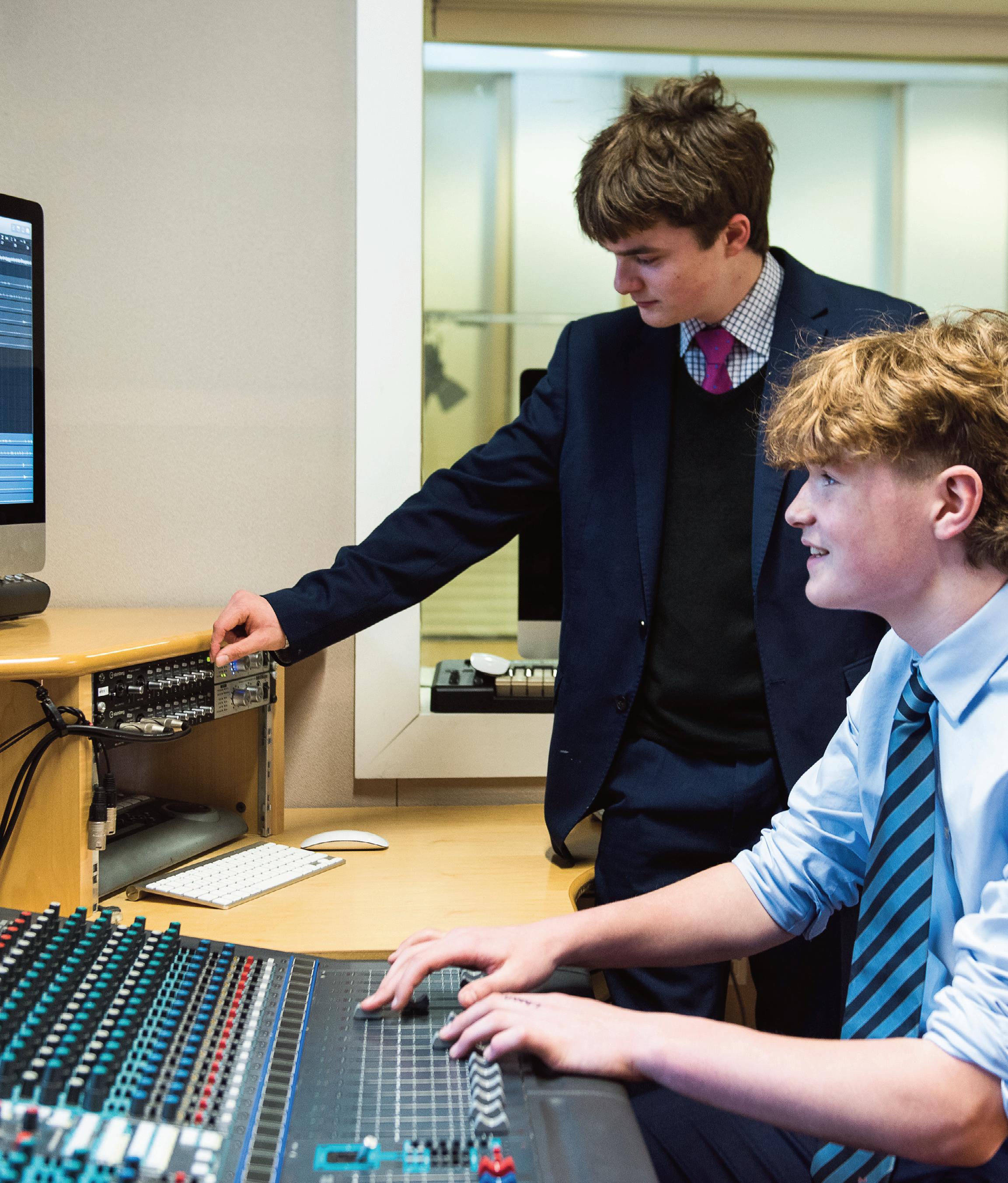
MUSIC TECHNOLOGY
Modern music is an art form that most pupils listen to in their spare time, from electronic dance music and DJing to Rock music and Hip Hop. This course offers a chance for pupils to learn about the different styles of popular music and how they were recorded, composed and their historical context. The course is designed to allow pupils to expand their knowledge of music production, composition, DJing skills or, for those new to Music Technology, an opportunity to learn about electronic and popular music.
What is the course content?
The course is broken down into four different components, they are:
° Unit 1: Multi Track Recording - An opportunity to record a band or an ensemble and then mix it down and, using the best production techniques, produce a recording of the highest quality. All songs will be from the popular music context and not include any genres outside of pop, rock, EDM or electronic music. Some of the songs recorded in previous years include those by The White Stripes, Adele, Coldplay, The Strokes and Led Zeppelin.
° Unit 2: Composition - An opportunity to arrange a piece of music or a song for different instruments and voices, using the facilities within the music studio and/or the classroom suites. Pupils will create an original composition, totaling no more than three minutes. Pupils will develop the skills to create and manipulate sounds in imaginative and creative ways, learning how to create music in Ableton Live.
° Unit 3: History of Recorded Music - Alongside the practical coursework, pupils will develop their knowledge and understanding of recording and production techniques of popular genres (rock, pop, dance and electronic music).
° Unit 4: Producing Music - The creation of a recorded piece of music based on editing, mixing and production techniques. This will develop an understanding of sound and audio technology and expand upon recording and production techniques. This part of the course will focus on the practical ways music is produced where pupils will have hands-on experience with mixing and mastering music.
How is the course assessed?
Edexcel Exam Board Specification
Two components, recording and composition, are practical coursework worth 40% of the overall mark where pupils will use computers and hardware (microphones, mixers, controller devices) to complete their coursework.
There are two tests, the history component (25%) is a written test based on how popular music was recorded and what equipment was used in a specific song; the other is production (35%) where pupils will have a combination of written questions and practical production questions where they will produce a popular song in timed conditions.
What else should I consider?
Pupils are not expected to have any background in performing music, however, knowledge of a popular modern instrument (electric guitar, keyboards, drums or electronic music) will no doubt have an advantage.
Pre-course material
Sound on Sound Magazine/Website (https://www.soundonsound.com/) Ableton Software (https://www.ableton.com/) Big Studio Secrets for Home Recording and Production (Joe Dochterman; ISBN 9781435455054) Perfecting Sound Forever (Greg Milner; ISBN 9781847081407) The History of Music Production (Richard James Burgess; ISBN 9780199357178)
RELIGIOUS STUDIES
Much of the content of the course has a religious tone, including arguments for the existence of God and ethical theories like natural law, this is because most of the great minds of the last two millennia thought and wrote about these questions. Studying this course lets you examine the great works of Descartes, Kant, JS Mill, Plato, Aristotle, St Augustine and Philippa Foot, and encourages you to respond to them with your own opinions.
The course is full of opportunities to debate big issues such as euthanasia, sexual ethics, the problem of evil and the divinity of Jesus. You will be helped to develop your writing, so you will learn to write well-structured essays containing convincing arguments. This is one of the reasons why pupils of Religious Studies go on to a wide range of fascinating careers.
Those careers include politics (many of Britain’s Prime Ministers have studied Politics, Philosophy and Economics at university), Law (more lawyers in the UK studied Philosophy at university than Law) and the creative industries, such as comedy and film writing and performing.
But the most compelling case for why to study Religious Studies is that it is fun. Past pupils have said that it has been their most enjoyable A Level subject, citing as examples the teaching, the debates and the opportunities to examine and develop their ideas about the world around them.
What is the course content?

There are three parts to the course: Philosophy of Religion, Ethics and Developments in Christian Thought. They are all taught by different teachers and are examined in their own papers at the end of the course. Philosophy of Religion contains questions such as, ‘does God exist?’ and ‘why would a good God create evil?’; the Ethics part of the course looks at different ways philosophers have tried to work out what is right and wrong, and if those terms have any objective meaning; and the DCT part looks at questions such as the belief in original sin and whether the Bible is sexist.
How is the course assessed?
OCR
Three papers, each of two hours. Candidates must write three essays, out of a choice of four.
What else should I consider?
Religious Studies is an essay writing course and so the ability to write well is an advantage. Having said that, you will be helped to develop your writing so don’t let a perceived weakness in writing put you off. It can be combined with almost any other subjects: previous candidates have studied Religious Studies alongside Business, Drama, Physics and Maths. The Department has a very successful Philosophy Society that it runs with Sherborne Girls: this society provides both a social occasion and an intellectual opportunity.
Pre-course material
There are lots of great TV shows and films which have a philosophical base, particularly Black Mirror and The Good Place (both on Netflix) and The Matrix. There are some great podcasts and radio programmes, including In Our Time and Sci-Phi: Science Fiction and Philosophy (Audible). And there are, of course, excellent books such as Descartes Meditations, Michael Shur’s How to be Perfect an Jostein Gaarder’s Sophie’s World.
PHYSICAL EDUCATION
This enriching course provides pupils with comprehensive knowledge about the principles and significance of physical activity and sport. By combining practical application with academic exploration, they can enhance their own performance or coaching abilities through theoretical understanding. This course serves as an excellent foundation for pursuing a university degree in fields such as sports science, sports management, healthcare, or exercise and health. Furthermore, it complements further study in disciplines such as biology, human biology, physics, psychology, nutrition, sociology, and more. Embarking on the study of A Level Physical Education opens doors to a wide range of career opportunities. You can explore paths in sports development, sports coaching, physiotherapy, and personal training. Moreover, the transferable skills acquired during your Physical Education journey, such as decision-making and independent thinking, will prove valuable in any career path you choose to pursue.
What is the course content?
The syllabus focuses on four areas of sport: Physiological factors affecting performance; Biomechanics; Skill acquisition and Sports psychology; Socio-cultural issues in physical activity and sport.
How is the course assessed?
OCR
A total of three examination papers (two 1 hr and one 2 hr) taken at the end of the two-year course. A wide range of question types including single mark, short answer, and extended response questions. Nonexamined practical performance in one sport, as either a coach or a performer in an activity and a nonexamined Performance Analysis task.
What else should I consider?
To enrol in this course, it is recommended that pupils who have previously studied GCSE Physical Education have achieved a grade 7 or higher. However, prior completion of the GCSE syllabus is not mandatory, and individuals with a strong foundation in science will still be able to access the course material. A Level Physical Education often compliments pupils pursuing scientific disciplines or vocational courses such as BTEC Sport. The sporting opportunities available at Sherborne Boys complement the A Level curriculum, providing pupils with valuable experiential learning opportunities. One notable aspect of this course is that 15% of the overall grade is awarded based on practical performance. This means that talented sportsmen or coaches have the opportunity to secure a substantial portion of their final grade even before sitting for examinations.
Pre-course material
The Sports Gene: Inside the Science of Extraordinary Athletic Performance by David Epstein (Author)
Bounce: The Myth of Talent and the Power of Practice by Matthew Syed
The Science of Sport Podcast
World-renowned sports scientist Professor Ross Tucker and veteran sports journalist Mike Finch break down the myths, practices and controversies from the world of sport. The two delve into the most recent research, unearth lessons from the pros and host exclusive interviews with some of the world’s leading sporting experts.
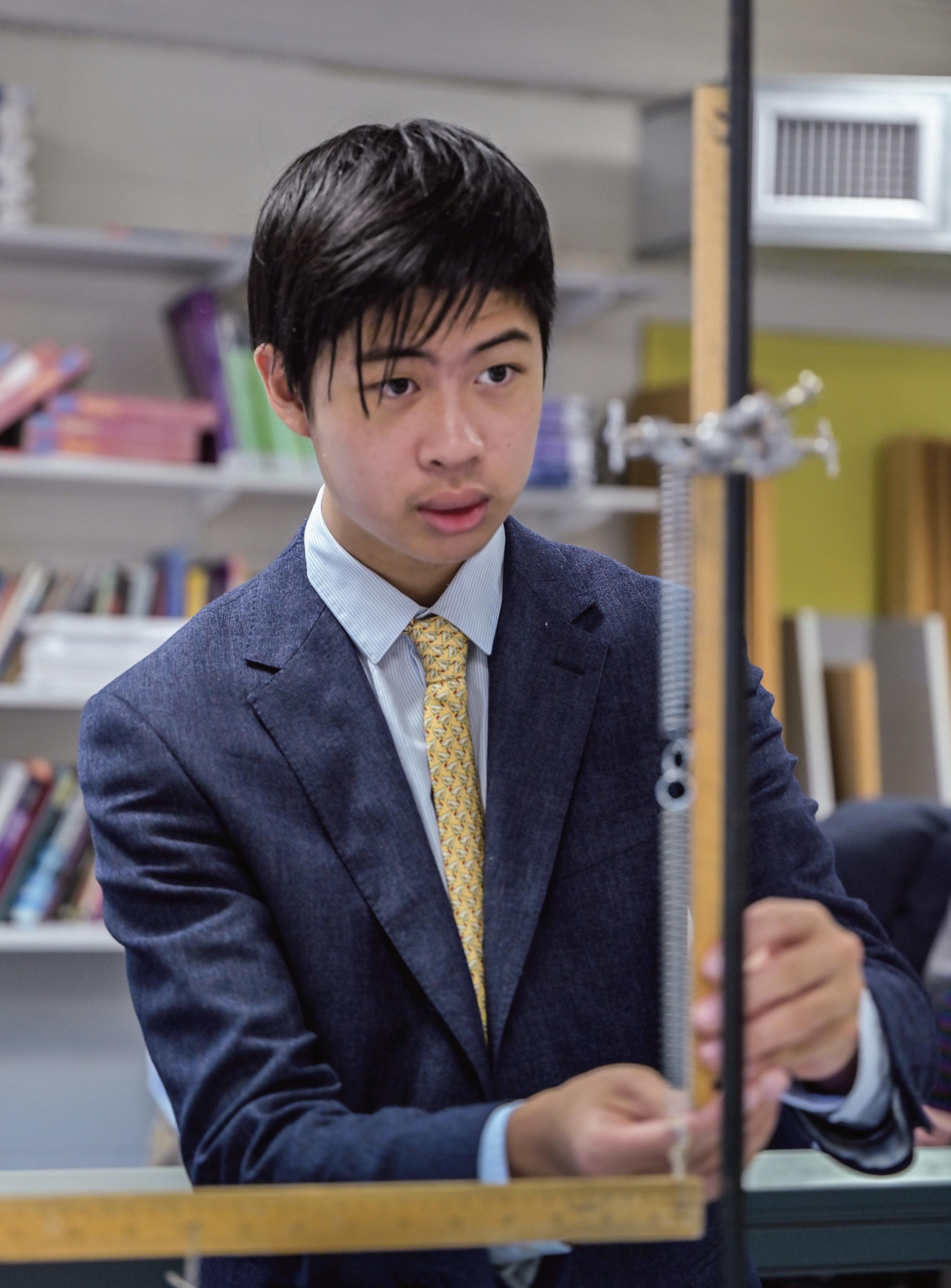
PHYSICS
Physics takes in the study of the smallest building blocks of matter and extends to our understanding of the universe as a whole. You will develop analytical skills that you can apply to many aspects of life: the ability to break a problem into parts to understand the whole, is a very sought-after skill. This is one of the reasons why Physics is such a respected subject among employers, who will always be looking for talented problem-solvers. Physics is a vital component of a successful CV for any boy looking to study subjects such as Physics, Engineering, which includes many possible varieties, and Computer Science at university.
What is the course content?
We study the AQA A Level Physics course, which contains eight core topics and one option topic. Measurements & Errors is studied throughout the course and underpins all the practical work: Particles & Radiation, Waves, Mechanics & Materials, Electricity and Further Mechanics are all covered in the Lower Sixth. Thermal Physics, Fields and Nuclear Physics are studied in the Upper Sixth. In the Upper Sixth we also study the Option topic, which is determined by the teachers of the set, and is most likely to be either Astrophysics or Engineering, having previously been successful choices.
How is the course assessed?
You are assessed with three 2hr exams at the end of the two-year course. Each is worth approximately a third of the course and are comprised of short and long answer questions as well as multiple choice questions on two of the papers. You must also complete the twelve core practicals and demonstrate that you are competent in your practical skills. This is a pass or fail criteria, but it is not something that anyone is expected to fail. The skills are assessed on Paper 3.
What else should I consider?
There is no requirement that you take Mathematics at A Level, but it is highly recommended. Anyone not taking A Level Mathematics is required to take an extra timetabled lesson every week: Mathematics for Physics. Taking Mathematics, and particularly Further Mathematics, will enhance the chance of obtaining a top grade. Those considering Physics or Engineering courses at elite universities are highly advised to take Further Mathematics.
A seven in GCSE Physics/Double Science is needed to take Physics at A Level.
Pre-course material
A couple of good books that you could look at are Six Easy Pieces by Richard Feynman and What if? by Randall Munroe. If you have particular subjects of interest such as Astrophysics or Quantum Computing, do get in touch and we can recommend some appropriate reading. If you fancy a good movie, but also want to get thinking about Physics, check out Interstellar (2014) by Christopher Nolan or The Martian (2015) by Ridley Scott - we also highly recommend the source novel by Andy Weir. Any of the videos on the YouTube channel Veritasium are well worth a look.

POLITICS AND INTERNATIONAL RELATIONS
Few subjects are as contemporary or relevant as Politics and International Relations. In a world of tension between populist nationalism and supranational liberalism, we are seeing the creation of the United Kingdom’s post Brexit reality, in addition to the changing geopolitical power balance involving the United States, Russia and China. The vibrant political environment in the United Kingdom offers a perfect backdrop against which to study the governmental institutions and political processes of this country.
What is the course content?
As mentioned, the AQA course is divided into three components, each intensely relevant to our lives. They are as follows:
1 UK Politics: When studying the political landscape of the UK, we discuss political participation, political parties, electoral systems, voting behaviour and the impact of the media. In the unit the core political ideas of Liberalism, Conservatism and Socialism are examined in context.
2 UK Government: When looking at the government of the UK, we study the constitution, parliament, the prime minister and the executive, and the relationships between branches of government. In this unit the political ideas of Nationalism are examined in context.
2 Global Politics: We live in a complex world with significant challenges, including global terrorism, poverty, economic instability, weapons proliferation, failing states and environmental degradation. These challenges require global co-operation if they are to be resolved. Global politics gives students an opportunity to develop an understanding of the local, national, international and global dimensions of political activity. It also gives them the opportunity to explore the political issues that affect all of us. Students will gain understanding of abstract political concepts through grounding them in contemporary real-world examples and case studies that will develop an international awareness and knowledge of multiple perspectives.
How is the course assessed?
Examination board: Edexcel
The course is assessed at the completion of the Upper Sixth year, using three exam components (as above), each worth 33.3% of the final grade.
What else should I consider?
Of vital importance is a healthy interest in politics and contemporary current affairs. An interest in the political media, including social platforms, and a willingness to read beyond the textbooks will offer greater insight and success. Politics works well in combination with History, Geography, Sociology, Economics, Philosophy and English.
Extra-curricular opportunities abound, including debating, parliamentary visits and lectures/workshops with MPs and Members of the House of Lords.
Pre-course material
A full reading list will be provided for this course, but pupils may find starting with the ‘A Very Short Introduction to...’ series an accessible introduction to several of the key concepts. General engagement with current affairs will also be beneficial as a starting point for this course..
PSYCHOLOGY
A Level Psychology will give you the opportunity to look at explanations psychologists use to understand human behaviour and experiences. This fascinating subject studies the complexities of human and animal behaviour.
What is the course content?
Across the course, pupils will cover areas such as cognition and memory, social behaviour such as obedience and conformity, physiological processes such as how the brain affects behaviour. The emphasis of the course is on applying knowledge, understanding, and developing the skills of analysis, evaluation and critical thinking. Pupils will learn to question and challenge research findings, suggest real-world applications of research and be able to justify their ideas. As a result, class work will often take the form of discussions and debates and will occasionally involve small-scale investigations.
° Paper 1 – Introductory Topics in Psychology.
° Paper 2 – Psychology in Context.
° Paper 3 – Issues and Options in Psychology.

How is the course assessed?
At the end of the Upper Sixth you will sit three written papers following the AQA specification. There is no coursework component. Each paper is a 2 hr written exam worth a third of the A Level. Psychology A Level is predominantly an essay-based exam. Pupils need to be able to write proficiently, answer extended discussion questions, grapple with research methods, and analyse unseen material under exam conditions.
What else should I consider?
Psychology is a multifaceted subject and develops skills valued by universities and employees, such as the ability to explain complex concepts clearly and concisely in writing, to think logically and critically. Not only does it lead to a variety of Psychology-specific degree options such as Clinical Psychology, it also serves as a valuable basis for other academic study options such as Neuroscience, Law, Education and Business Management. A Level Psychology is not necessarily required in order to study Psychology at degree level, but it is certainly advisable.
Pre-course material
This course covers a range of introductory topics and themes from the AQA A Level Psychology course, including key approaches and research methods.
https://ondemand.tutor2u.net/ students/transitionto-aqa-alevel-psychology-skills-booster
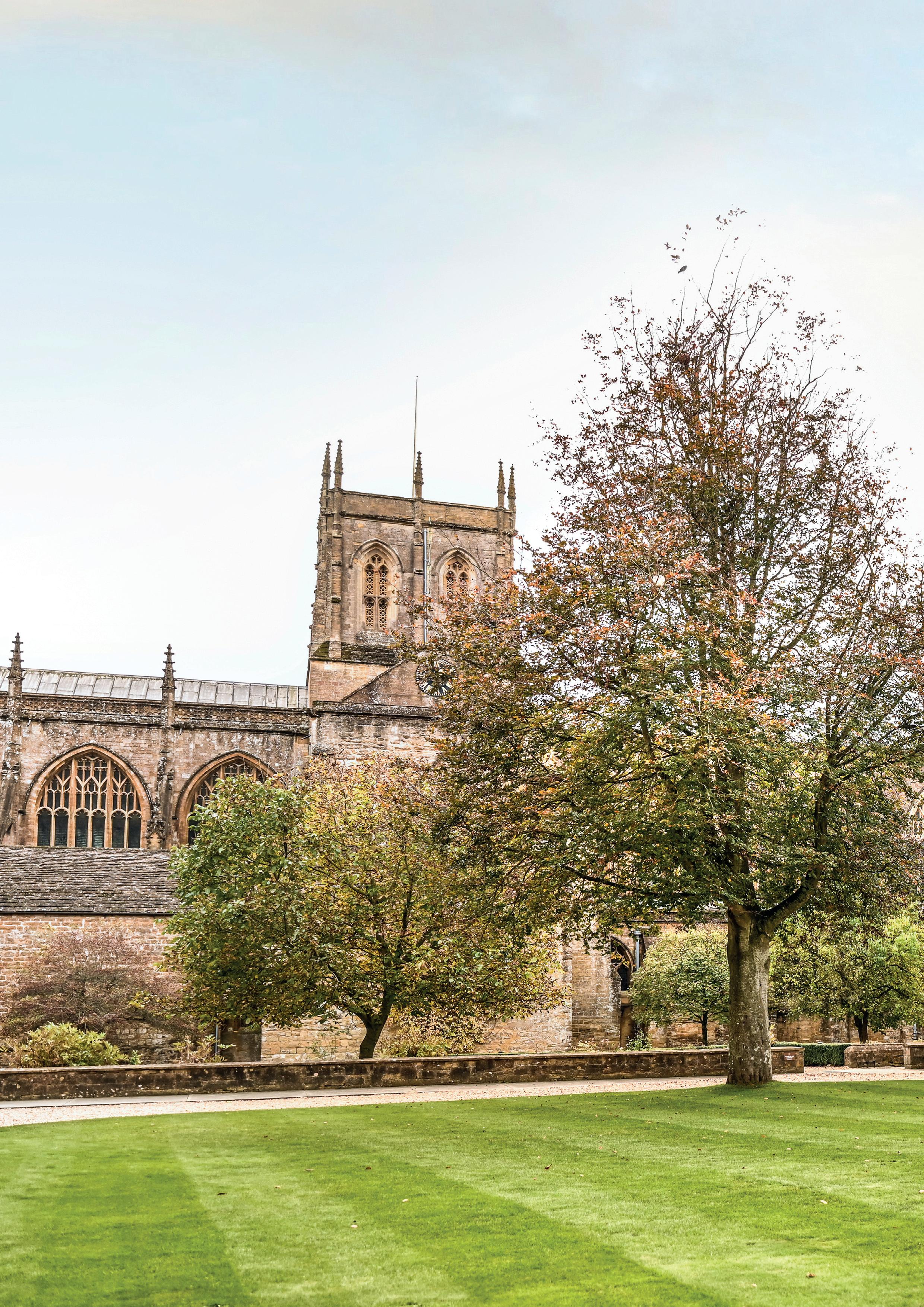
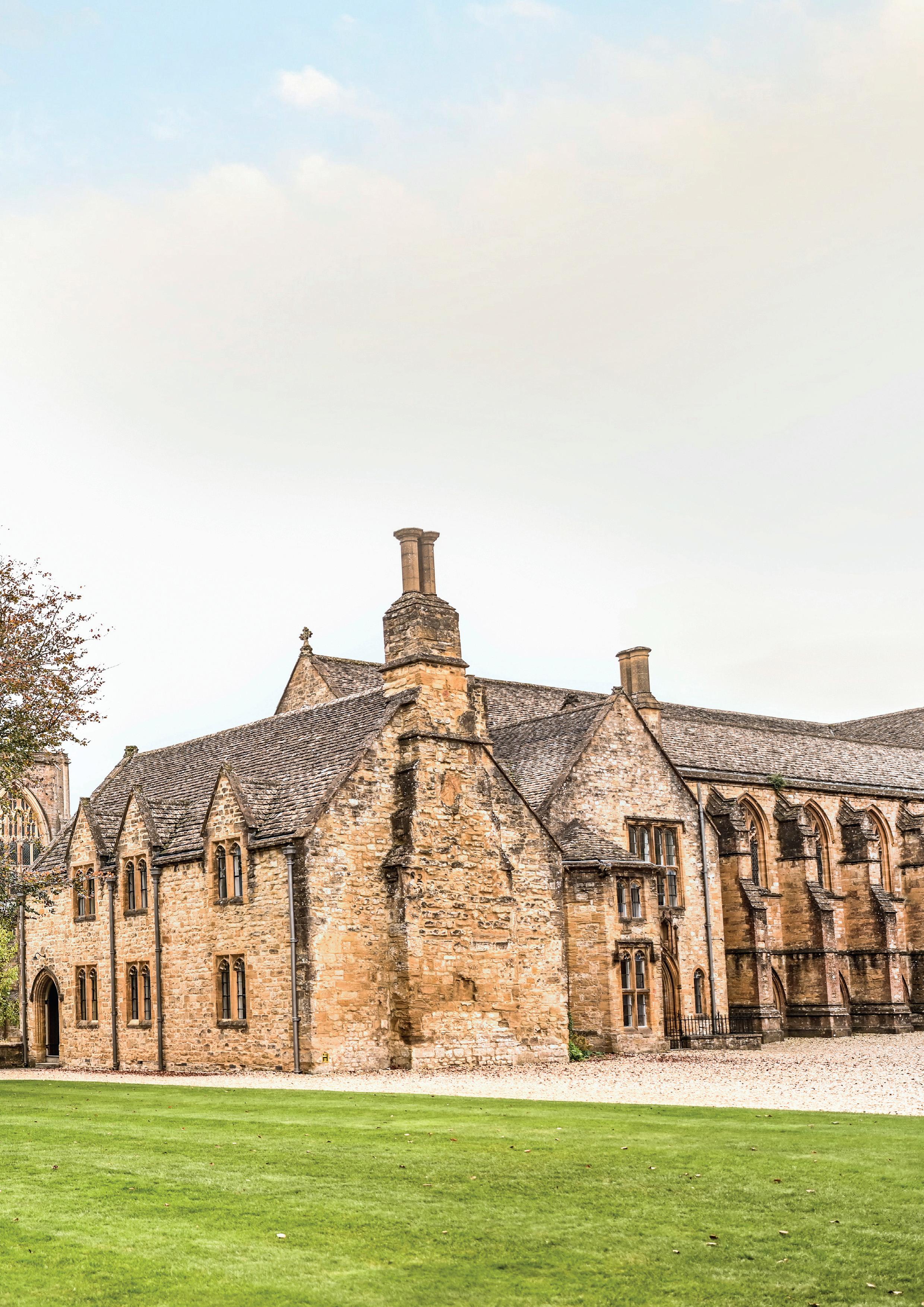
SPANISH
Spanish is the second most widely spoken first language in the world with 470-500 million native speakers. 16 million British tourists visit Spain every year while one million British nationals are permanent or part-time residents. According to the British Chamber of Commerce, 21% of foreign investment in the UK is from Spanish companies while British companies invest 14% of their entire foreign investment in Spain. Spanish is closely linked and provides a gateway to other romance languages such as French, Italian, Portuguese, Romanian and Catalan.
What is the course content?
Four key skills are taught and assessed: Speaking, Listening, Reading and Writing. Topic-based content includes aspects of contemporary Spanish and Latin American society. A book and a film are studied Weekly conversation classes with native speaking assistants support pupils with their speaking skills. In the Upper Sixth pupils do an independent research project, where they choose a topic of personal interest connected to the Spanish-speaking world and present their findings in the speaking exam. Examples of topics areas:
° Gender equality in the Spanish-speaking world
° Racism in the Spanish-speaking world
° Politics in the Spanish-speaking world
° Popular culture in the Spanish-speaking world
° Film: Volver by Pedro Almodóvar
° Literary Text: Las bicicletas son para el verano by Fernando Fernán Gómez.
How is the course assessed?
AQA A Level Spanish is examined in three exams at the end of course. The core skills of listening, reading, writing and speaking are evenly balanced.
° Paper 1 – assesses skills in listening, reading and translation.
° Paper 2 – assesses written skills through two essays on a film and a book studied during the course.
° Paper 3 – is a speaking exam with two sections: spoken response to a stimulus card on one of the topics from the study of the target language society followed by a discussion of the candidate’s Independent Research Project.
What else should I consider?
Good A Level linguists are interested in developing communication skills and have an open mind towards learning about new cultures. Languages combine with any subject combination. Common subject combinations recently have been languages with economics/business, history or geography. Some scientists thinking of medicine or engineering also take a language as their third A Level. It is easy to add a new language to a lot of degree courses and many universities offer the opportunity to take a sandwich year abroad.
Pre-course material
To gain a good understanding of both the culture of the Spanish-speaking world and the Spanish language ahead of beginning the course, pupils are recommended to:
° Read The Ghosts of Spain by Giles Tremlett, a nonfiction exploration of contemporary Spain by a journalist who spent years living there.
° Keep up with the news in Spanish using Euronews at https://fr.euronews.com/
° Read Forgotten Continent by Michael Reid, a nonfiction history of Latin America.
° Watch films and series in Spanish on a streaming service.
° Practise Spanish through listening to songs and working with the lyrics on www.lyricstraining.com
BTEC SPORT
BTEC Sport enables pupils to experience the multifaceted subject as they apply their knowledge to personal development, elite performers, coaches, and practical scenarios. BTEC Sport serves as an excellent foundation for those interested in pursuing a university degree in fields such as sports science, sports management, healthcare, or exercise and health. Moreover, it seamlessly complements further studies in disciplines like biology, human biology, physics, psychology, nutrition, sociology, and more. The course provides a holistic educational experience that prepares you for a range of pathways within the sports industry and related fields.
What is the course content?
There are three mandatory units of study for BTEC Sport Nationals: Anatomy and Physiology; Fitness Training and Programming for Health; Professional Development in the Sports Industry. The final unit is chosen by the Physical Education staff and aims to suit the needs of the learners studying BTEC Sport each year. The choices include Sports Psychology, Practical Sports Performance and Coaching for Performance.
How is the course assessed?
It includes a range of assessment types and styles suited to vocational qualifications in the sector.
There are two externally assessed units that equate to a third of the course each. Each assessment is taken under exam conditions, then marked by Pearson and a grade awarded. Learners are permitted to resit external assessments during their programme. Some external assessments include a period of preparation using set information. There are two internally assessed units that equate to a sixth of the course each.

These assessments are coursework style projects. Assessments can be selected for the most appropriate styles according to the learning set out in the unit. This ensures that learners are assessed using a variety of styles to help them develop a broad range of transferable skills. For example, learners may:
° Write up the findings of their own research
° Use case studies to explore complex or unfamiliar situations
° Carry out projects for which they have choice over the direction and outcomes
° Demonstrate practical and technical skills
What else should I consider?
To enrol in this course, it is recommended that pupils who have previously studied GCSE Physical Education have achieved a grade 6 or higher. However, prior completion of the GCSE syllabus is not mandatory, and individuals with a strong foundation in science will still be able to access the course material. BTEC Sport often compliments pupils pursuing scientific disciplines or other vocational courses.
Pre-course material
° The Sports Gene: Inside the Science of Extraordinary Athletic Performance by David Epstein (Author)
° Bounce: The Myth of Talent and the Power of Practice by Matthew Syed
° The Science of Sport Podcast
Post-18 Pathway Destinations
As well as choosing a range of courses at UK colleges and universities as their Post-18 pathways, many Shirburnians also experience exciting gap year opportunities, apprenticeships, degree apprenticeships and higher education courses overseas. Global universities currently attended by Old Shirburnians include the following institutions:
• Boston University, USA
• Berklee College of Music, USA
• McGill University, Canada
• Stanford University, USA
• University of Toronto, Canada
UNIVERSITY DESTINATIONS 2024
University of Strathclyde History and Economics
University of Glasgow Computer Science
The University of Edinburgh Finance and Business
Geography x 2 History and Economics
Mechanical Engineering
Russian Studies and Philosophy
Spanish and Portuguese Spanish and Linguistics
University of Manchester Ancient History and Archaeology History
Mathematics and Physics
Modern Language and Business & Management (French) (4 years) Music x 2 Politics and Data Analytics
Cardiff University
Lancaster University Cyber Security Finance
University of Birmingham History
Harper Adams University Agricultural Engineering (with Placement)
Bath Spa University Sports Management (Professional Placement Year)
Aberystwyth University Economics
University of Bath
Engineering with professional placement
Management and Modern Languages (Spanish) w study or work abroad
Bristol, University of the West of England Psychology
University of Bristol Economics and Politics History x 2
and French
International Social and Public Policy with Study Abroad
Mathematics with Statistics for Finance
Mechanical Engineering
Philosophy and Economics
Sociology and Philosophy
University of Exeter
Business and Management
Business and Management with Industrial Experience
Computer Science x 2
Engineering and Management (via International Year
Finance
Flexible Combined Honours with UK Work Experience
Law with Business with Professional Placement
Law with European Study
Medical Sciences Philosophy and Theology Politics and International Relations
University of St Andrews Spanish (year abroad)
Newcastle University
Accounting and Finance
Ancient History
Architecture and Urban Planning
Business Management
Computer Science (Game Engineering)
Food Business Management and Marketing
Economics and Business Management
Economics and Finance
International Business Management with Placement
Modern Languages and Business Studies
Music
Urban Planning
Durham University
Business and Management with Placement Year
Business and Management with Study Abroad
Chemistry
Chinese Studies (with Year Abroad)
Computer Science
Combined Honours in Social Sciences
English Literature and Philosophy
Geography x 2
Modern European Languages and History (with Year Abroad)
Modern Languages and Cultures (with Year Abroad)
Music x 2
University of Leeds Environment and Business Physics with Astrophysics Product Design
University of Nottingham Philosophy and Theology Veterinary Medicine
Loughborough University
Finance and Management (with placement year)
Geography with Economics (with placement year)
University of East Anglia UEA Accounting and Finance with a Year in Industry
Aston University, Birmingham Transport Management Birmingham City University Horology
MetFilm Content, Media and Film Production
University of Reading Biomedical Sciences
Construction Management Philosophy, Business and Ethics
University of Essex Film Studies (Including Year Abroad)
Royal Holloway, University of London History
Imperial College London Computing
University of Plymouth Architecture
University of Southampton
Solent University Southampton Yacht and Powercraft Design with Science and Engineering Foundation Year
Falmouth University
University College London Astrophysics
Biomedical Sciences
Classics and the Ancient World Mathematics
x 2
Russian Studies (4 years)
London South Bank University Product Design
Oxford Brookes University Accounting and Finance Business and Management x 2
University of
University of Brighton Biomedical Sciences
Carmen Saeculare
THE SCHOOL SONG
Olim fuit monachorum
Schola nostra sedes;
Puer regius illorum
Fecit nos heredes;
Hoc in posteros amoris
Grande dedit signum;
Sonet ergo Fundatoris
Nomen laude dignum!
Vivat Rex Eduardus Sextus!
Vivat!
Ergo dum verenda mole
Cana perstat aedes,
Dum recenti gaudet prole
Monachorum sedes,
Stimulet certamen ludi, Suadeat laboris,
In sigillo sculptum rudi
Nomen Fundatoris,
Vivat Rex Eduardus Sextus!
Vivat!
Words by Edward Mallet Young (1839-1900).
Score by Louis Napoleon Parker (1852-1944). First public performance, Commemoration Day Concert, 30 June 1887
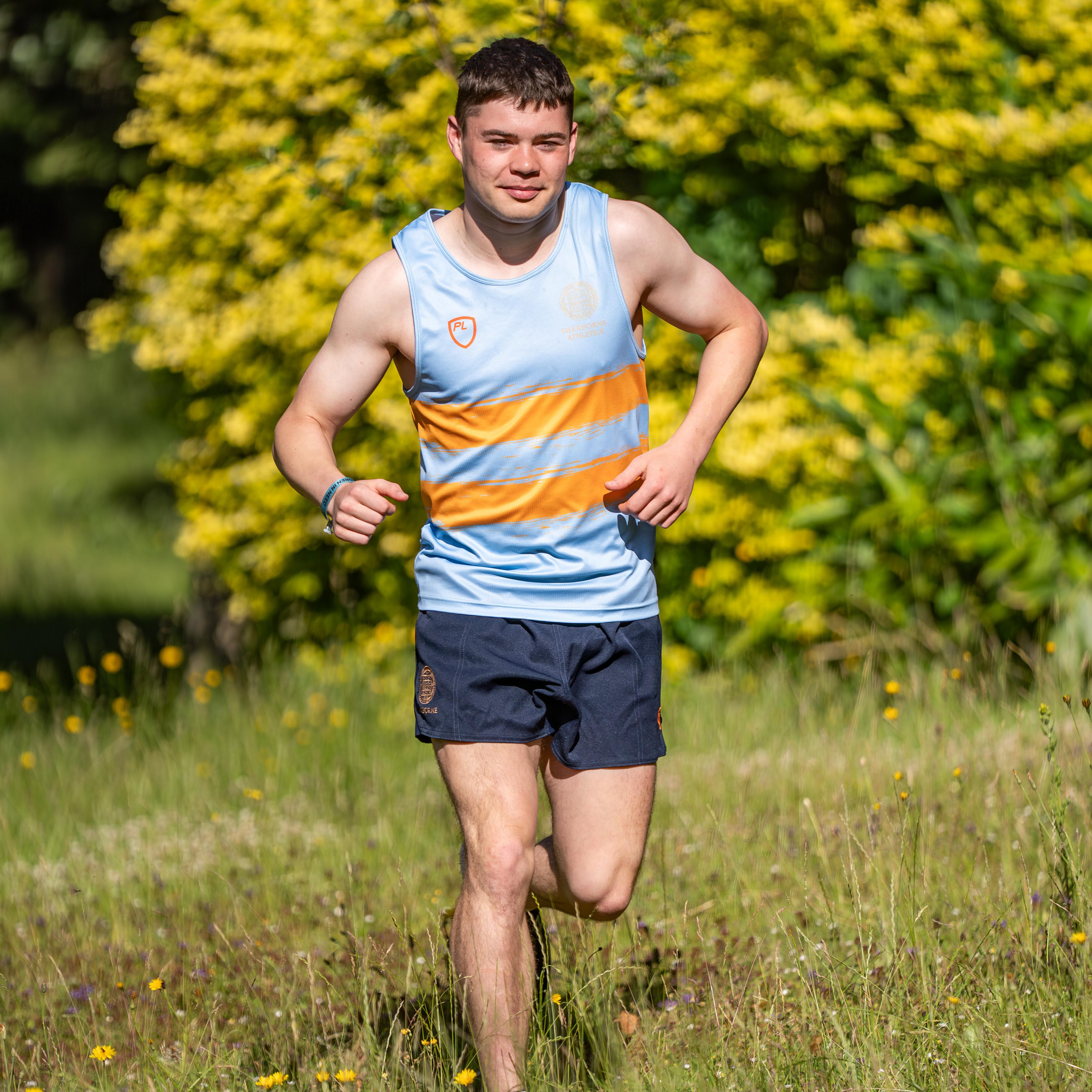
Thomas (Leaver 2025) completed a set of challenges during his time in Sixth Form, in the form of ultramarathons to raise money for BBC Children in Need. He successfully ran 100km in one day, 200km in two days and finally 400km in four days; raising over £8,000.
Sherborne Boys
Abbey Road
Sherborne Dorset DT9 3LF
+44(0)1935 810403
admissions@sherborneboys.group sherborne.org
